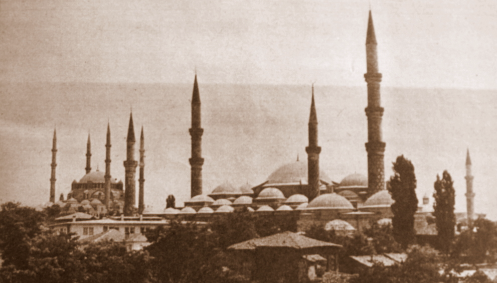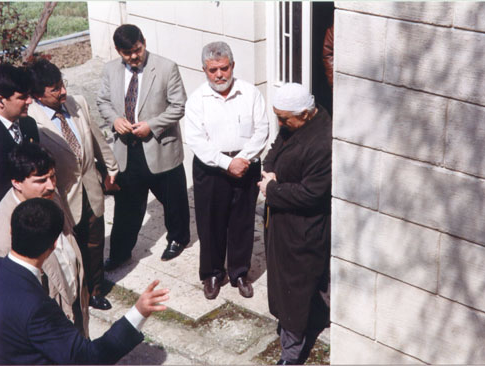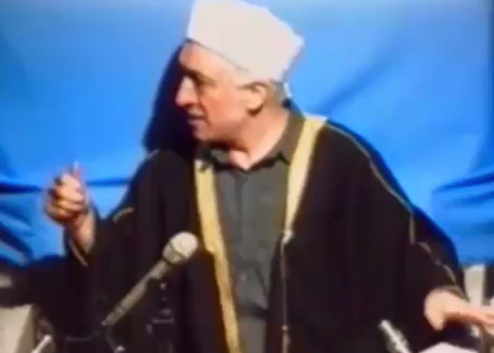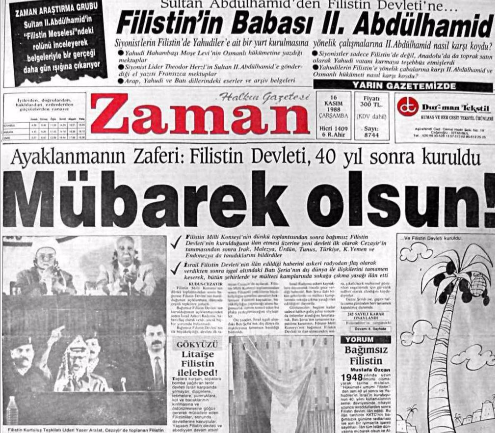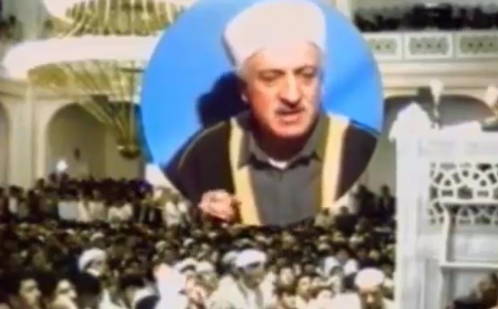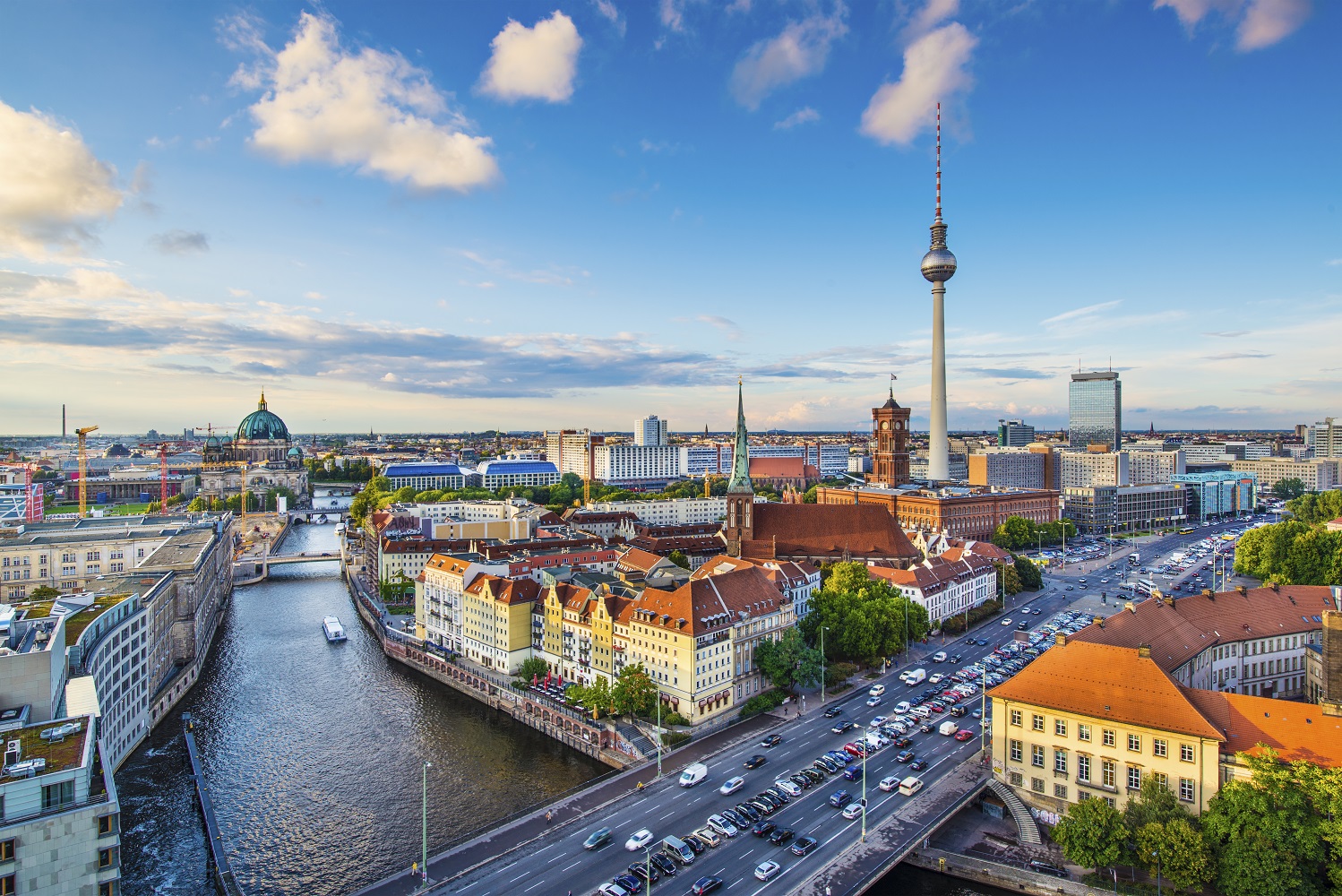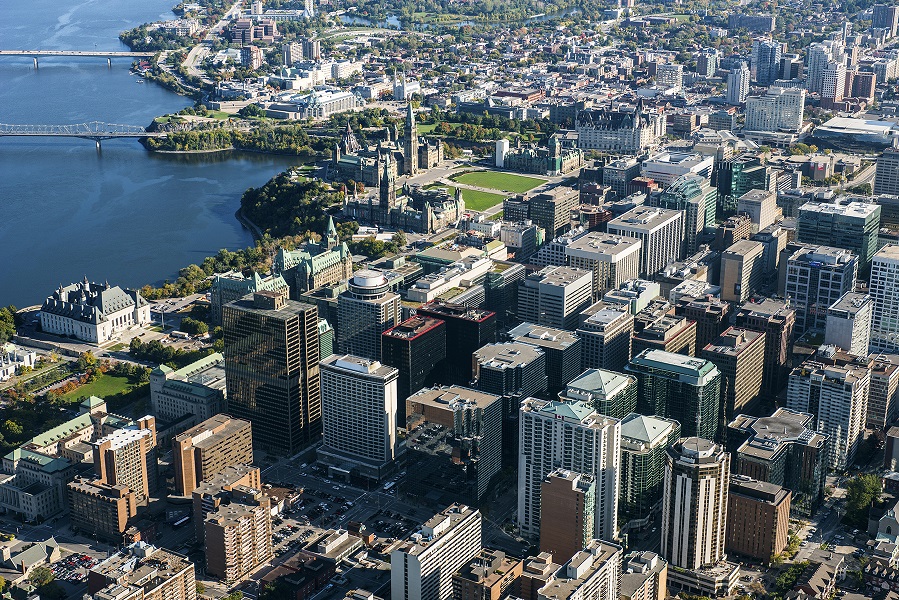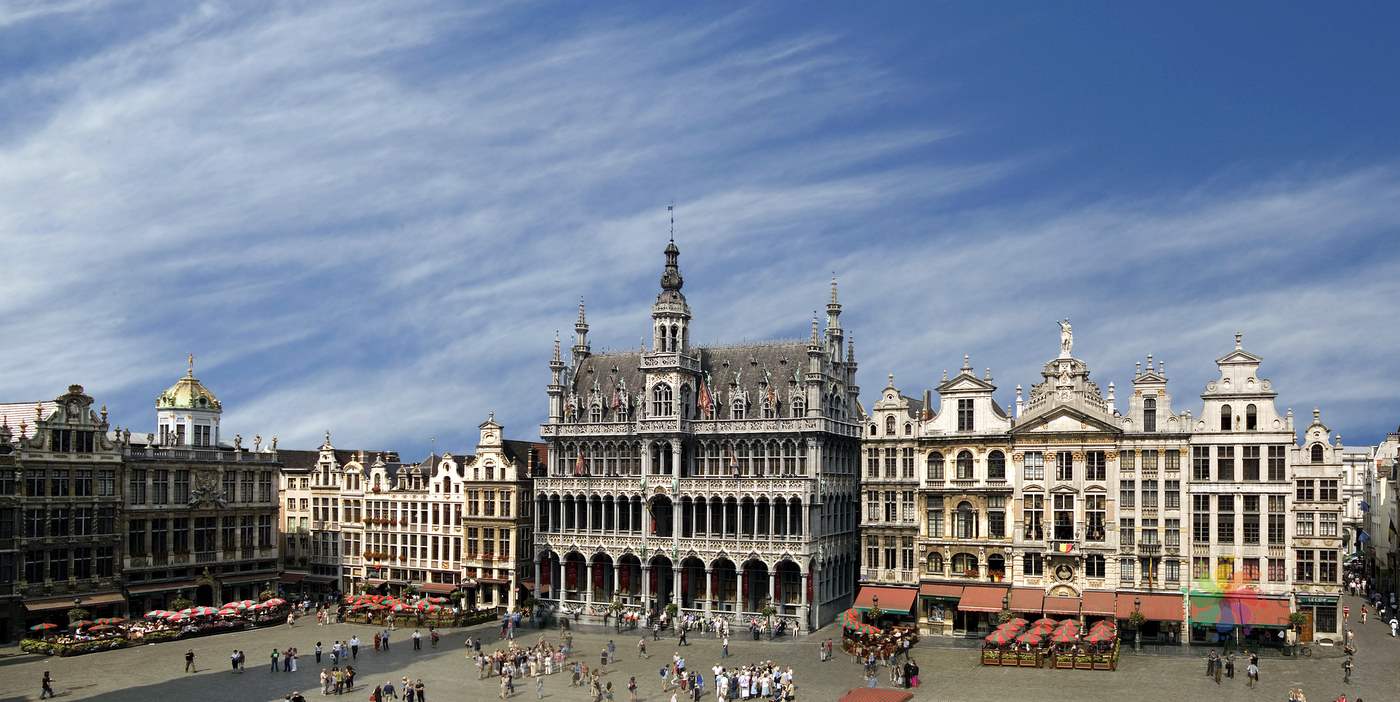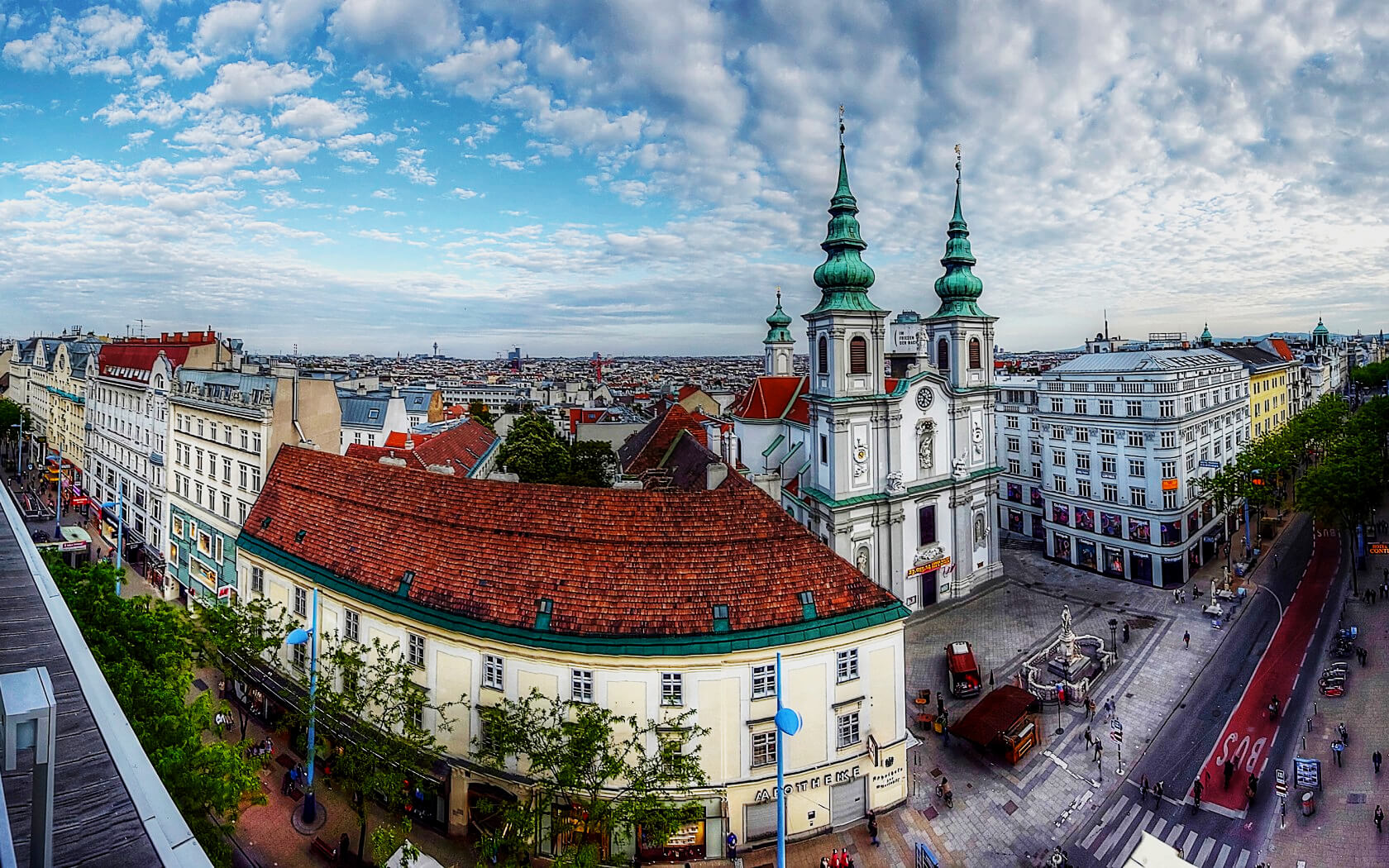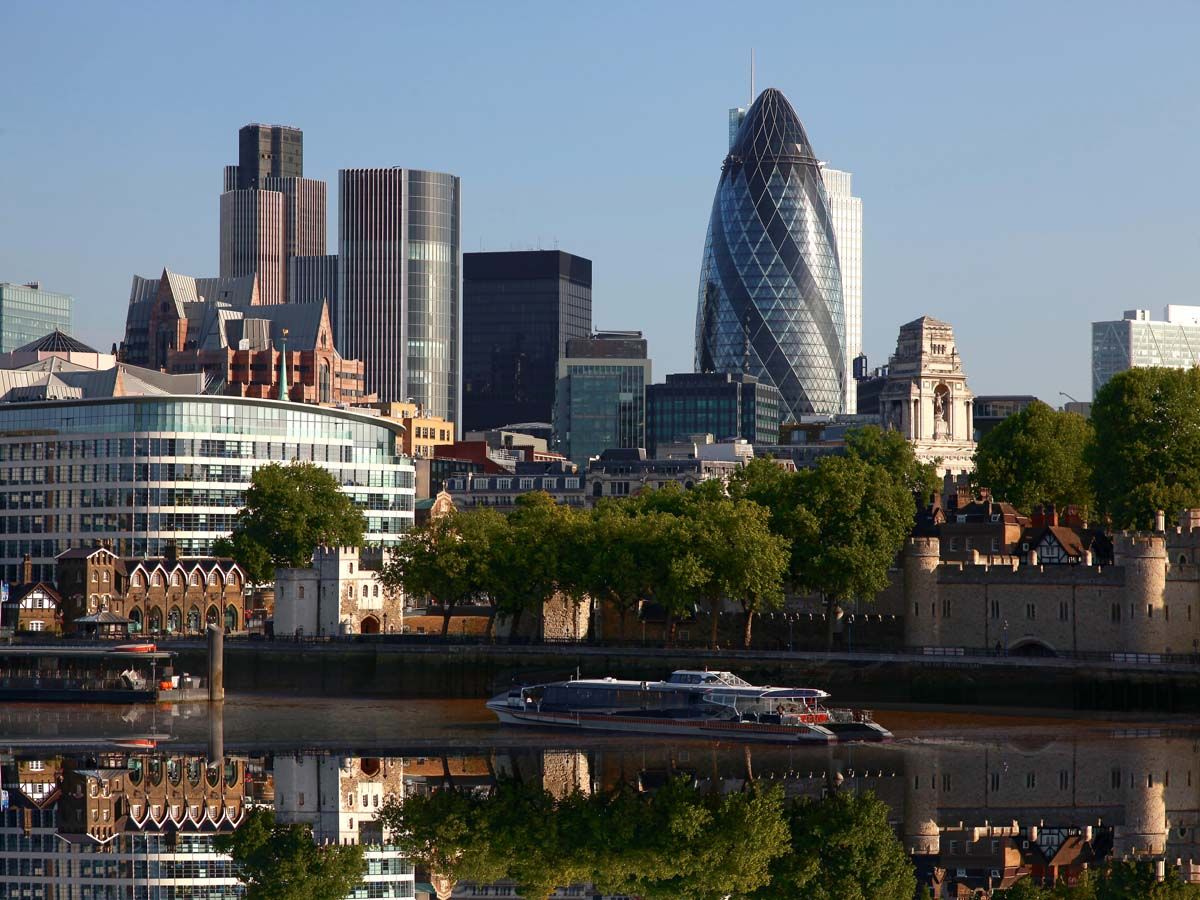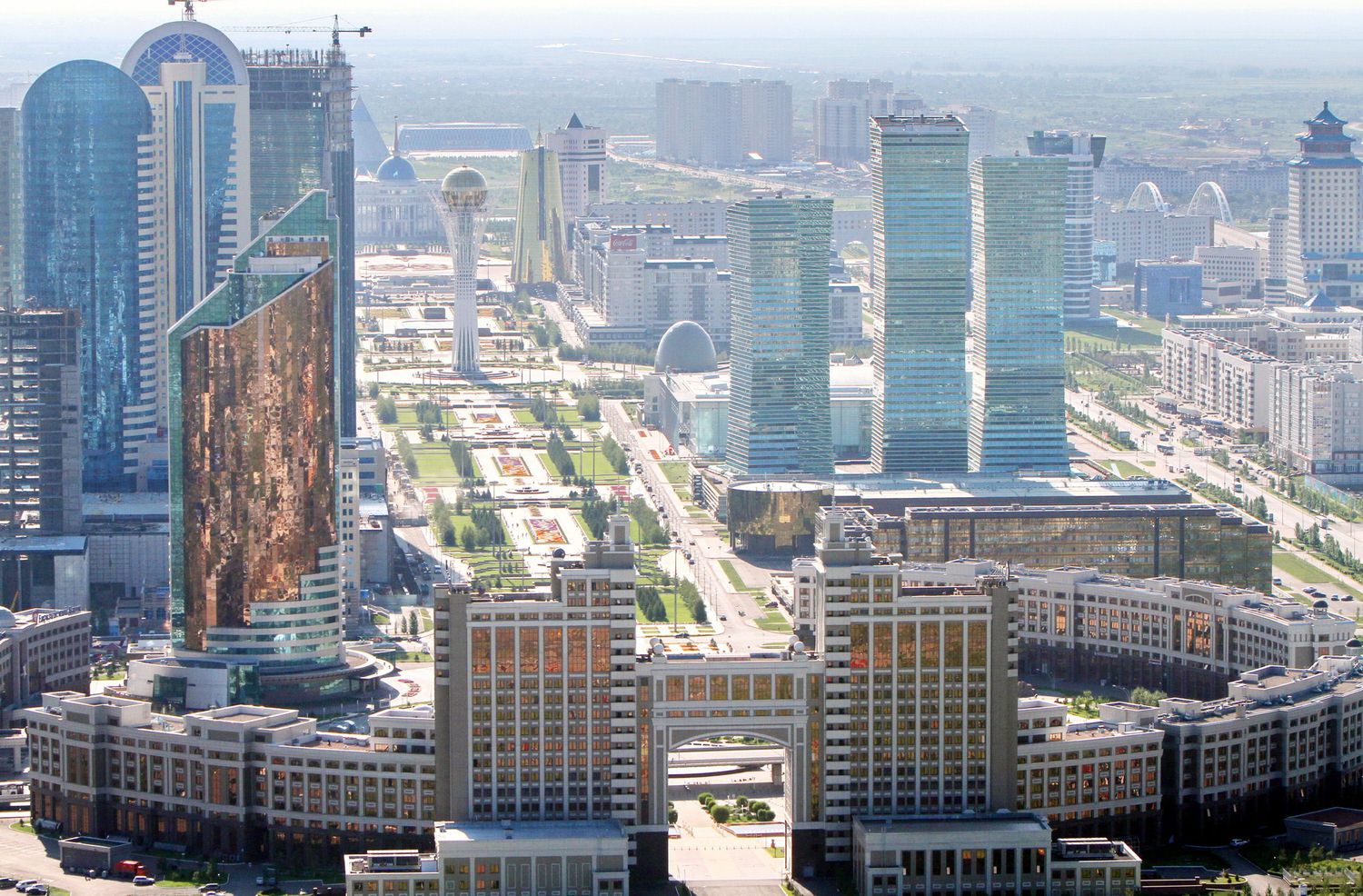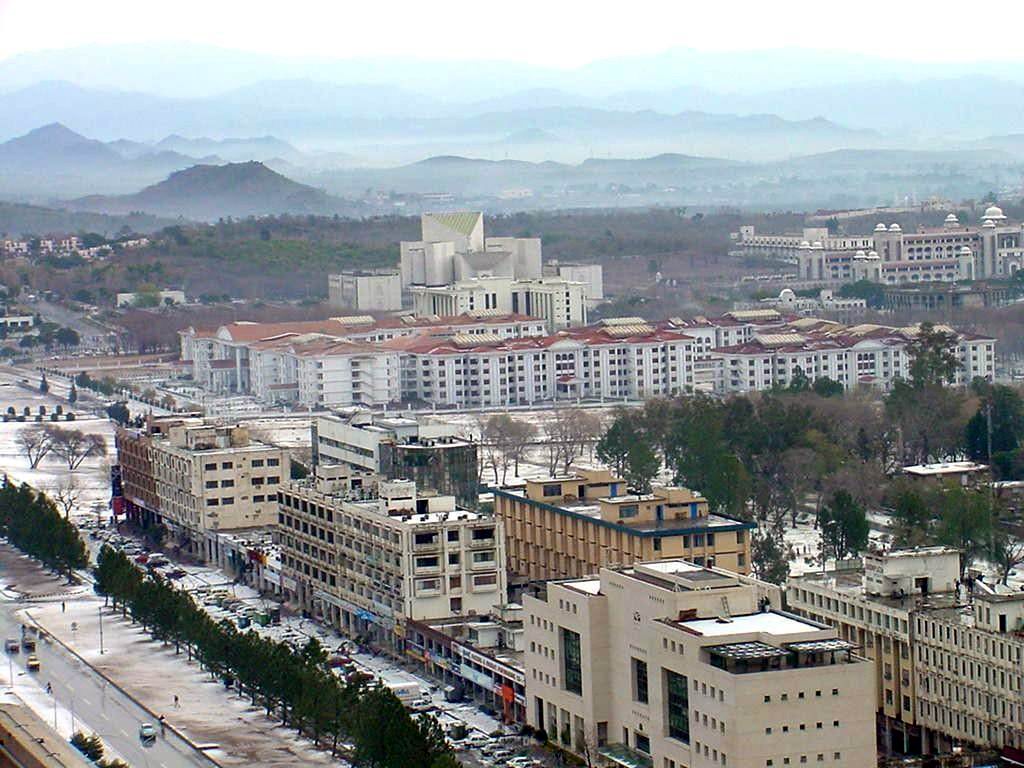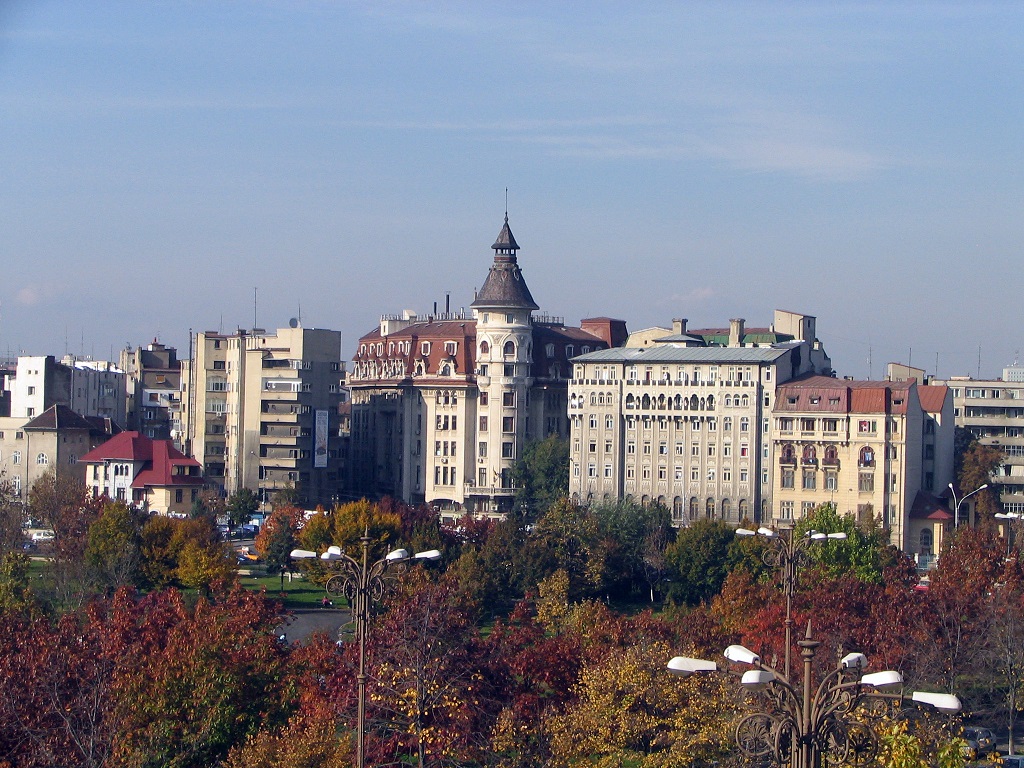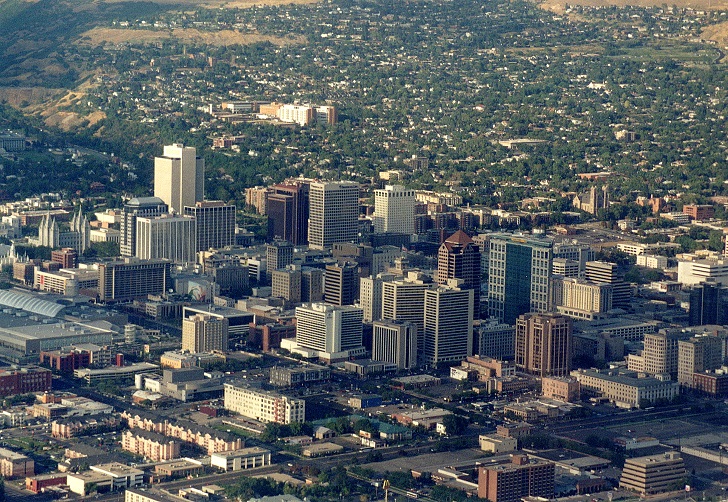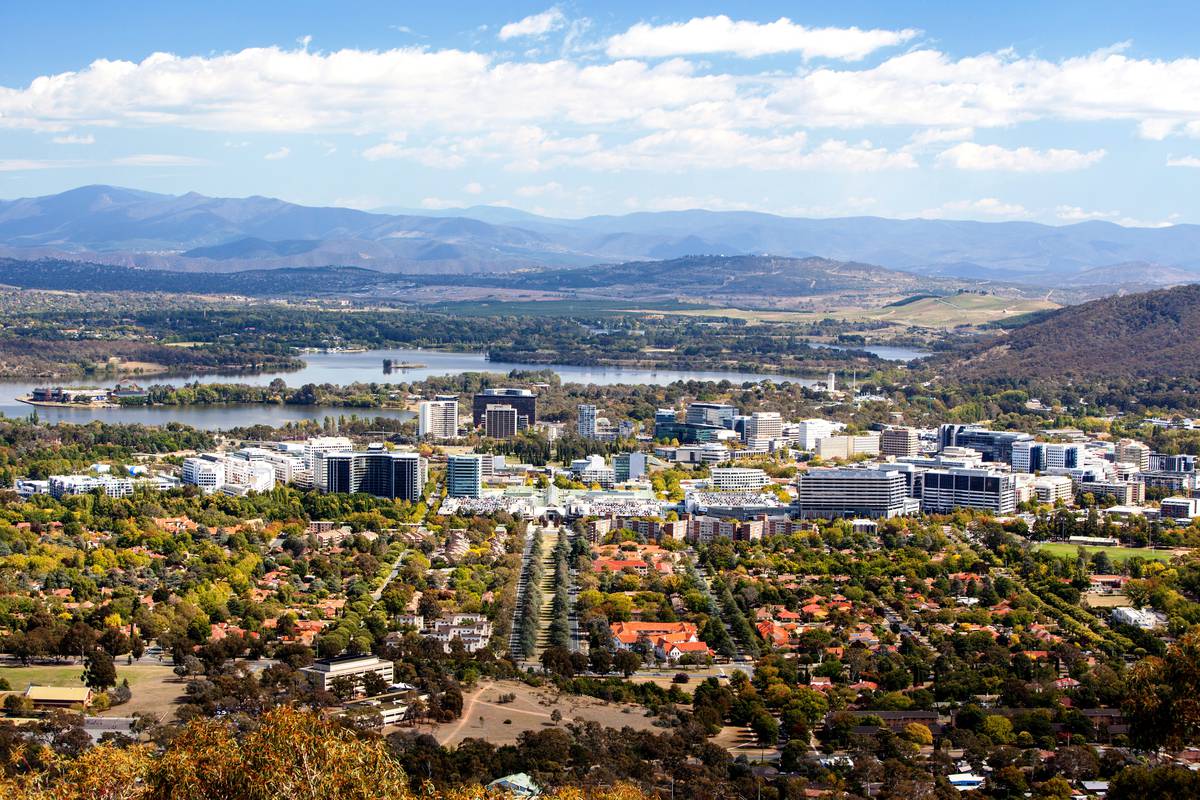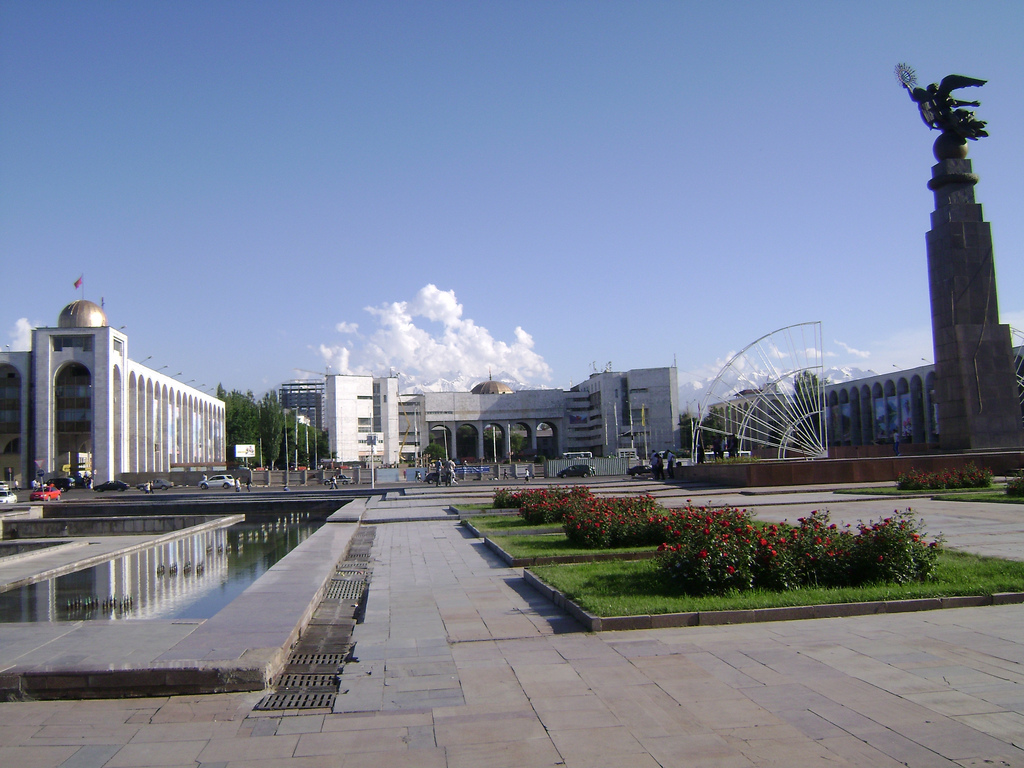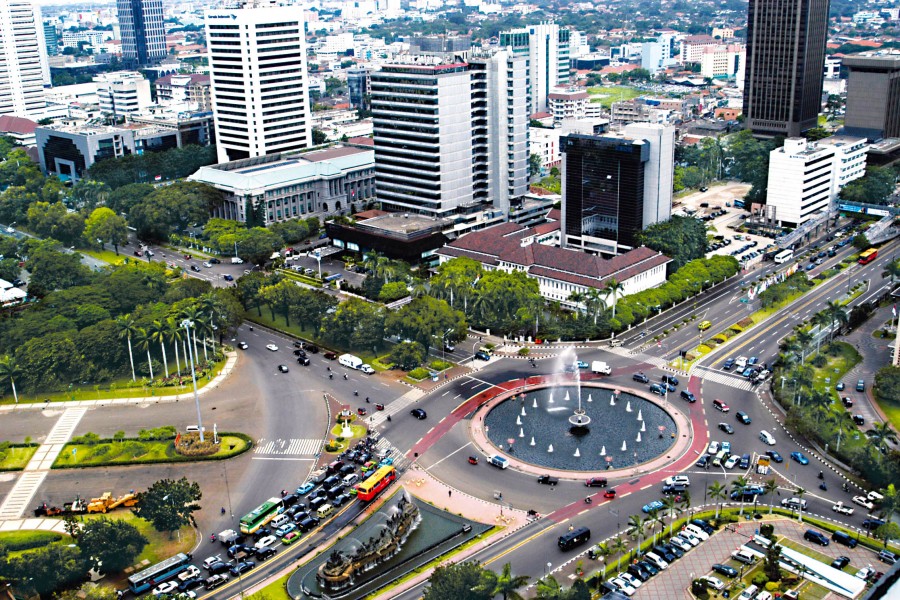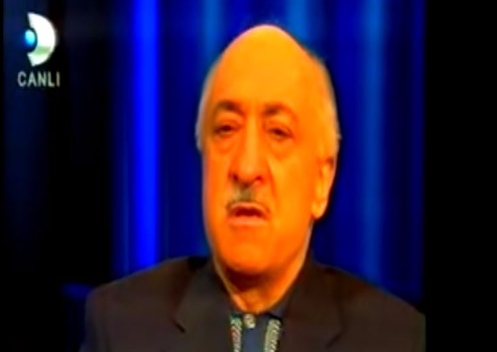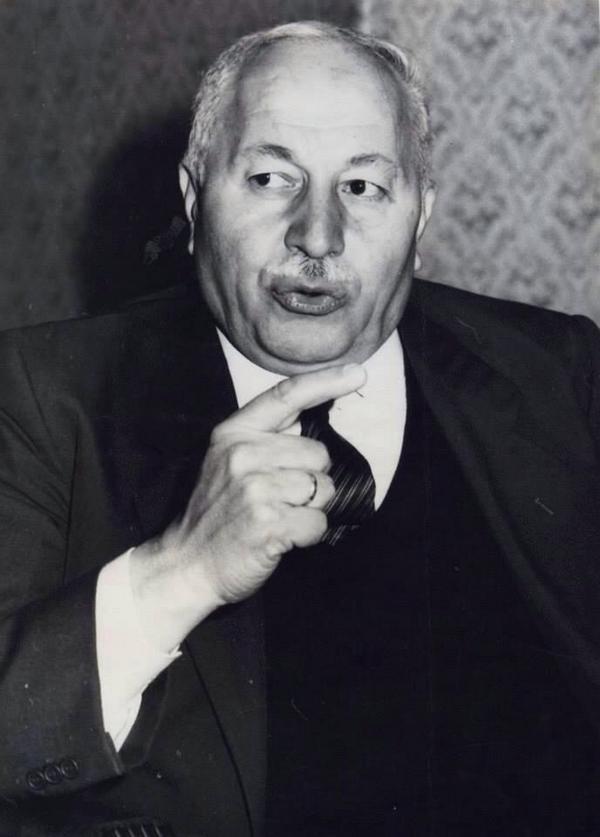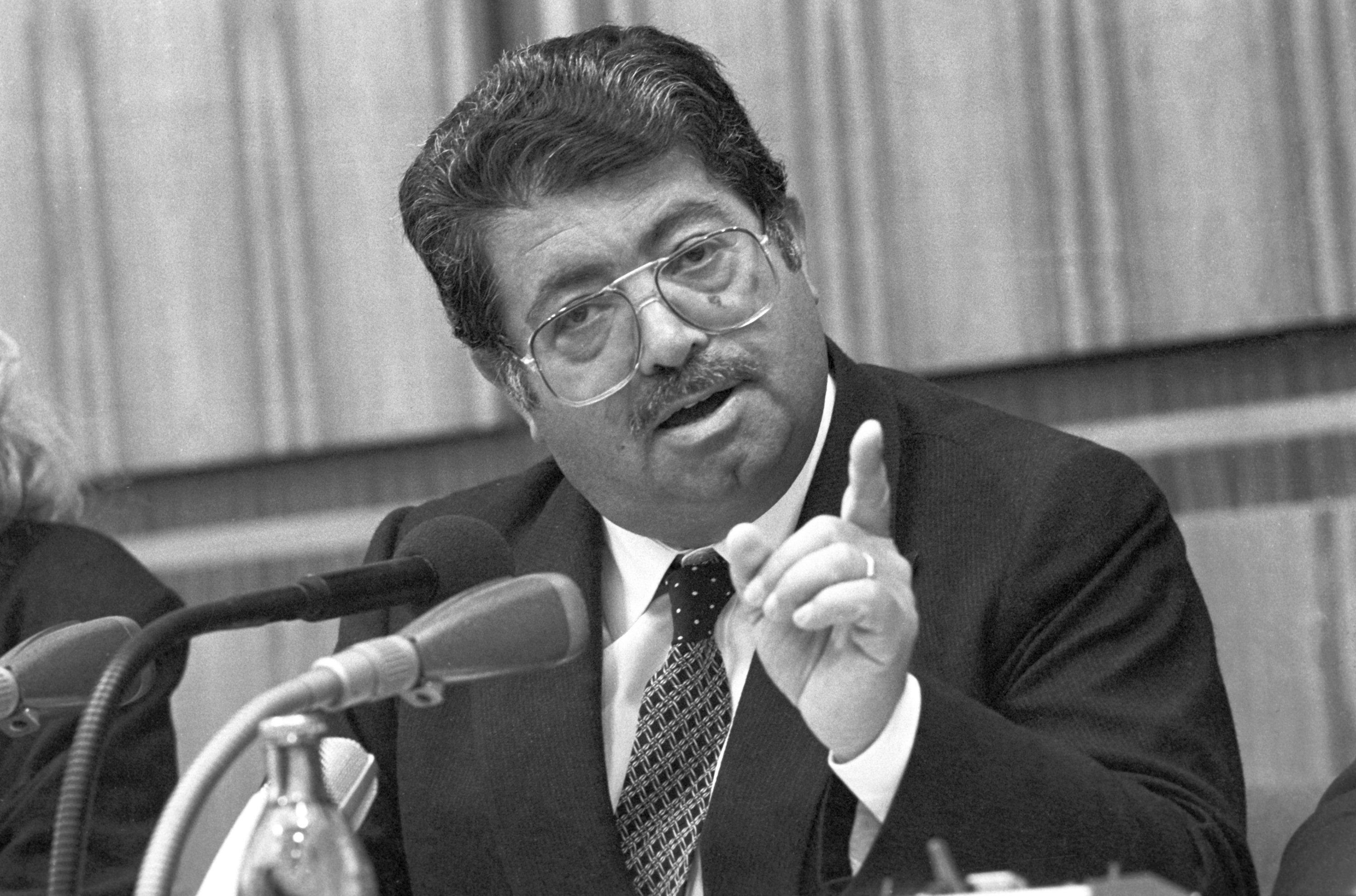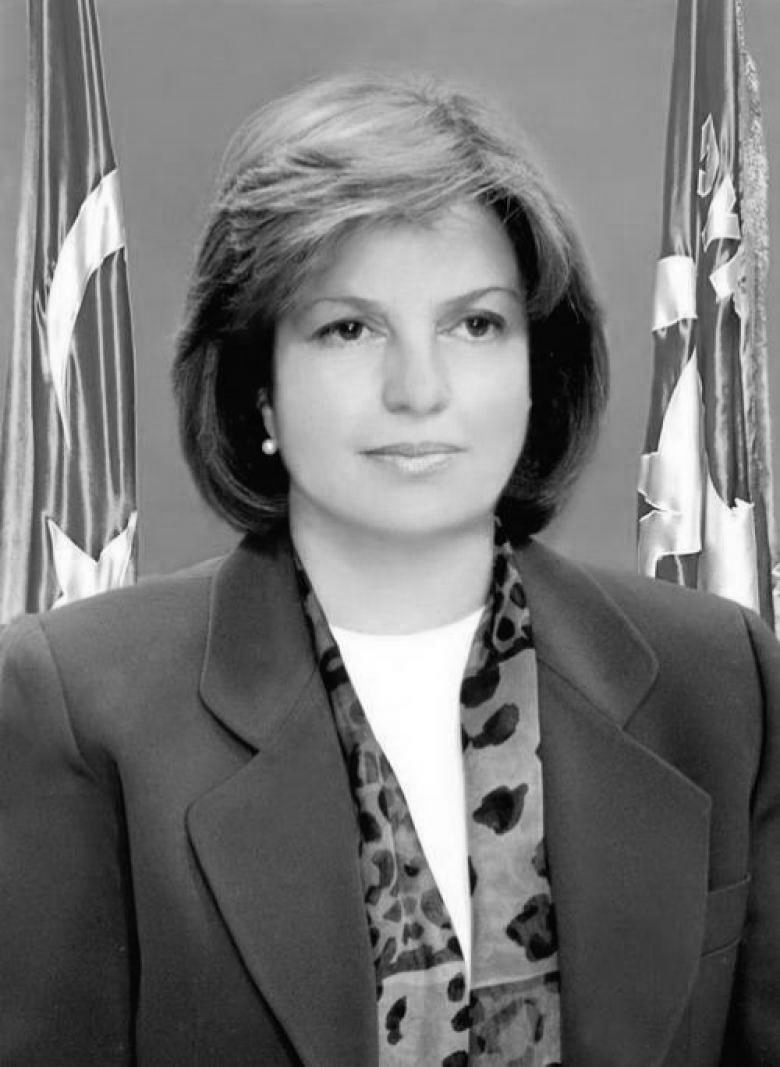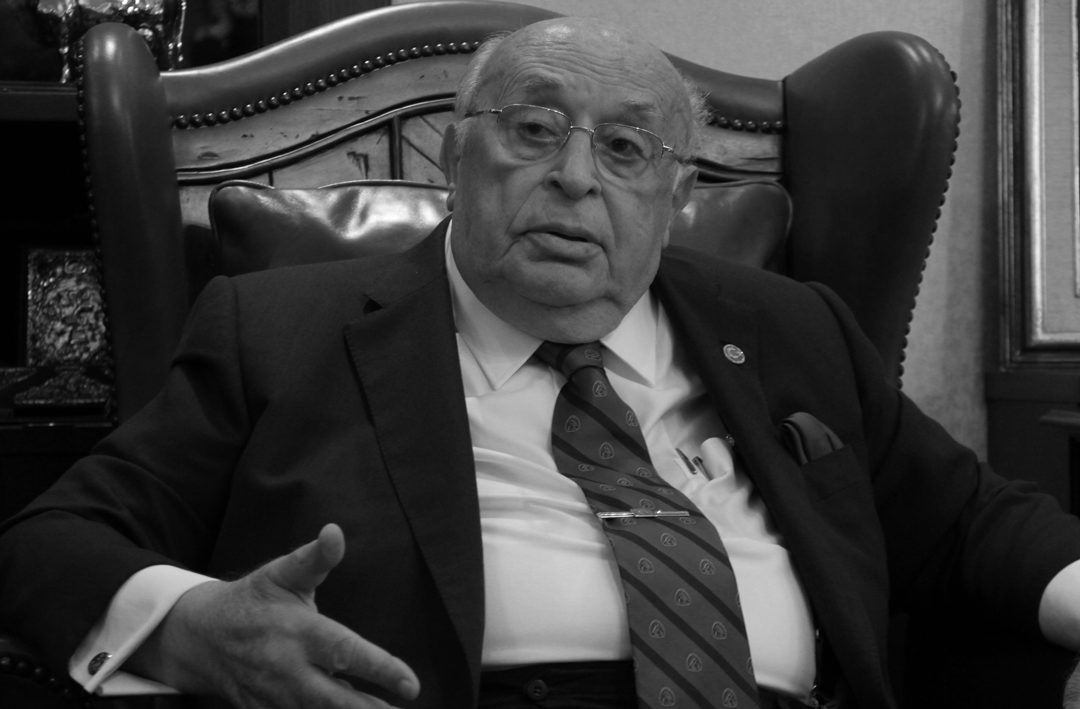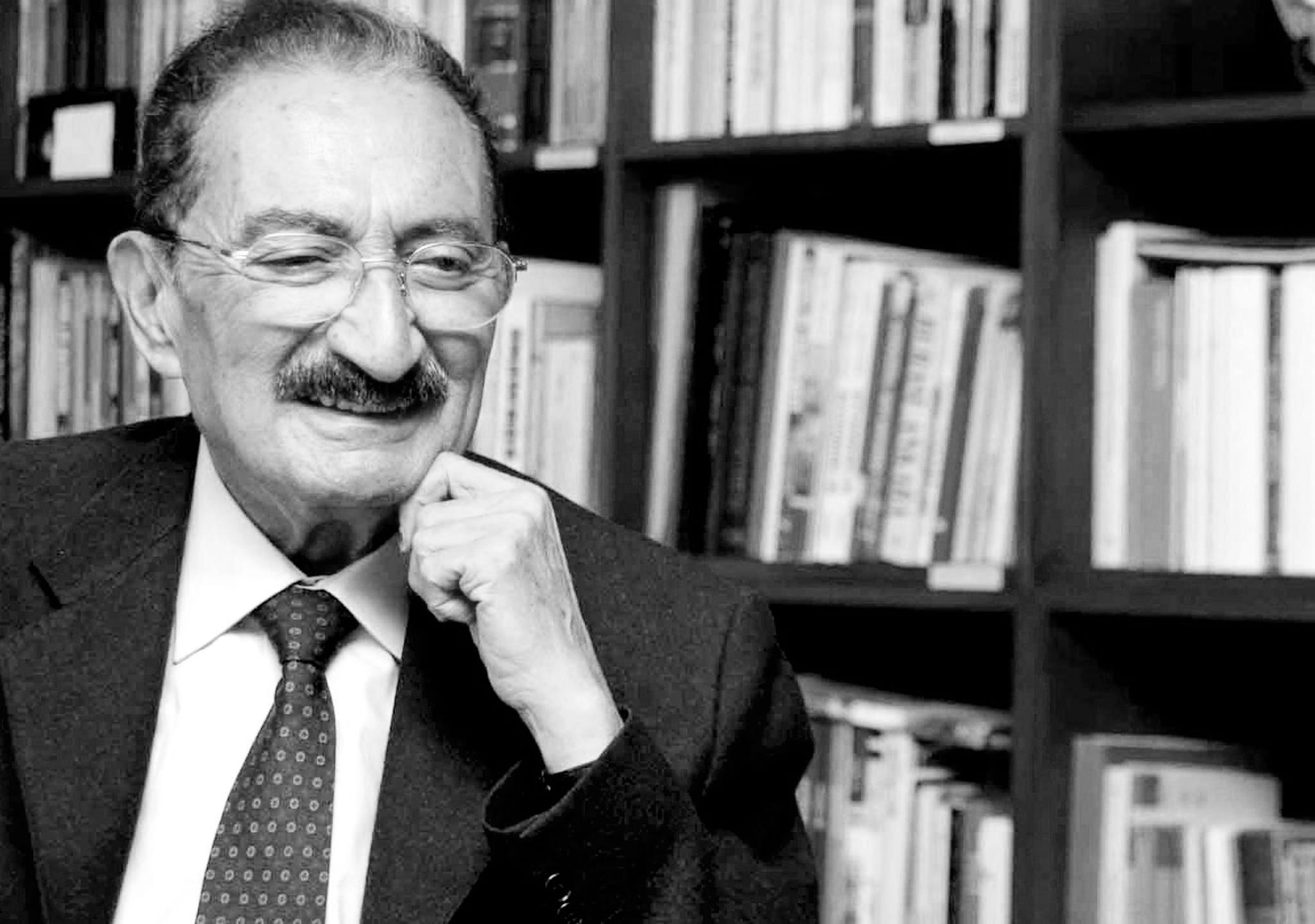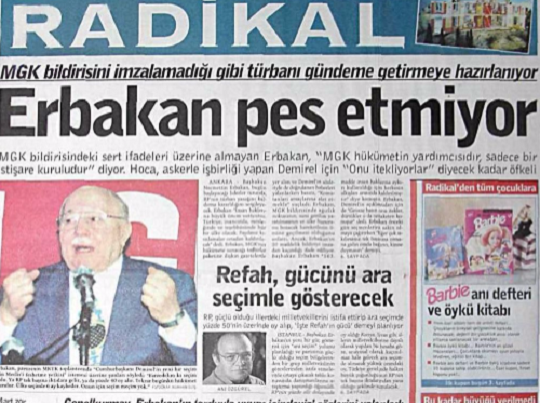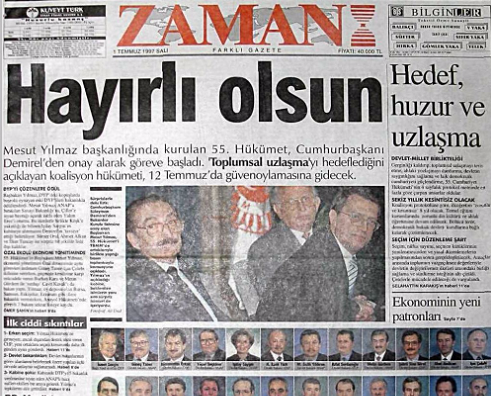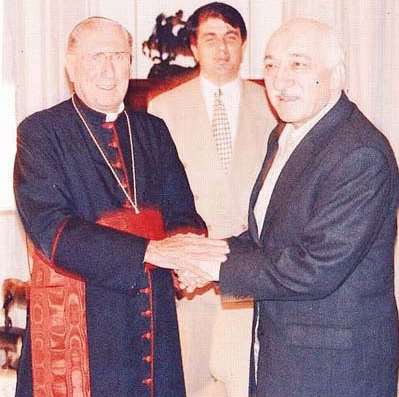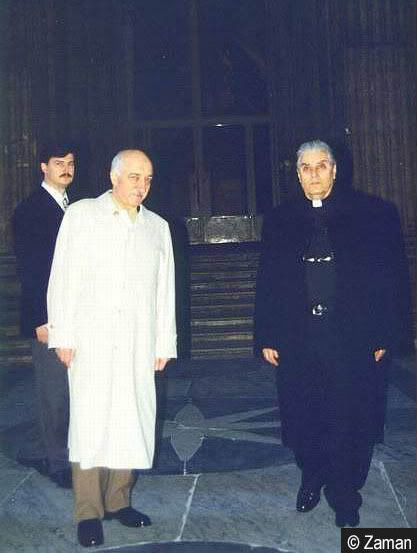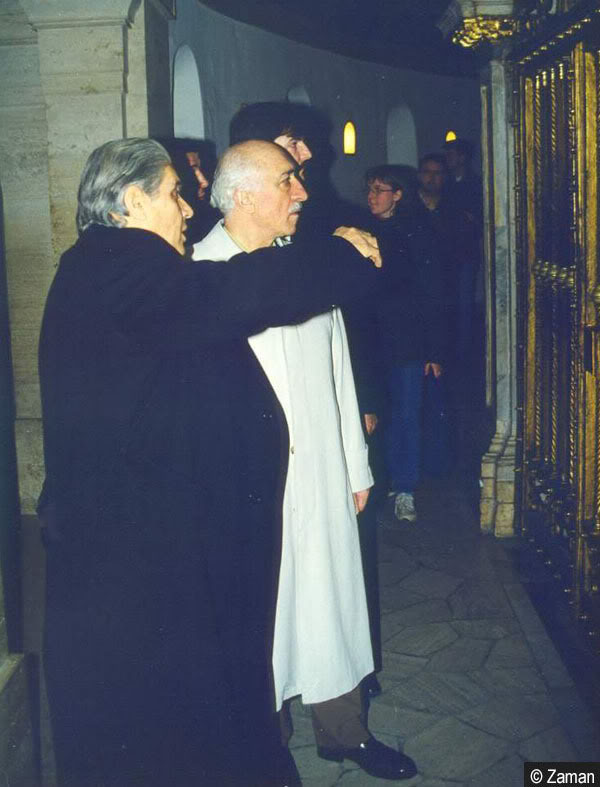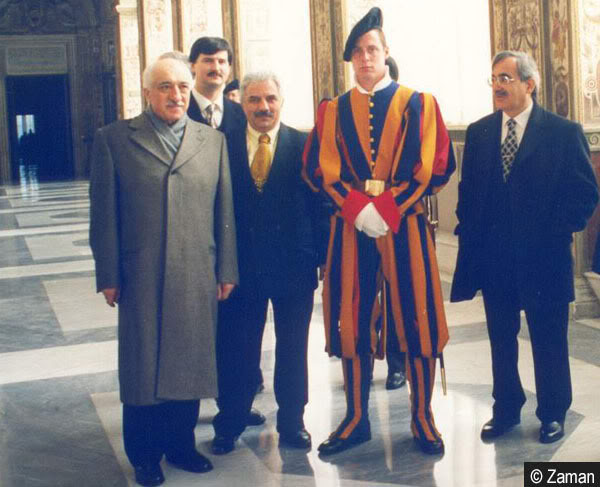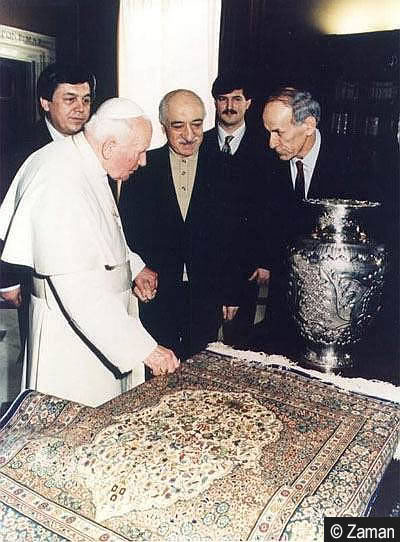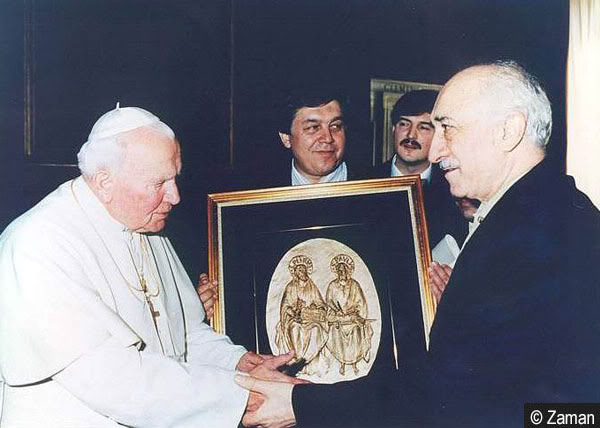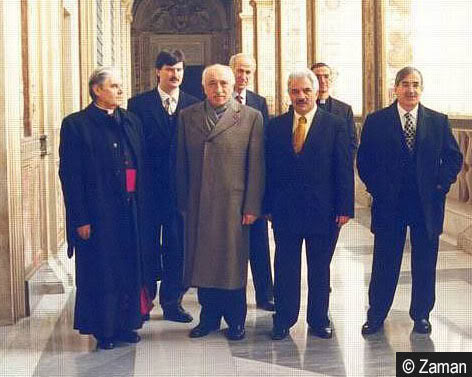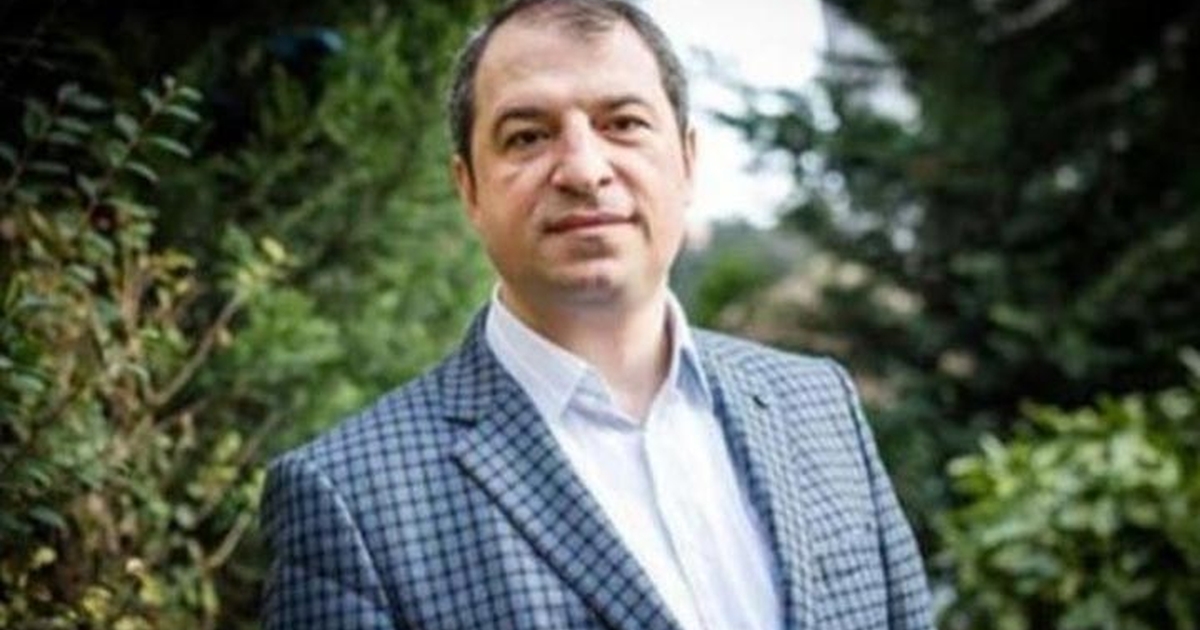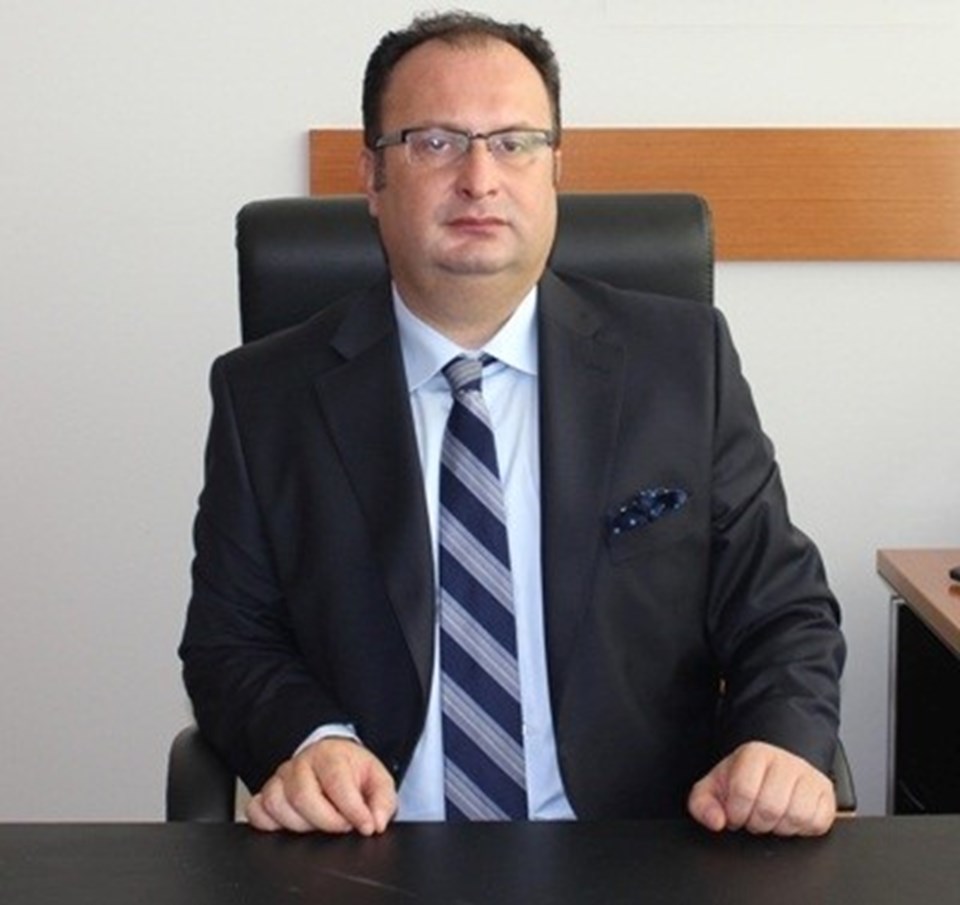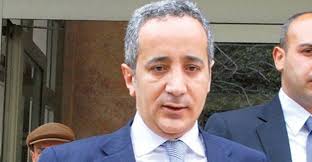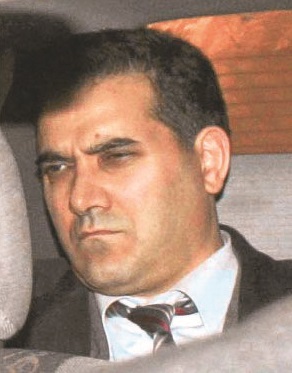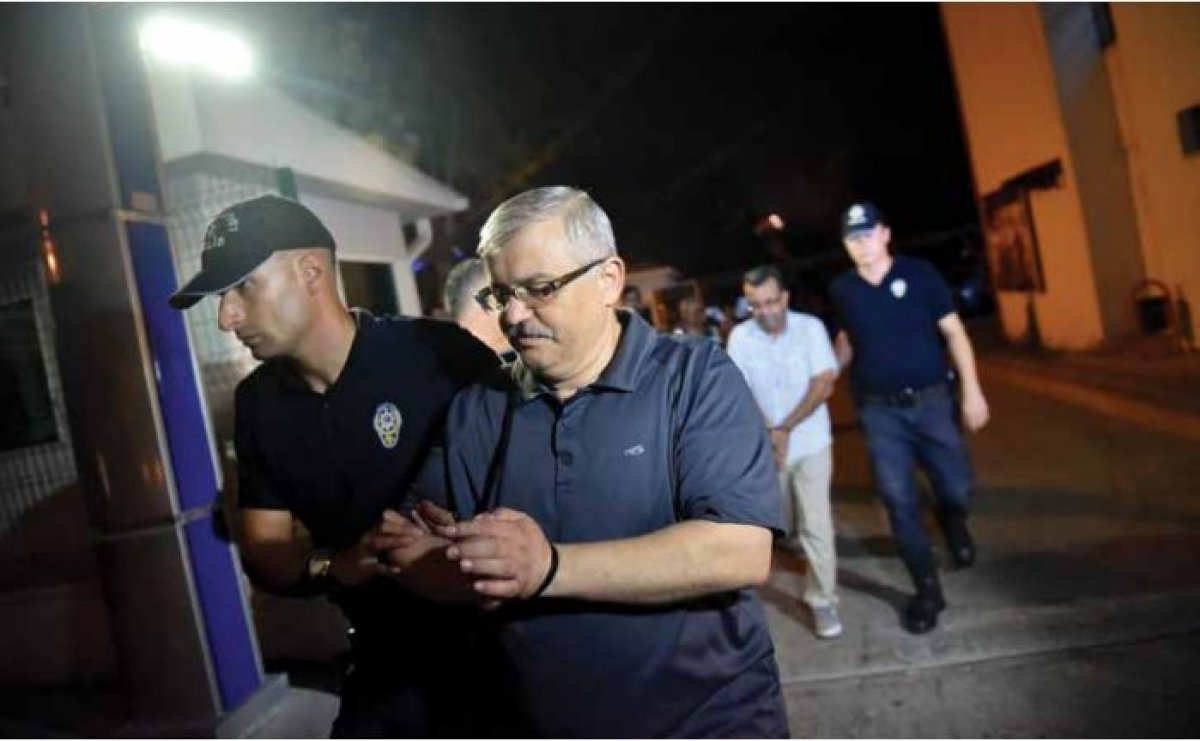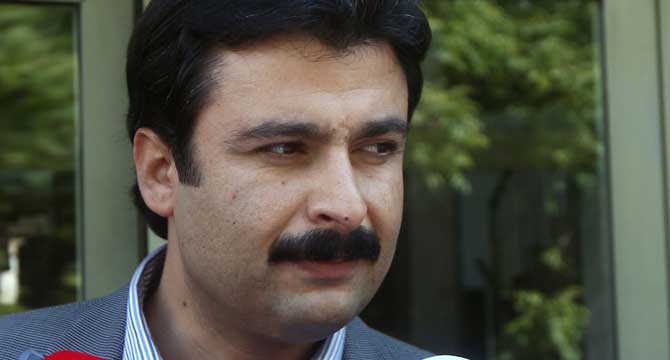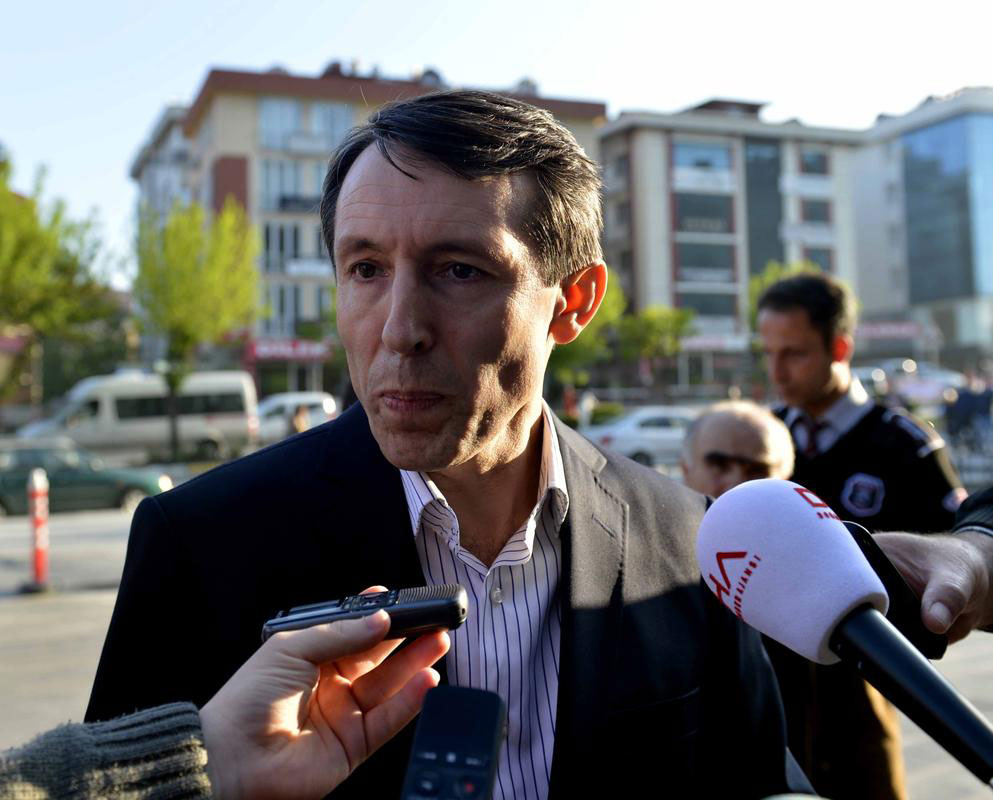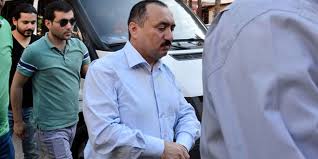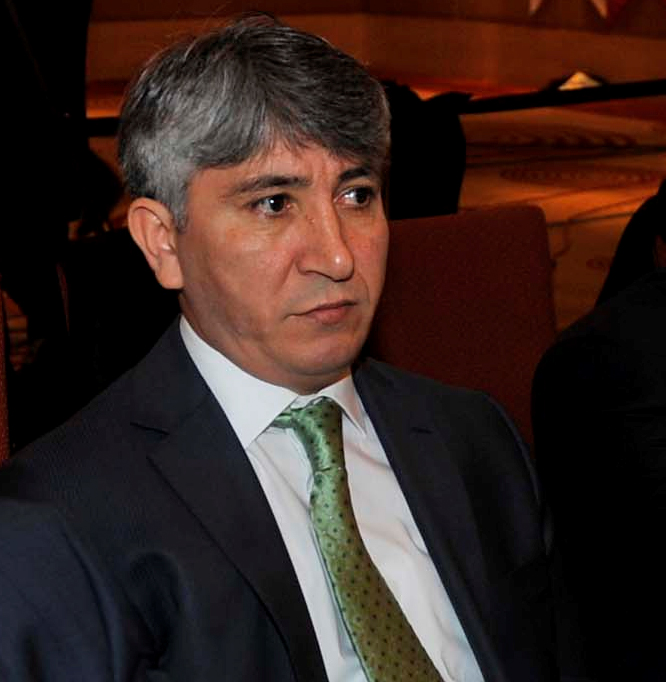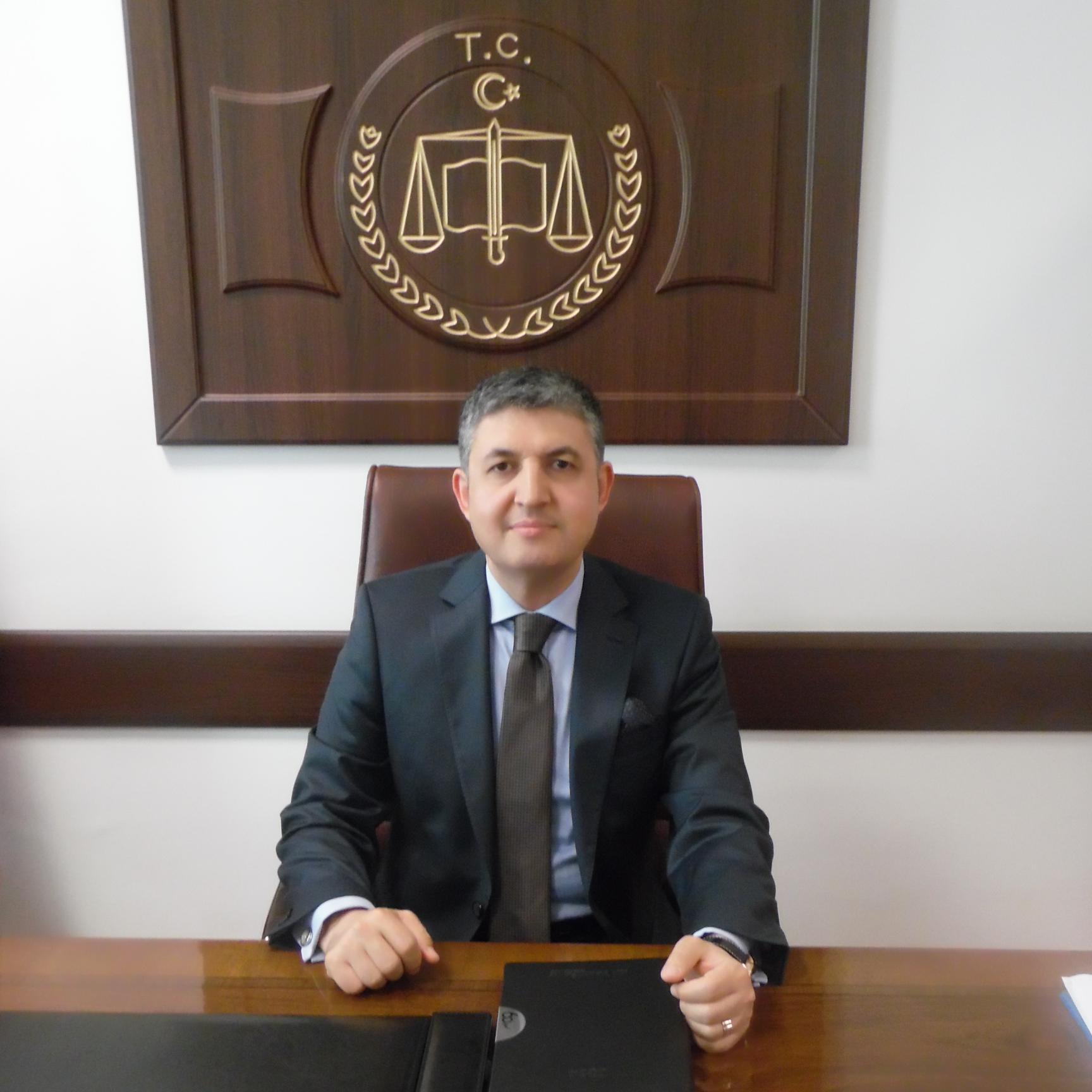
FETÖ's Structure
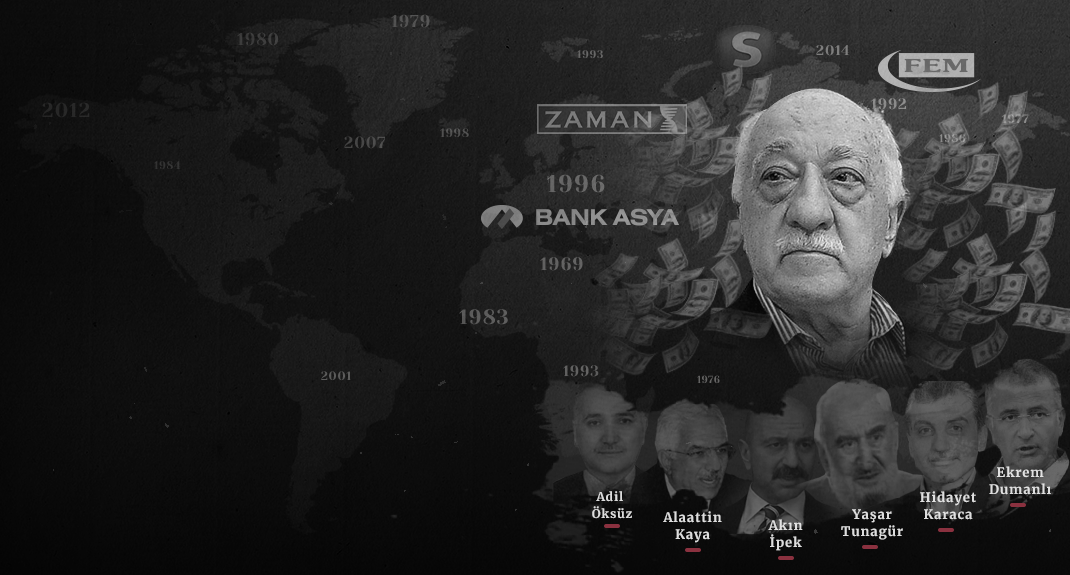
FETÖ’s ontology
FETÖ is officially recognized as a terrorist organization in Turkey that has existed over the past 40 years and whose activities have been carried out using different methods within its framework. Although it appeared to be a 'legitimate community' until the end of 2013, it turned into a terrorist organization, differentiating itself from other groups and communities in Turkey with its activities and policies.
Fetullah Gülen, the leader of FETÖ who has been closely linked to politics since establishing FETÖ, effectively instilled the philosophical foundations of FETÖ with his books, speeches, sermons and discussions. Within this framework, Gülen manages and guides the direction FETÖ takes, his thoughts play a critical role both in Turkey and in the international arena.
Among those who swore allegiance to him, Gülen is seen with the perception of ‘Messiah’
Since the establishment of the organization, it can be seen that FETÖ is a cult focused on its leader. Thus, the instructions given by Gülen were also closed to debate. The terrorist organization that appeared as a religious community owed its presence to Gülen and his leadership. This ‘loyalty to leader’ belief meant that all Gülen’s ideas and goals were accepted as true and had to be upheld. Over time, those who gathered around Gülen and were guided by his ideas began to view him in a different light. Gülen was perceived as a ‘Messiah’ by those who swore allegiance to him. In other words, the role Gülen cut out for himself was accepted by those around him over time and he became seen not as a ‘religious leader’ but more as a ‘messiah.’ The idea that Gülen was an ‘extraordinary person’ was spread through pockets of society and people were convinced that he was a spiritual person/messiah.
The organization began to define itself as a different and superior structure to all other religious communities as a result of Gülen's leadership. They believed that they were also a 'special group' because of their leader, who they believed was an ‘extraordinary person.’ Thus being a member of the organization was seen as a great privilege.
Since the day it was established, FETÖ behaved differently to other religious communities. The organization, which appeared to be involved in legal activities, gradually started to take advantage of the opportunities it had secured to strengthen the organization and achieve its goals.
At this point it is possible to say that the 40 year historical background of the organization is in line with missionary principles. The organization, which has spread to many countries in the world apart from Turkey, has tried to increase its strength with its strategies. FETÖ has gone to great lengths by building close ties within media, politics, education and the business world to establish itself as a powerful force.
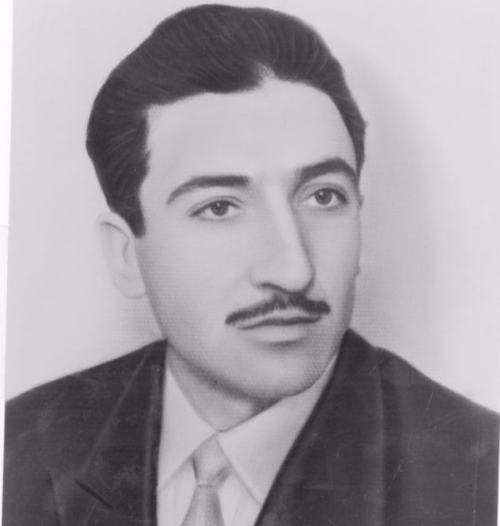
Fetullah Gülen,for many years, tried to show his teachings as part of Islamic sources.
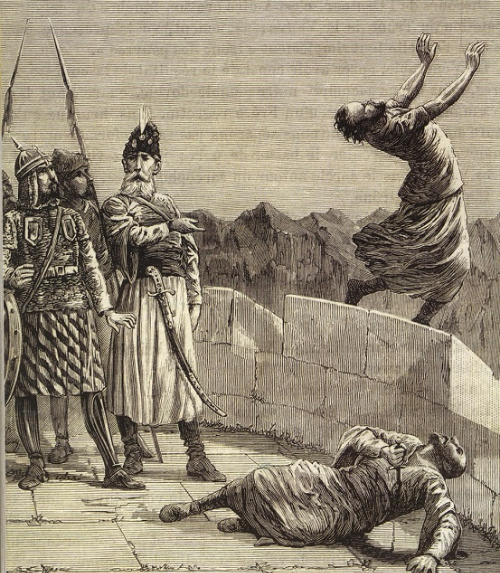
Strategies employed by FETÖ, which are similar to Masonry in terms of organization, resemble the structure established by Hasan Sabbah of the Alamut Fortress. Gülen established a structure for himself through religious exploitation while simultaneously gathering a large support base as a result of intense propaganda activity, like Hasan Sabbah. Hasan Sabbah, who established a bouncer team and organized assassinations to seize the Seljuk state, ensured that his supporters infiltrated the state institutions and important figures. Thus, Sabbah, who had an influential power in hand, eventually had the opportunity to introduce himself as an extraordinary person even as a prophet to those who were loyal to him. Gülen's terrorist organization is similar to the organization of the masons and the 'Hashshashin' organization founded by Hasan Sabbah in terms of infiltration tactics to the state.
However, identifying FETÖ with these two groups/organizations alone may lead to an incomplete analysis. By the end of the 1960s, FETÖ, in an effort to establish an effective structure, resorted to different methods that could be considered new in many ways. For example, the organization was seeking to use illegal means of listening, monitoring and reporting information to leverage itself and enable itself by making threats and blackmailing in order to reach its goals in Turkey. The organization simultaneously infiltrated constitutional institutions, security units, and civilian and judicial structures in an effort to become an effective force by appearing to moderate Islam.
Another structure that is similar to that of FETÖ is today's Moon Tarikah, which emerged in South Korea and whose leaders, like Gülen, have escaped from South Korea to the U.S.A. The structures of the two groups, including financial strategies to collect funds from businesses and especially in terms of trying to become highly active in every country of the world, resemble each other. Both terrorist organizations are in the forefront as organizations that transcend national borders and establish themselves outside of their religious mission. The main theme that constitutes the sub-structure of the vehicles used by both organizations is 'religious discourse'.
From the mid 1960’s, Gülen, began to present a vision of the future through Islamic references, drawing people around him through a religion-centered discourse. Within this frame, he tried to direct people with his own deviant teachings and aimed to make those who belong to the structure he founded, as he wanted, to be totally dependent on his own teachings. While trying to bring Islamic expression to the forefront, he tried to show his teachings as part of the Islamic source, just as Hasan Sabbah did.
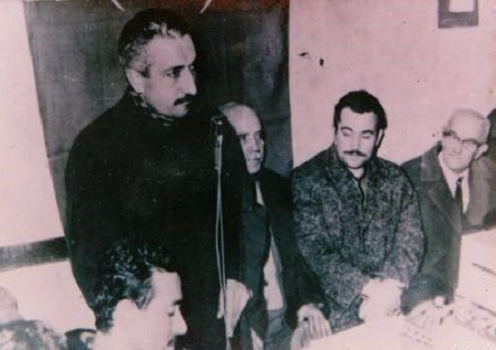
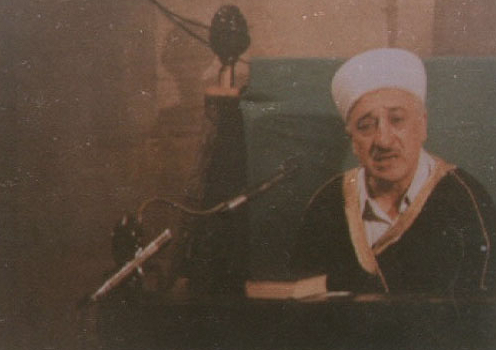
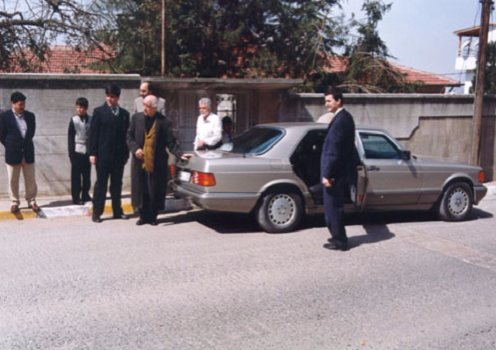
Gülen, who adapted his discourse to the period and policy and politics, also focused on areas with strategic importance. In accordance with the requirements of the period, Gülen established a hierarchical structure in fields such as education, media, business, judiciary, security, military and civil society organizations.
The ‘loyalty to the leader’ myth enabled the goals and outline of the organization set by Gülen achievable.
Having established a multi-layered and complex structure with a hierarchy extending from a wide base to the top, Gülen has gone beyond the forms of organization he refers to. Each group affiliated to FETÖ has a separate hierarchy as well as a separate base. Thus, these terrorists, apart from their duty and areas of responsibility, have built a hierarchical structure within themselves. The people within this hierarchy are evaluated in terms of their characteristics, capacity and loyalties.
Gülen notes that he continued to serve as a preacher at the same time while fulfilling his military service in the conditions of the 1960’s. Both in Ankara and in Iskenderun, he says that he was a preacher in the mosques on the days that he had leave, even though it was forbidden.
Gülen’s secret-filled military service
In order to understand the organization that Fetullah Gülen established, it is necessary to examine the lifestyle and the mission it has put into place. It is important to look at its efforts of its early days to establish itself as an organization up until the latter periods in order to understand the background of the structure that Gülen set up. The book Küçük Dünyam (My Small World), about the life of terrorist leader Gülen is an important text in this regard as it attempts to present the life of Fetullah Gülen in a more mysterious manner.
In certain parts of the book, the author takes care to depict Gülen as a miraculous character and attributes Gülen as an exemplary individual since his early days.
Gülen, who is described as Hocaefendi (Hodja effendi) in accordance with his role as a preacher and missionary, is put forward as an extraordinary character within the book.
In doing so, he attempts to express himself implicitly, rather than directly, and thereby engages in an attempt to convince the other person. For example, in the book, Gülen is asked about himself and his family, "Both families are said to be sayyid [descendants of the Prophet Muhammad]. What do you think?" Gülen’s response is to subtly convince the person across him that he is indeed a sayyid.
Toward the end of the 1950’s, Gülen traveled from Erzurum to Ankara, where he entered the preacher's test with the help of former deputy Mustafa Zeren, and then served as the second preacher at the Üç Şerefeli Mosque in Edirne. Indicating that he was 17 or 18 years old during these periods, Gülen says that he succeeded in the preacher's test and that he had already applied to the Edirne office of the mufti when he was 17 years old but his application was rejected because he had not fulfilled his military service.
Gülen served in the military after working in Edirne for two and a half years. Gülen, who carried out his first period of military service in Mamak, Ankara, was therefore in Ankara during the military coup that took place in 1960. The most important anecdote recounted by Gülen about Talat Aydemir's coup attempt during this period is quite interesting. He says that in order to prevent Talat Aydemir, a plan was made to bomb government institutions with warplanes and Mamak was to be bombed from the air. This bears striking similarity to the July 15 coup attempt.
Gülen states that despite the fact that Diyarbakir came out in the draw for his appointment to a new position after his post in Ankara in the military service, his commanders pulled another draw and he was finally appointed Iskenderun. According to the information recounted in the book, Gülen expresses that he wanted to stay at the General Staff but he was not able to achieve this goal.
While in Erzurum, one of the most important actions was to establish the ‘Association for the Struggle against Communisism.’
Gülen's thoughts on the soldiers and state officials are also surprising. He says that while he was in Edirne, he was a close associate of prosecutors and judges who were working in the county, especially in Edirne. Although it seems very unusual for a 20-year-old in the conditions of that period, Gülen expresses that he experienced similar situations in both Mamak and Iskenderun, and that he was consistently meeting with senior officials. The military service Gülen fulfilled in İskenderun was a source of great educatıon for the terrorist organization he would later go on to establish. Once the posts were assigned, Gülen carried out the rest of his military service in a radio and monitoring center. He attributes his interest in intelligence studies to this time.
While Gülen was fulfilling his military service in the 1960’s, he also continued to serve as a preacher in mosques. He states he served as a preacher on his day’s off-duty in both Ankara and Iskenderun, even though he was forbidden from doing so. Considering the circumstances that arose after the 1960 coup, it can be said his situation was beyond what a 20-year-old religious officer could generally accomplish on his/her own.
Fetullah Gülen, who is full of contradictions, received permission to travel to Erzurum while fulfilling his military service in İskenderun and continued to preach in mosques even though he had not completed his military service. Gülen also extended his leave from military service for two months. After going to Erzurum, Gülen joined Halkevi, or the People's Houses, in the city, and was elected as a member of its council soon after. One of Gülen’s most notable actions during the years he was in Erzurum was to establish the "Association for the Struggle against Communism".
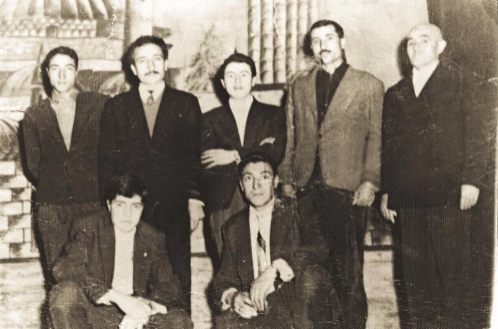
While on military leave, Gülen said that he served both as a so-called "religious officer" and also had a role within a civil society organization. Gülen then returned to Iskenderun to complete the rest of his military service, and this time he preached in the city's mosques with a one-week delay. It is one of the contradictions in Gülen's own story that he continued to preach at the Iskenderun Central Mosque after the surrender to the Union. Gülen summarizes this period with the words: "There were always people who protected me." Gülen, who does share much information about who or what structures protected him, was discharged from military service one month early.
The road and rise to chaplaincy
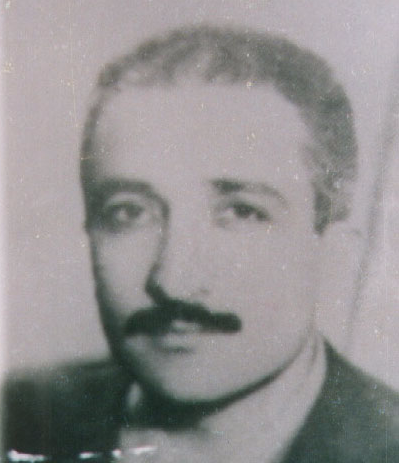
The so-called 'preacher' Gülen, who first allegedly returned to Erzurum and then to Edirne after his military service, became a popular name in a short time as a result of his sermon. He served as an honorary preacher at the Dar-ül Hadis Mosque and started to teach students for the first time. After a while, people adversely reacted and lawsuits were filed in Edirne and his preaching license was revoked. Edirne Governor at the time Ferid Kubat, forbade his work and stated that Gülen was acting against the law. Gülen then fled from Edirne and went to Kırklareli, he began to preach at mosques there. He also reached out to the Nur movement.
Gülen was introduced to the Nur movement thanks to Mehmet Kırkıncı Hodja, Osman Demirci Hodja (former Justice Party deputy) and Mustafa Aslan in Erzurum. Through the speeches he made in mosques in Edirne and Kirklareli between 1963-66, he became more visible in the conservative segment of society and transformed into a respected name. Although Gülen appeared to be working with the Nur community during this period, terrorist ringleader Gülen tried to distance himself from them and spread his own heretical teachings. Although this attitude gradually turned into a crisis with the Nur community, Gülen took care not to oppose them during his ascension phase.
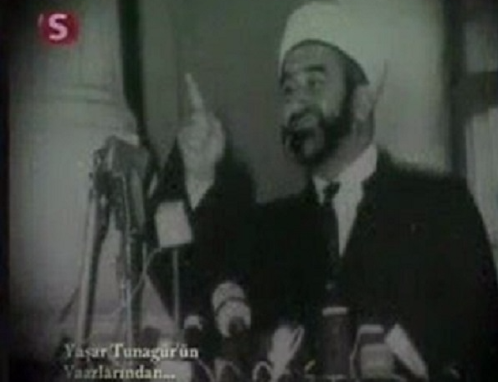
Later, with the support of Yaşar Tunagür, who was brought to the Vice-Presidency of Religious Affairs in a controversial manner, Gülen was appointed as the preacher of the Bornova Mosque in Izmir. [The matter of a 20-year-old preacher being protected and promoted by the Vice-President of Religious Affairs needs to be investigated.] Gülen continued to take steps in İzmir in accordance with his goals and grew in popularity. While continuing to move with some groups within the Nur community, on the other hand he tried to accumulate supporters.

Gülen started to open houses together with Mustafa Birlik and Mehmet Metin, who are his close acquaintances, and did not allow the houses to be connected to the Nur Community. In this way he established the foundations of the 'Light Houses'. Gülen also began to build ‘Gülenism’ or ‘Gülenist’ structures to gather those around him. His sermons and the widespread distribution of his tapes in many towns enabled his dangerous and heretic ideas to spread further and reach more people while simultaneously generating more money for the organization. Though this method elicited great reactions from some circles, names such as Kemal Erimez, Nurettin Gene, Mustafa Birlik, İlhan İşbilen, Cahit Tuzcu, Bekir Akgün and Mustafa Asutay stood beside Gülen.
The structure in the center of the organization that Gülen places most importance on is undoubtedly the Light Houses. The houses serve as points of recruiting young and educated people. In the words of Gülen himself, the aim of the houses is to sow the seeds of and raise the ‘Golden Generation
“Cavalry of Light” and the Akyazılı Foundation
Fetullah Gülen transformed into an effective name when he was in Izmir thanks to his sermons, in Kestanepazarı. He started to become more recognizable in İzmir and the Aegean region within a short time. Gülen started to establish houses linked to the organization in the provinces of Izmir, Manisa and Balikesir.
The young people who remained in these houses called ‘Light Houses’ were faced with Gülen's various methods. The ‘Fetullahçı’ organization established by Gülen gained prominence during this period.
According to Hulsi Turgut's ‘Fetullah Gülen and Schools’ article series, Gülen approached his immediate circle with the proposal "Yes to Quran courses and Imam Hatip schools, but we should open the best college," and they accepted these proposals. The parallel structure started to develop and become active in the provinces of Izmir, Manisa and Balikesir, and received financial support from local shopkeepers, tradesmen and factory
owners. Among the names that provided financial support to Gülen was Ali Naili Erdem, one of the Justice Party officials. İzmir was made the center of the parallel structure that Gülen wanted to establish.
By 1972, the parallel structure designed by Gülen began to strengthen even more and the Akyazılı Foundation was established. The Foundation was trying to get university students to stay at ‘Light Houses.’ The foundation soon turned into a center where students trained in secondary and tertiary education came and received scholarships. Thanks to the donations received from across the province, the structure and foundation have grown even more. The most important sources of income were aid and sacrifice made from tradesmen and merchants.
During this period, Gülen established ‘Ovey Preparatory Schools’ under the umbrella of the Akyazılı Foundation. This enabled the parallel structure to rapidly spread across all provinces of Turkey.
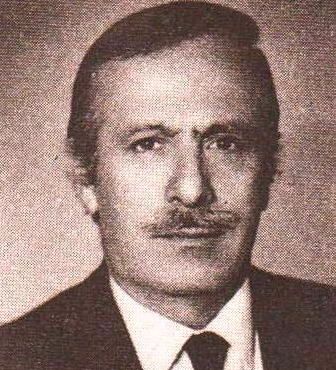
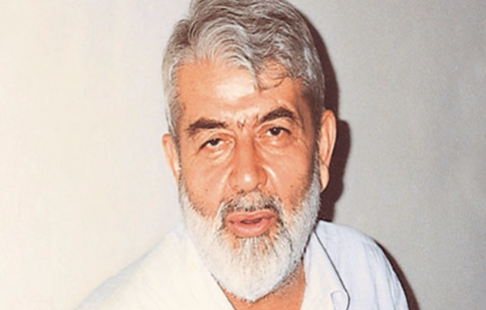
At the center of the structure Gülen established is undoubtedly the Light Houses. The houses serve as points of recruiting young and educated people. In the words of Gülen himself, the aim of the houses is to sow the seeds for the rise of the ‘Golden Generation.’(link) The houses were supposedly a place where “the youth could live their religion.” Those who stayed at the houses had to listen to ringleader Gülen’s cassettes, watch his videos and read his books. Students who were smart and successful in their studies were particularly chosen and militarized in these houses, which were described as ‘a beneficial cause.’ The organization’s short, intermediate and long-term plans were implemented through these houses. The ‘Light Houses’ were the most effective method of raising traitors of the state. In this way, those who were educated from a young age were made to serve the goals of the organization and identified as the ‘Golden Generation.’
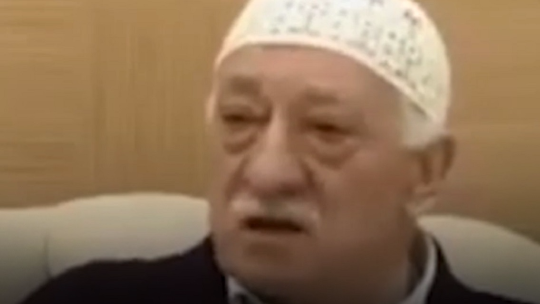
Educated and talented youth were raised and trained as traitors of the state, so Light Houses were of utmost importance for Gülen.
Students staying in Light Houses had limited access to the media. In this way, while the students staying in the houses were being recruited, the foundations of a structure where members were obedient and absolutely loyal were being laid. The people in this structure were asked to exhibit a full commitment to the organizational responsibilities as they were referred to as 'brother' and had certain duties. Since 1972, 'camps' were organized for the students staying in the houses. Gülen was imagining a new social order based on the parallel structure he established.
The actualization of this was thanks to the 'educated' generation trained with his heretical teachings.Toward the end of the 1970’s, Gülen intensified his efforts to strengthen the parallel structure. He started to push forward his deviant goals not only through the Light Houses but also at mosques. Gülen put ‘education’ at the forefront in an attempt to trap the youth.
FETÖ’s trivets
Sızıntı-Zaman and Samanyolu Broadcasting Groups
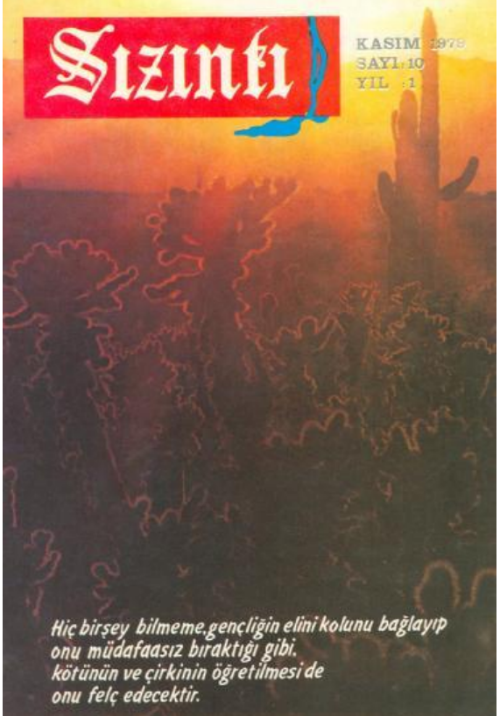
Gülen, who allegedly opened the Light Houses and the Akyazılı Foundation to help and educate students, went to the media right after this phase. In 1979, one of the organization’s most important publications, the Sızıntı magazine, was released. Gülen had the opportunity to directly guide the parallel structure and convey his distorted ideas to widespread masses through this magazine. With the Sızıntı magazine, the organization focused on religious and spiritual work while also putting Gülen in the center of their teachings.
The magazine, which published Gülen’s work as well as those close to him, soon turned into an acknowledged publication by the conservative group. In this way, Gülen, expanded the base of the organization he established while simultaneously spreading his teachings to other segments of society. The Sızıntı magazine was one of the most important sources taught to students staying in the Light Houses. After the 1980 coup, many magazines and newspapers were put under huge pressure and closed down. Gülen gave open support to the coup with the editorials titled "Soldier" and "Last Police Station" and argued that the soldier was a savior. The picture that emerged after September 12 was one that opened the way for Gülen and his parallel structure to strengthen even more.
Gülen and the 1980 coup
Fetullah Gülen, who left his post seven days before the military coup on September 5, 1980 with a doctor report, said he learned from people who were close to high-ranking soldiers a day before that there was going to be a coup. After the September 12 military coup d'état, the putschists targeted political figures, the business world, the media, religious communities and political parties indiscriminately. With the coup, the Grand National Assembly of Turkey (TBMM) was dissolved and all political parties were shut down. Soldiers enforced a strict tutelage period. While many different communities, including political parties, suffered great damage because of the coup. Despite this, Gülen and his parallel structure continued to strengthen and started to take up roles in official state positions. Although ‘wanted’ banners were posted about Gülen, he was not caught for six years and continued to carry out his activities during this period.
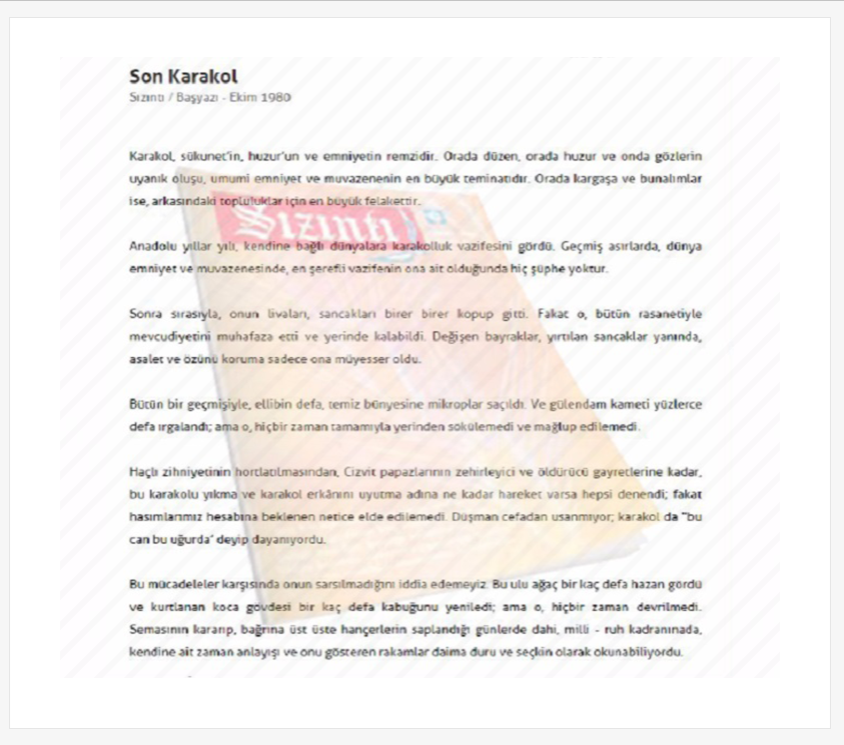
Gülen published an article in the Sızınti magazine, which was linked to his organization, very quickly in the early days of the coup. In his article titled “Soldier and the Last Police Station,” Gülen sanctifies the coup soldiers and says that they arrived just in time. “… And now, with a thousand hopes and happiness, what we see as a new birth after a century of waiting, this last resurrection, the existence of the last police station and its lasting survival; at the point where our hope extinguishes, greetings to the soldiers who came to our rescue just like Khidr.” (October 1, 1980, Sızıntı Magazine)
According to Gülen, if the soldiers had not come, "As a nation, there would have been nothing we could do other than cry in aguish." The Gülenists regarded the new environment that emerged after the coup as a great opportunity for them. For their so-called teacher Gülen, it was time to put the plan into action easily. Gülen, spreading over a wide area through the ‘Akyazılı Foundation’ by taking advantage of the conditions brought on by September 12, further strengthened the organization he established based on betrayal.
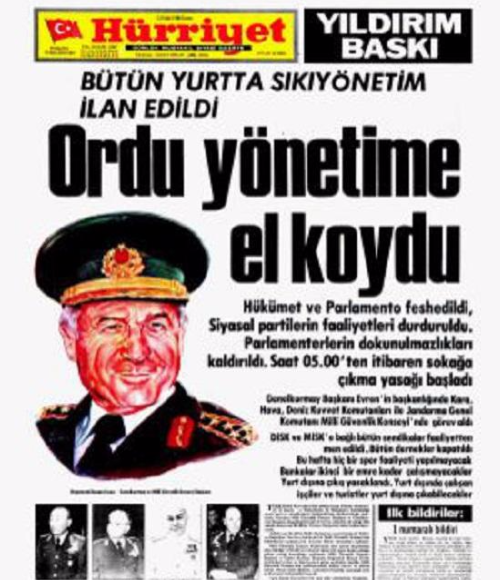
Gülen takeover of Zaman newspaper
Gülen took control of the Zaman newspaper, which was founded by İhsan Arslan and Alaattin Kaya in 1986 and was the voice of the conservative Islamic front, in 1987. Many names such as Fehmi Koru, Nabi Avci, Hasan Öztürk who were working at the newspaper were discharged. The Zaman newspaper was launched to counter the Cumhuriyet newspaper and was made possible during the Özal administration and with the removal of the 163rd article.
Even though questions remained unanswered about the takeover of the newspaper in 1987 and why the majority of its founders were discharged, the publishing policy of the Zaman newspaper received great support from conservatives.
According to Nurettin Veren, in this period, there was a great increase in sales of the Zaman newspaper with the support of tradesmen and ordinary citizens. As a result of the religious exploitation of the organization, the circulation of the newspaper among ordinary citizens increased. The support of craftsmen, business people and citizens caused Zaman to grow in a short amount of time. The newspaper, which appeared under Feza Journalism, was directly linked to Fetullah Gülen. The other institutions affiliated to Feza Journalism were Aksiyon Magazine and Cihan News Agency, which are important publications of Gülen’s organization. Ali Akbulut was the chairman of the board of directors of Feza Journalism. Ali Gökbulut appeared to be the owner of the newspaper.
By 1994, Zaman was also distributed in New York, New Jersey, Washington D.C. and Chicago in the U.S.A. The Zaman newspaper, which was broadcasted on the web in 1995, spread to Germany, Austria, Azerbaijan, Nakhichevan, Georgia, Bashkiria, Bulgaria, Belgium, Denmark, France, Netherlands, United Kingdom, Spain, Switzerland, Kazakhstan, Kyrgyzstan, Northern Cyprus, Macedonia, Ukraine, Moldova , Mongolia, Russia, Romania, Tatarstan, Tajikistan and Turkmenistan. The newspaper was distributed in these countries in the schools connected with the terrorist organization affiliated to Gülen and in the regions where there was a high concentration of Turkish population. Thus, the media outlets were used as a tool for achieving effective mobility in these countries.

Since the 1990’s, names such as Ekrem Dumanlı, Şahin Alpay, Ali Bulaç, Ahmet Selim, Ahmet Turan Ali Alkan, Mümtaz'er Türköne, Mehmet Kamış, Selahattin Karakış, Ali Akkuş, Eyüp Can, Mehmet Kamış, Abdülhamit Bilici, M. Nedim Hazar, Hüseyin Gülerce, Bejan Matur, Hilmi Yavuz, İhsan Dağı, Selim İleri, Ahmed Şahin, Abdullah Aymaz, Fehmi Koru, Hekimoğlu İsmail, Nuriye Akman, Ali Çolak, İskender Pala, Nazan Bekiroğlu, Nevin Halıcı, Günseli Özen Ocakoğlu, and Selim Işıklar were written in the newspaper.
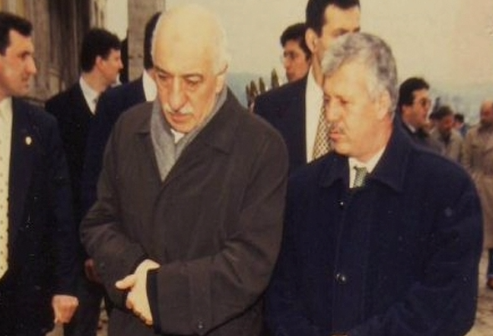
Another important propaganda tool that was another FETÖ media institution was Samanyolu TV. The television channel under the Samanyolu Broadcasting Group was established in 1993. Within a short period of time, under the umbrella of the growing group, Dünya Radio in 1993 and Burç Radio in 1994 were opened. After 1998, new television-radio channels and internet sites were opened. Hidayet Karaca became the president of the group, which had unclear sources of financial support. The chairman of Samanyolu TV was Ali Çelik, and Sedat Yetişkin was his business partner and a board member. Hidayet Karaca was one of the closest names to Gülen. The Gülenist structure, which established a strong network in the field of media in the 1990’s, continued to open different channels and media bodies under Feza Journalism and the Samanyolu Publishing Group in later periods.
Preparatory schools were vital for the parallel structure disguised as a religious community, as they enabled the organization to gain new members and financial support. Between 1980 and 1990, 20 to 30 schools that were linked to Fetullah Gülen were established. The number of preparatory schools in Turkey linked to Gülen numbered in the thousands
FEM preparatory schools: Gülenist Education Centers
The first preparatory schools in Turkey opened in the 1960’s. Private preparatory schools were established by Law No. 625 from the date 08.06.1965. After this date, central examinations increased and private preparatory schools spread. Before the 1980 coup, nearly 200 preparatory schools were opened across Turkey. After the coup, there was a rapid development in the spread of preparatory schools. In this environment, Gülenists also prioritized opening preparatory schools. From the middle of the 1960’s, Gülen wanted to open private education institutions and was planning to do this within the 'college' rationale. He was closely involved in the education of students in İzmir during his time in Kestanepazarı, and wanted private courses to be launched. The organization, which opened the schools under the umbrella of the ‘Akyazılı Foundation’ wanted to build a strong connection to students. After the 1980 coup d'etat,
new developments were established in terms of preparatory schools. A bill that came to parliament in 1983 aimed to abolish preparatory schools. However before the schools could be shut, the new government canceled the bill. In this period during the Özal administration, incentives for the private sector increased and so Gülen and those close to him took action. In 1985 the first preparatory school connected to Gülen’s ‘religious community’ was opened. In 1985, FEM Preparatory Schools were established with the financial support of businessman Mustafa Fırat, one of the names close to Gülen. FEM Preparatory Schools operated joint to the Güven Preparatory School Association (Güvender). In 1989, with the support of Gülen’s community, the Körfez Preparatory Schools were opened. The Anafen Preparatory Schools were opened in 1994 to cater to elementary school students.
While Anafen Preparatory Schools aimed at students preparing for high school. Within the structure Gülen established, the main aim of the preparatory schools was to collect members and develop human resources. Students who were successful in their studies received extra attention. These students were invited to stay at the Light House boarding houses tied to the preparatory school in order to familiarize these students with the organization and subtly convince them to become members.
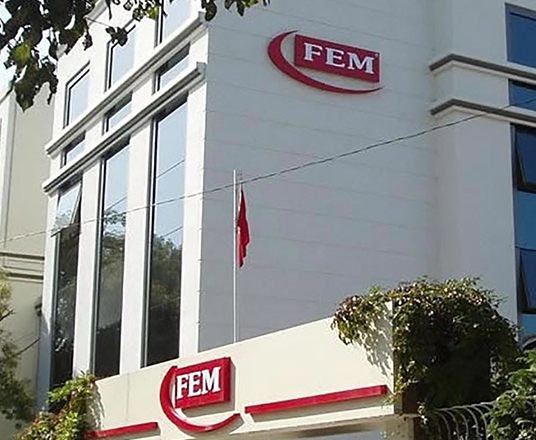
The preparatory schools founded by Gülen had many different functions. The first function was to convince the general public that they were focusing on education and therefore doing something beneficial. In this way, the organization wanted to become respected and revered within the community. They spread the notion that the organization was doing legal work and was focused on ‘service’ while also spreading propaganda and supporting the organization and their preparatory schools through the success of students. This increased those interested in the preparatory schools. The second function was to guide the multitude of people through the preparatory schools in line with the organization. Those who were convinced and became members later went on to take up significant roles in government institutions and as part of the infiltration process.
The third function was to establish a youthful and dynamic hierarchical structure that adhered to Gülen’s teachings. The fourth function was to provide an important financial resource that contributed to the strengthening of the organization. For this parallel structure with the appearance of a religious community, the preparatory schools had a special place in terms of both acquiring new members and obtaining financial resources. In this context, there were approximately 20 to 30 schools linked to Gülen opened between 1980 and 1990.
Preparatory schools were used as an instrument for showing 'legitimacy' and for recruiting younger generations by emphasizing education as important for the organization.
The government allowed private schools to be opened after 1983, and this was an opportunity not to be missed by 1983. According to Gülen, in these schools 'idea architects' would be raised and Gülen would introduce himself as an encouraging figure. Gülen refused to accept that the schools were tied to him. His answer never changed: "I just encourage. I do not know who opened the schools.’ By the year 2000, the number of preparatory schools established in that were linked to Gülen in Turkey reached the thousands.
During this period, the colleges "Yamanlar" in İzmir, "Fatih" in Istanbul, "Samanyolu" in Ankara, "Aziziye" in Erzurum and "Serhat" in Van were opened. Years later, when asked about these activities, Gülen said: “I am merely a small, simple preacher. I encouraged the opening of schools. You need financial support for schools and I didn’t have anyone I knew. I don’t know more than 10 people.” In this way, Gülen defended his strategy of calling for donations for the schools during the sermons he delivered at the mosque.
During these years, Fetullah supporters launched a huge effort to gain the youth staying at their boarding houses and attending their preparatory schools as members of their organization. A great responsibility fell on the shoulders of those who were referred to as “brother.” Those who were raised in these schools were guided, in time, as part of the organization’s short, intermediate and long-term plans.
‘Simple preacher’ and the opening of schools
The supporters of Gülen, who claimed to be “merely a small, simple preacher” started to see him as a superior personality. In this way, the supposed preacher Gülen tried to disassociate himself from the organization. Gülen introduced the schools as an ‘independence struggle.’ During his time in Istanbul, Gülen delivered sermons at Süleymaniye mosque and other mosques and asked people to provide financial support. At the same time, he also highlighted the need to open more schools. The so-called preacher who exploited religion strengthened his organization with the sermons he gave. Years later, Gülen said he used this attention by stating, “I used people’s kindness as a credit card,” and thereby shed light on his intentions.
Indeed it was as Gülen said; some sectors from the tradesmen and business world first offered a loan to Gülen first as outsiders and then later as members of the organization. Gülen made good use of this and increased the strength and support of his strategy of ‘educational mobilization.’ In doing so, Gülen always put education, religion, and financial support at the forefront of his plans. However, Gülen’s goal by opening the schools and establishing other organizations was very different. Gülen summarizes this with the words: “I have different thoughts, but Turkey is not quite ready yet.”
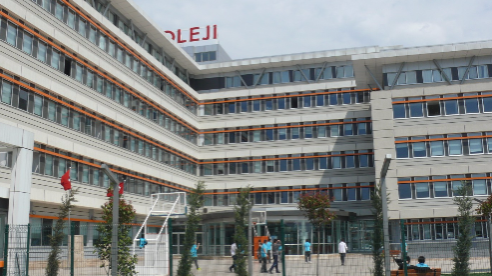
The Gülenists launched a mobilization in order to gain those at their schools, preparatory schools and boarding houses as members of the organization. Members referred to as ‘brothers’ had a great responsibility in engaging and convincing others. Those who were raised at these schools were guided according to short, intermediate and long term plans. Graduates were placed in high ranking positions in government institutions. In this way, a structure of members who were loyal to and believed in Gülen was established.
“In 1992, Gülen embarked on a 55 day trip to the U.S.A. and Australia. He met with many different groups and started work to establish the organization in the U.S. too.”
“In 1992, Gülen embarked on a 55 day trip to the U.S.A. and Australia. He met with many different groups and started work to establish the organization in the U.S. too.”
Another important aspect of the schools was that Gülen received a great source of income for the parallel structure. Students enrolled in these schools, which were established within a collegiate logic, were being charged high tuition fees. The 'college system', which Gülen introduced as a quality education center, was of great importance for the organization. While the Gülenists opened many private schools and colleges, they refrained from opening an Imam Hatip High School (İHL). However, they were going to great lengths in order to impact students who attend Imam Hatip High Schools. Through the teachers and through the boarding houses they established in the vicinity of the IHL schools, the students were identified as part of a target to recruit them as members of the organization. But the FETÖ organization did not succeeded in this. Students of the conservative school were not affected and the organization faced problems in recruiting these students. Rather than becoming a fruitful place for recruiting, IHL schools were able to damage the organization’s public perception.
FETÖ expanded globally through middle Asia
A power balance that was being changed from 1989 and the dissolution of the Soviets caused an empty pocket of power in Asia. A new order was established in Asia, especially after the Republic of Turkey declared independence. Just at such a time, Fetullah Gülen ordered the establishment of activities abroad. Gülen, who had previously been unable to organize in European countries such as Germany and the Netherlands, developed his greatest strategy based on Central Asia. He wanted businessmen affiliated to the organization to open schools abroad. He discussed this wish in the sermons he gave at the Süleymaniye Mosque. In an interview in 1998, Gülen said: “Islam mainly developed in Asia, so we need to go to Asia.
Iran and Saudi Arabia should not enter this region. We catered to this need. ”In regards to his role, Gülen said: "I consider myself to be one of the heirs of the world." Gülen, who dedicated himself to the mission of opening up to Asia, started to evaluate politics at this point and sought international support through anti-Iran sentiment. According to Gülen, the Turkish state also supported the project to open up to the world: "Demirel signed papers to be given to some statesmen for external schools, and said ‘Go and write whatever you like on it.’ Özal said he was not a guarantor for the schools. The military was aware of the schools being opened in northern Iraq and Afghanistan.”

On January 11, 1990, a group of 11 people affiliated with Gülen moved to Georgia. After visiting Batum, the group traveled to Azerbaijan. Here, with the help of the Azerbaijanis, the group traveling around the region returned to Turkey and informed Gülen of the developments. The first goal of those loyal to Gülen was to raise the children of the needy in Turkey. In May 1990, Gülenists, who had set up a team of 37 people, traveled to Azerbaijan, Uzbekistan, Kazakhstan and Tajikistan. Taking advantage of the gap created after the collapse of the Soviets, Gülenists took the closely affiliated businessmen under the name of the religious community to invest in these countries within the framework of the lobbying activities they started there. Thus, as Gülen pointed out, the first entries into Asia were established. Entrepreneurs who invested here also played a major role in opening schools near Gülen.

According to Gülen, the 'missionary' activities are a part of the agenda of these schools. He stated that they had carried out missionary activities through colleges, private schools, universities, dormitories, classrooms and student houses opened abroad. Gülen claimed that this mission was for the benefit of the country, but the picture that emerged later on was different. As Gülen became stronger, his interest increased. In the process of opening schools abroad, Gülen traveled to the U.S.A. This trip, which took place in 1992 and included the U.S.A. and Australia, lasted 55 days. He met with many different groups, and shaped the initiatives for the organization to engage in activities in the United States. Although it is not known exactly who Gülen met with during this trip, it is said that he opened a course in places such as Pennsylvania and New York. By 1994, Gülen’s organization’s main media institution the Zaman newspaper established its headquarters in New York as well as other branches in several other states.
Gülen encouraged the businessmen and shopkeepers that provided him with financial aid to establish business partnerships with one another: “There should be no general stores. These should be supermarkets. To achieve this, the people I work together with have joined forces to make it possible.
After this process, Gülenists gained speed in opening schools abroad. Gülen was met with great interest both internally and externally as he continued to open schools across many countries of the world. Gülen, who developed relations with the West in the mid-1990’s, visited the country several times before embracing the U.S.A. itself. Gülenists, who started to open schools in South America, preferred Bolivia and Argentina in particular. In 1996, the Gülenist organization, which opened a school named Nur in Bolivia, raised 2,000 teachers in rural areas for community development agencies. In the La Rioja region of Argentina, there were 300 teachers. It was again the United States that supported Gülen's work abroad in this region, which began to grow. In 2002, the US Agency for International Development elected Gülen's training centers in Bolivia as the "Center of Excellence in Education". After this date, the number of schools affiliated to the terrorist ringleader Gülen abroad was in thousands. Schools, classrooms, dormitories and associations affiliated with this structure were operating in over 100 countries in the world.
FETÖ’s finance circle: Donation meetings
Fetullah Gülen, in the sermons he gave since the 1970s, frequently called on people to provide financial support in the form of donations. The Akyazılı Foundation has also played an important role at this point. The so-called preacher Gülen received support over time from many shopkeepers and businessmen, including those in the Aegean and Marmara regions. He was able to reach many important people with the support of the important names he affiliated with and the influence he wielded due to the sermons he delivered in mosques. Gülen, who initially started receiving financial support in Kestanepazarı, soon started receiving financial support from businessmen in many other regions. In Gülen’s own words, “the people sold their horses and cars” and gave the money to him. Everywhere the boarding houses and schools were located, a group of shopkeepers and businessmen were formed to support this structure. Thus, the parallel structure of Gülen, which provided financial support, began to expand and grow faster.

Gülen's speech during this period encouraged the people to help, but it became a duty for the businessmen and shopkeepers in the community. In some houses, the meetings were held under as supposed religious discussions while Gülen's videotapes were watched and books filled with his heretical ideas were being read. After the discussion, participants were asked for financial support that were declared donations. Thanks to this financial support, members of the organization quickly achieved a large income. In an interview with Yalçın Doğan, rIngleader Gülen describes the opening of schools as a "struggle for independence," and when asked about the financing of these schools, he says that he was able to collect financial support from wealthy people through alternative donation meetings.
Gülen’s corporate metaphor: Supermarkets
While collecting donations from shopkeepers and businessmen, Gülen also encouraged them to establish business partnerships. In his interview with Yalçın Doğan, Gülen said, "There should be no general stores. These should be supermarkets. To achieve this, the people I work together with have joined force to make it possible.” Shopkeepers and businessmen started to work together after Gülen’s instruction to join forces. From the beginning of the 1990's, various businesses started to establish associations and cooperate across many provinces of Turkey. After this step, which was important for strengthening the organization’s structure, many small and medium sized enterprises and companies joined the activities. In the next step, the enterprises that started to be active in Turkey’s domestic market over time started to become active in the global market too. Thanks to the lobbying of the organization's schools abroad, many businesses found strong footing in foreign markets as well.
These companies, which were strengthened as a result of the associations and expansions, launched many new activities in Anatolia. In 1996, businessmen who were still affiliated to the terrorist ringleader Gülen banded together to establish Asya Finance. Ali Kavanagh is one of the names that Gülen describes as one of “the people whom do as I say”. According to Nurettin Veren, once Gülen approved of Asya Finance, Selçuk Berksan, Tahsin Tekoğlu, Mehmet Hasırcılar and Mustafa Ozcan met with Nurettin Veren at the Duru Evyap plant in Istanbul. These businessmen were the biggest contributors to the founding of Asya Finance. While Asya Finans was founded through Tahsin Tekoğlu, the greatest support during the establishment phase came from the then Prime Minister Tansu Çiller. After the establishment of Asya Finance, it handled all the funds obtained through FETÖ-affiliated university preparatory courses, dormitories, colleges, newspapers, magazines and television.
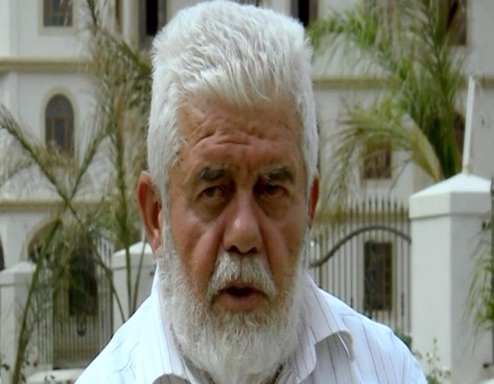
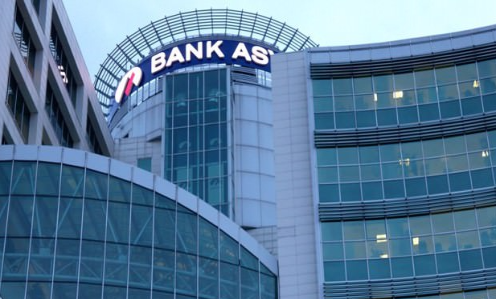
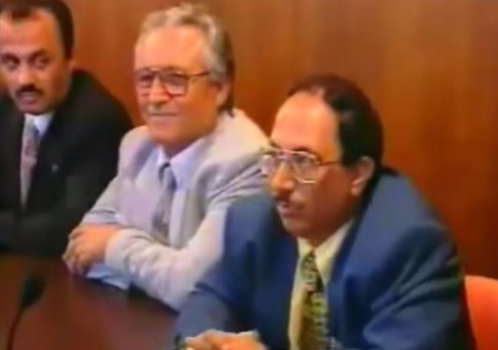
Another company founded with the instructions and support of Gülen was Işık Insurance, which was founded in 1995. While the company was founded with a capital of 200,000 TL, it soon grew with Asya Finance. The company's most important business partner was also Asya Finance. Among the members of the company's board of directors were Ihsan Kalkavan, Mehmet Emin Hasırcılar, Ahmet Kurucan and Fazıl Karaman.
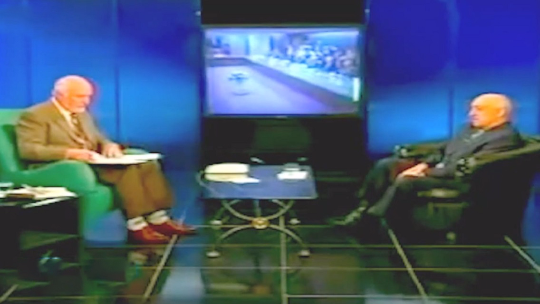
In a television program Gülen participated in 1997, Gülen shed light on his true intentions by stating, “I used people’s kindness as a credit card.”
Among the institutions established by the members of the organization who acted in accordance with instruction from their ringleader Gülen to join forces are the Çağ Öğretim (Epoch Education) Business, Feza Journalism, Eflak, General Directorate of Kazakh Turkish High Schools, Sebat, Silm, Başkent Education Company, Serhat Education and Health Services Inc., Tolerance Foundation, Ufuk Education Foundation, Toros Education Services Tourism and Trade Inc. , Ertuğrulgazi Education and Training Inc., Karachay Çerkeş Toros Education Services Inc., Duane 94 Company, Private Burg, Friendship Yurdu Association, International Hope Ltd. Comp, Fezalar Education and Training Co. Ltd. Company, Balkan Education and Culture Foundation, S.C Lumina SA Company, Gulistan Education Publishing and Trade Ltd. Company, Sema Education and Instructional Business Inc, Samanyolu Inc, Turkey Health and Care Foundation and Yayasan Indonesia Foundation. While these companies worked in line with Gülen's distorted aims and directives, they made great earnings. The organization developed economically and strengthened both domestically and globally as Asya Finance and the other companies also grew.
Relations with politics
Gülen’s first encounter with politics was in his youth. He lived in Ankara for a period of time before traveling from Erzurum to Edirne at the age of 17, stayed with Erzurum Member of Parliament Mustafa Zeren. Gülen described Zeren as “a close friend of his father.” Mustafa Zeren was the one who helped Gülen take the examination for the Presidency of Religious Affairs. When Gülen was in Ankara, Zeren was also the one who notified him of his results. In the book Küçük Dünyam (My Small World) Gülen claimed that when he was 18 years old, he had a working relationship with security personnel, judges and public prosecutors.

Gülen as the President of the Association for the Struggle against Communism
In the 1960’s, Gülen met with Kasım Gülek, the CHP General Secretary during the time of İsmet İnönü. Gülen referred to Gülek as “our friend.” Gülek was the pioneer in the founding of the Association for the Struggle against Communism in Turkey. In 1960 he opened the Association for the Struggle against Communism in Erzurum and remained in charge for a while. The first common point between Gülen and Gülek was this association. Having developed a close relationship with Gülek since the 1960’s, Gülen began to draw closer to the political periphery on this point. Gülek is also the person that introduced Gülen to U.S. Ambassador of Ankara Morton Abramowitz. It was often said that terrorist ringleader Gülen was put in touch with the CIA through Gülek.
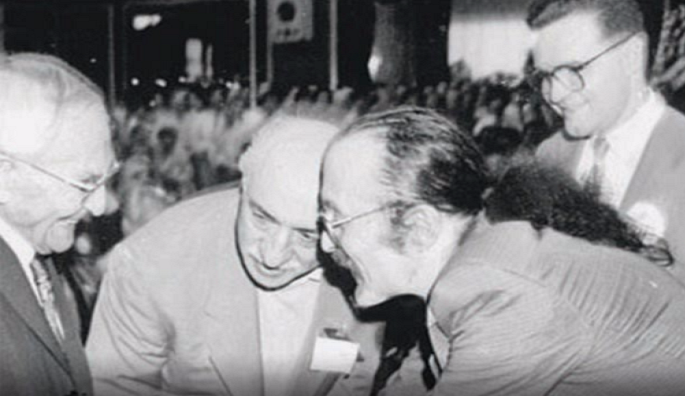
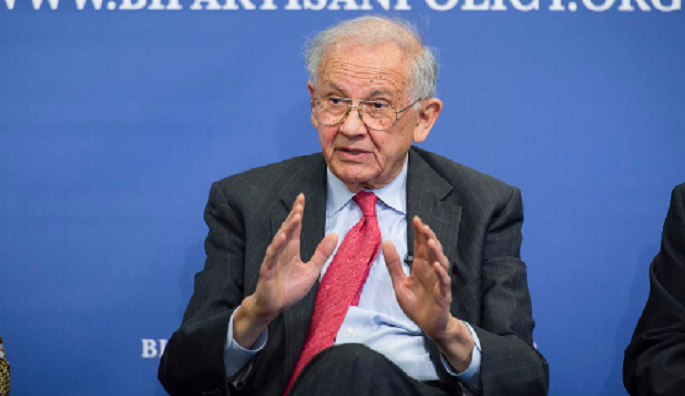
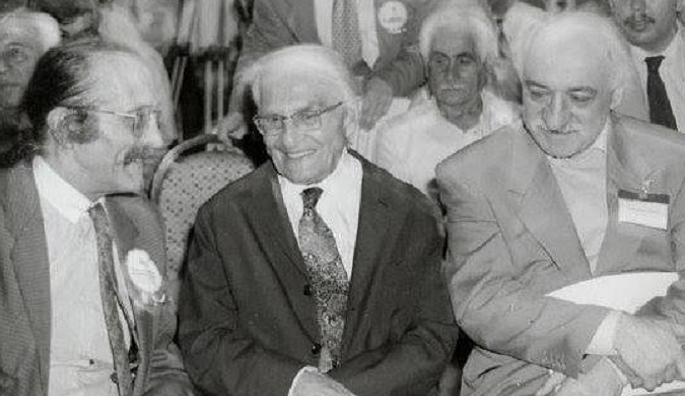
Gülen presented with a medal from the Mason Organization
Kasım Gülek has been linked to the secret Mason organization in Turkey. Gülek is referred to as a Mason in many sources, and these claims are verified in a letter that surfaced years later. In a letter that Gülek writes to the Mason organization, he tells them that he too is a Mason. The most striking detail in the letter is that the name of Fethullah Gülen is also mentioned among members of the Mason organization that Gülek addresses as “my brothers.” The letter Gülek wrote on July 16, 1967: "The unique and coordinated Mason organization in Turkey is the great locus (Turkish Elevation Association) of free and accepted masons in Turkey. It is not right to try and form an association by meeting with some people as it would ruin the organization of Turkish masonry which was established in the 1900’s and has been accepted globally.” Gülek complains that many masons are being offended and turning their backs. One of the names Gülek lists as affected by this problem is Fetullah Gülen. Gülek said, "This fierce ambition to support and militate with some side ideas has divided Turkish masons into two or even three groups. Some of our brothers Ş.K., Fethullah Gülen, A.D., Z.E., K. T., V.K. and T.K. were offended. These friends have forgotten that the great lodge awarded them with the highest of medals. It is every masons dream to receive the medal for superior service.” (Kaynakça) Another important piece of evidence that proves Gülen had links to the Mason organization is from March 25, 1975. The document states that Gülen was sworn in by the Great Masonic Assembly of Turkey during an initiation ceremony.
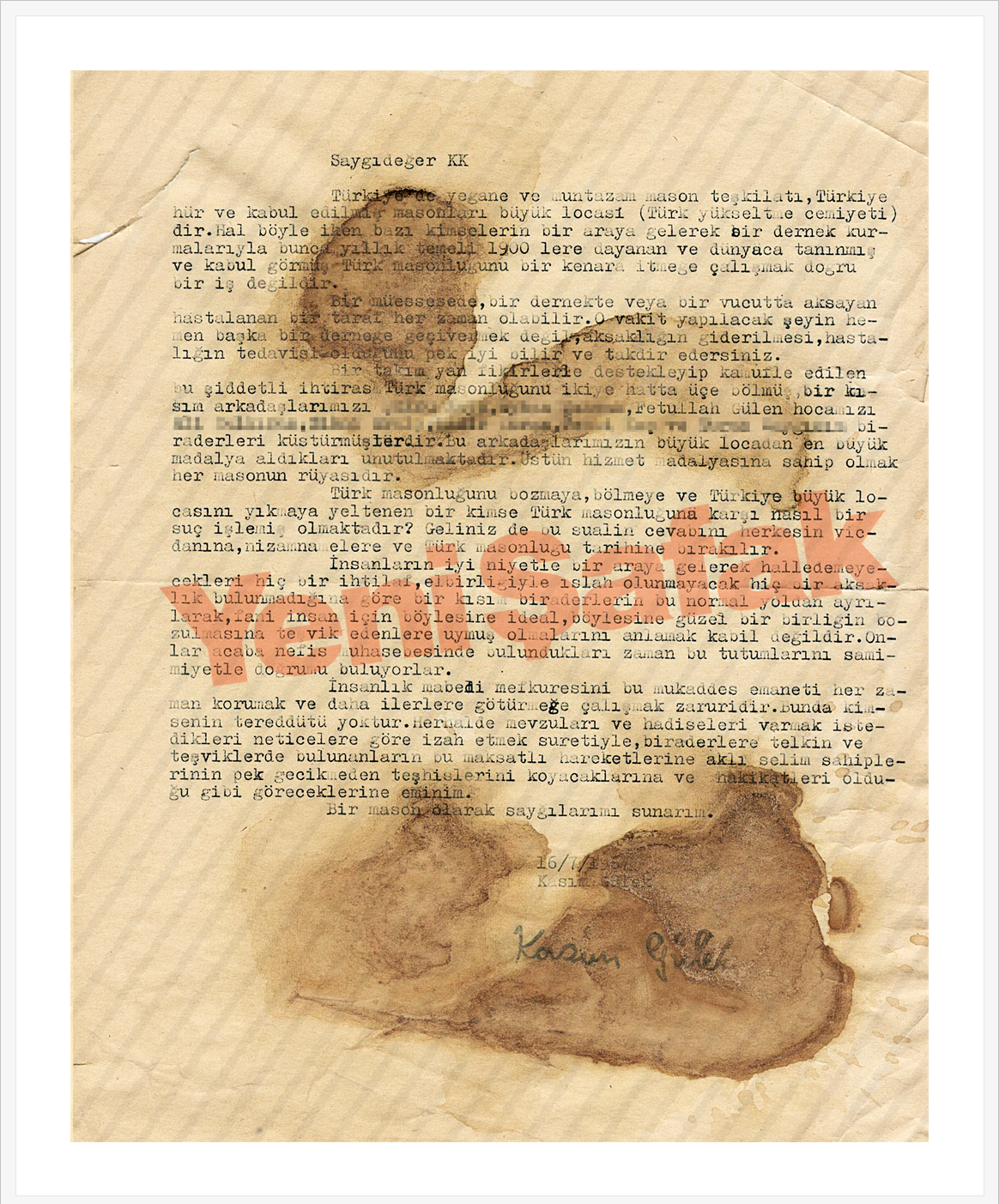
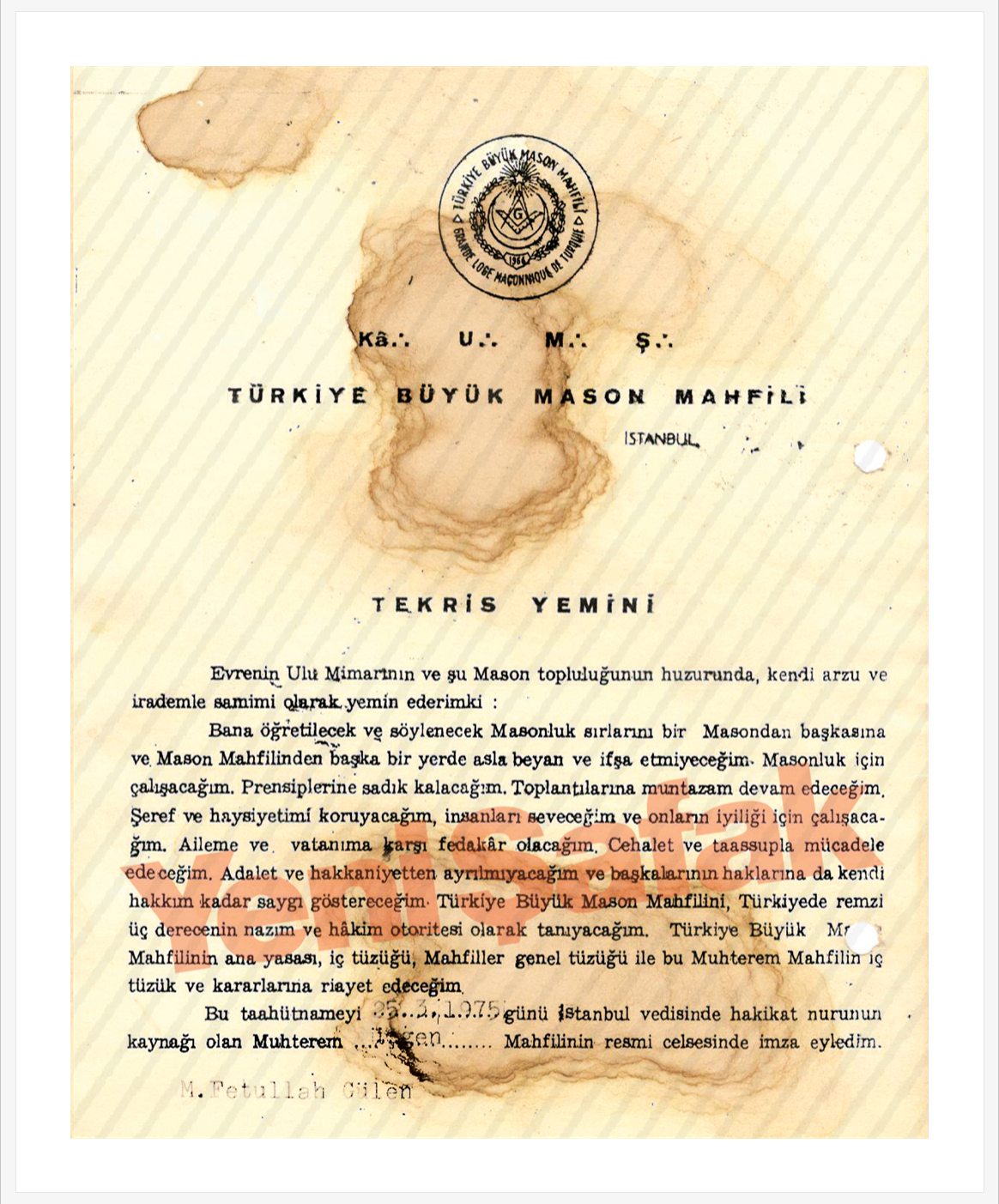
FETÖ ringleader Fetullah Gülen’s initiation oath at the Great Masonic Assembly of Turkey. In freemasonry literature, an oath is taken both upon joining the organization and when rising in rank. Gülen’s oath is as follows: “I sincerely swear in the presence of the Great Architect and the Masonic community with my own desire and will that: I will never declare and reveal the secrets of Freemasonry that will be taught and told to anyone else from one Mason to another. I will work for freemasonry. I will stick to your principles. I will continue to attend meetings regularly. I will protect honor and dignity, love people and work for their good. I will be sacrificed for refuge and homeland. I will fight with ignorance and intransigence. I will not separate from justice and equality, and I will respect others' rights as much as my own. I will know the Great Masonic Assembly of Turkey as the master of verse. I will comply with the Constitution of the Great Masonic Assembly of Turkey, the bylaws of the revered gathering-place. I signed this contract in Istanbul on March 25, 1975 at the hearing of the revered triangle gathering-place.FETÖ’s ringleader Fetullah Gülen’s links to the freemasons is proved in many documents. His relationship with the freemason organization was initiated in the 1960’s. It is clearly understood from the letter that was sent by Orhan Demiriz to the Grand Lodge of Free and Accepted Masons of Turkey that Gülen received the highest medal on July 17 1696. In the letter sent by Demiriz for the ceremony,
he says: “The presence of our brothers and sisters at all times is one of the greatest powers that has resulted in sincere relationships with each other and with their families except MAH. It is rare to develop bonds without meeting and spending time together. It is easily understandable Kasım Gülek's biggest medal received from the great locals said that Fetullah Gulen'sassociation with the Mason organization begins in the 1960s years. As a matter of fact, it is understood with a letter sent by Orhan Demiriz that Gulen received a medal from Free and Accepted Masonic Lodge on 17 July 1696. In the letter Demiriz sent for the ceremony, "Our brothers and sisters are always in one place, one of our greatest powers, except for MAH, who have sincere relationships with each other and with their families. It's hard to love without seeing before you meet. It is easy to understand that we can create syllables by mutually understanding each other. It is very important and important for this work to think that the life of an enterprise can always come into its own accord with harmony and agreement between the people who manage it and that makes it possible for you to make various meetings such as evening or afternoon or night every Tuesday following your official Celsus Muhammad Fetullah Gulen, who contributed to the new ideas and mutual talks, was voted in a unanimous decision to be rewarded with a ceremony to attend the "KK" ceremony. Documents related to the tulip medal received by Gulen are included in Gülen's Mason Organization and show he was a heretic.
It is understood from various documents and Gülek’s letter that in the 1970’s Gülen attended many meetings of the freemasonry organization. On April 21, 1974, Gülen was invited to attend a meeting on ‘Tolerance’ by The Grand Lodge of Free and Accepted Masons of Turkey’s Secretary Orhan Demiriz. In the same way, Gülen was invited on May 20 to the ascension in rank ceremonies on June 7 along with freemasonry members A. Kürkçüoğlu, F. Buyurman, S. Hattatoğlu, A. Kıymaz and E. Kasaster. Similarly, documents emerged proving that Gülen attended the freemasonry organization’s meetings on July 5 and 19 in 1974.
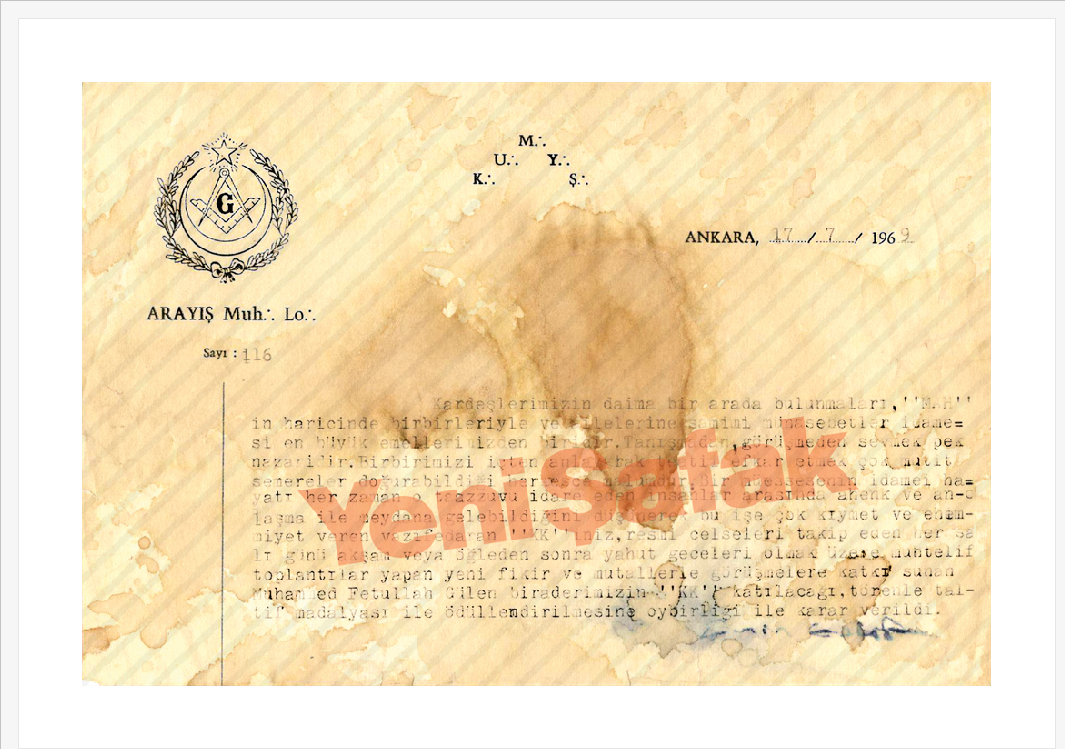
An invitation dated July 5, 1974 read, "Just as we do every holiday season, we will share our salt and bread at our brotherly dinner table this season too. We request the presence of all of our brothers with love and respect,” which focuses on the importance of bread and salt in the beliefs of the freemasons. For freemasons, bread is regarded as the most basic food necessary for survival. Salt is believed to represent their transgressions and evolving superior qualities. Essentially, it is fascinating that the heretical views of Gülen to establish a ‘golden generation’ bears striking similarity to the thoughts and beliefs of the freemasons.(Kaynakça)
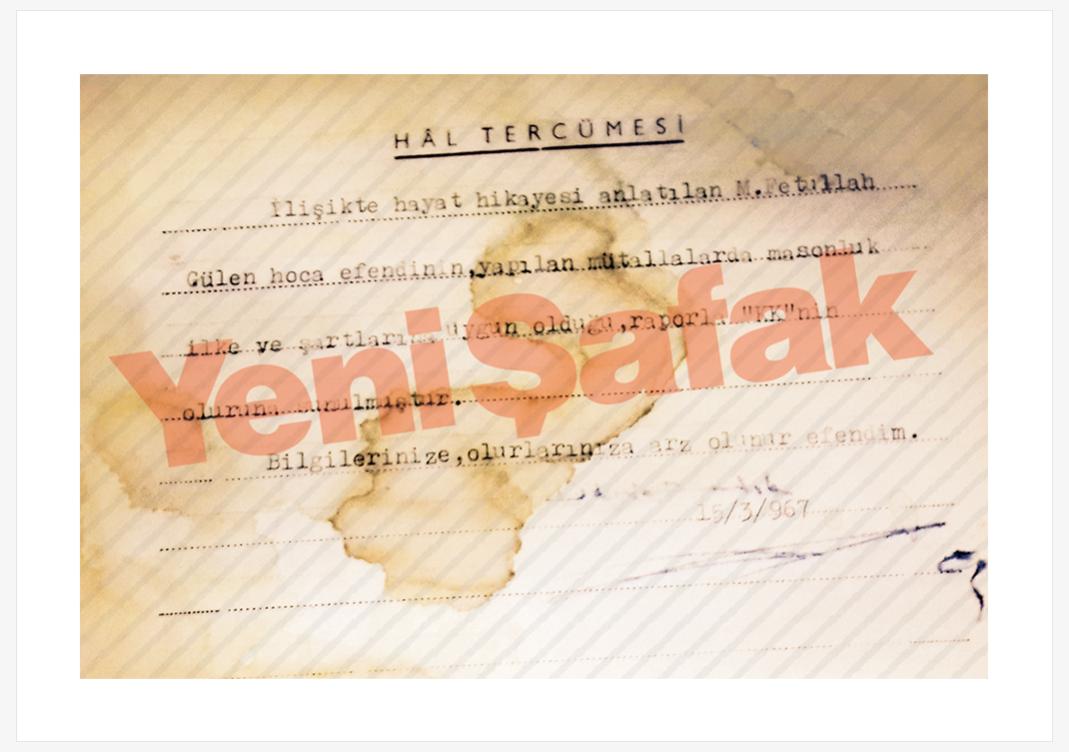
The relationship between Gülen and Kasım Gülek, one of the most important names in the Mason Organization, confirms that the so-called preacher Gülen is a mason. For Gülek, Gülen, who is referred to as "my close friend", used many words of praise about Gülek on numerous occasions. The most obvious example of this is seen in the summer of September 1, 1997, in an article published in the Zaman newspaper. In this article, Gülen uses these praise words for Gülek, "Abramowitz was one of the people I saw in the U.S. He was an ambassador in Turkey for a while and we had a joint friend Mr. Kasım Gülek... Until today, Turkey has faced many life-or-death crises. Count this as a crisis if you like but these people will overcome it, I said. I said, if possible, this voice should be carried to the Pentagon, up to the White House, to Congress.” The friendship between Gülen and Gülek, which started in the 1960’s, grew even stronger over time. When Gülek passed away in 1996, his close friend Fetullah Gülen led the funeral prayer.
Şenler: Gülen is a mason
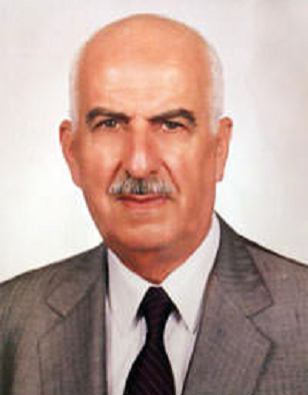
During Fetullah Gülen’s time in Kestanepazarı, Izmir, his biggest supporter was wealthy businessman Ali Rıza Güven. Güven, a member of the freemasonry organization, had a close relationship with government officials, judges and prosecutors in Izmir. After Gülen settled down in Izmir, Güven took him under his protection and enabled him to greatly strengthen and grow the organization. Gülen’s greatest financial support during his time in Izmir came from Güven. Gülen began to teach his warped ideas to the people who gathered around him in an effort to grow the organization. Gülen's activities in the Aegean region were directives from Güven, who was a member of the Masonic Organization Trust. As a matter of fact, a video of Üzeyir Şenler, one of Bediuzzaman Said Nursi's students, published on TRT 1 clearly shows that Güven is a mason. Şenler says that he met Ali Riza Güven, whom he directly refers to as a mason, and his sister Şule Yuksel, who is the author of the novel Huzur Sokağı (Peace Street), for a legal case that was opened against them for their remarks about the headscarf. Şenler states that upon a recommendation, they went to meet Güven.
Şenler, who spoke while he was sick in bed, said, "We came to Izmir because of the court case. They recommended someone in Izmir called Ali Riza Güven. Then we started to be in close contact with Ali Riza Güven. I mean he used to come over in the evenings. Ali Riza Güven went to court and was acquitted. I mean he found a way.”
Ali Riza Trust proposes Freemasonry to Şenler after the conclusion of the case. Üzeyir Şenler said, "We have studied you and we know you, and you know that there is such a capability that you have begun ... Ali Riza Trust has offered me to enter the Freemasonry." Şenler stated that Güven was in the proposal of a general manager of a very important institution and he said that it is necessary to be a Mason and his reaction was more terrifying than it was after he got a hard answer. He said that he did it to Gülen and that Gülen accepts this offer Şenler who spoke for Fethullah Gülen's Freemasonry said, "For example, someone who is number 1 in ... He was very tight with him very tightly. They were together every moment," he says.From 1964 onwards, Gülen and Güven, developed their close bonds of friendship. FETÖ’s broadcasting tool STV filmed an exclusive documentary in 2006 about FETÖ ringleader Gülen’s close friend Güven.
Members of the organization who opened many schools, dormitories and universities in central Asia and the Balkans quickly became an influential source and launched lobbying activities. These members of the organization soon started to encourage businessmen to invest overseas and organized for them to meet with heads of state and government officials.
MSP move warrants adverse reaction
Gülen's involvement with politics was even greater in the 1970’s. Being a popular preacher, he argued that it was not harmful for a preacher to establish close relations with politics. His views warranted a negative reaction among the Nurcu community, preached during his sermons that MHP should be supported. After this, Gülen started to try and get closer to the National Salvation Party (MSP). He attempted to spread across Turkey and open boarding houses through the youth arm of the MSP. After a while he separated his ways with the Nurcu community. Gülen, who was completely independent and sped up the spread of his teachings, had the MSP in his sights. But his attempts to spread throughout the base of the party were met with negative reception as he tried to spread his teachings and he was soon opposed by the leader of political Islam in Turkey Prof. Dr. Necmettin Erbakan. Gülen soon cut all ties with the MSP.
Özal’s politics and Gülen’s anger
Following the September 12 coup d'état, after the elections in 1983, politics started to be re-stabilized and with Özal's success, many renewals started to take place in Turkey. Özal's liberal policies and private sector incentives gave birth to new opportunities. Classrooms and schools also benefited during this period. Within this scope, new schools and preparatory schools were opened in many regions of the country by Gülen's organization in a short period of time. Gülen instrumentalized 'education' in this period and used a training-oriented discourse. This situation suited the policy Özal pursued. After Özal started, he encouraged the private sector domestically, while globally he was pushing Neo-Ottomanism. Ozal's aim was to make Turkey a strong country and establish close relations in the region. In this context, other countries emphasized the development of economic, political and cultural relations.Gülen also encouraged his supporters to move abroad. Gülenists’ education-focused
activities provide a perfect gateway for branching overseas. Beginning in the mid 1980’s in Europe, the new goal of Gülenists was to open schools abroad and open up to the world. Gülenists headed for Central Asia in 1989. Shortly thereafter, schools and dormitories opened. The scheme of spreading abroad under the guise of ‘education’ was perfectly aligned with Özal’s strategy of developing a strong Turkey in the region. For this reason, Özal also supported the efforts to open schools in Central Asia and the Balkans. Özal visited these schools during his visits abroad. Businessmen were encouraged to invest abroad. Gülenists, who opened many schools, dormitories, classrooms and universities in Central Asia and the Balkans, soon became an effective force and lobbied in these countries. The organization soon started to encourage businessmen to invest overseas and organized for them to meet with the heads of state and government officials. This is how the relationship between Özal and Gülen appeared from the outside.
However, Gülen had many secret plans that were revealed when Özal became president and left the presidency of the Motherland Party to Mesut Yılmaz. The so-called preacher Fetullah Gülen, who wrote a malediction targeting Turgut Özal in a lead article of the Sızıntı magazine in 1991, revealed his political plans. In the article Gülen wrote close to two years prior to former President Turgut Özal’s death, he wrote: “Now sleep if you like; because now the judgement that breaks out will be your doom! Yes, in the near future you, with the liability of the past like a hump on your back, it is evident you will be threatened and become history, your negligence, your deception, all your traitorous acts, you will die and be killed over and over again and say ‘If only I were earth,’ and you will groan cries of madness.” Faruk Mercan analyzed the meaning of these verses in the chapter “The article that echoed in Çankaya Mansion” in his book Fethullah Gülen.
Mercan explained that once Turgut Özal was elected, he entrusted the ruling Motherland Party to the liberal Mesut Yılmaz and certain conservative figures were discharged, angering Gülen. Mercan wrote: “His [Gülen’s] attitude in the Sızıntı magazine was related to the discharge of conservative figures from institutions such as the Ministry of Interior and the Police. According to Gülen, Özal should have protected the bureaucrats who faithfully served the state.” Gülen’s caution regarding the selection of statesmen in 1991 and his reaction were evaluated as a ‘push of politics’ 25 years later.
Özal: I liken Gülen to Hitler
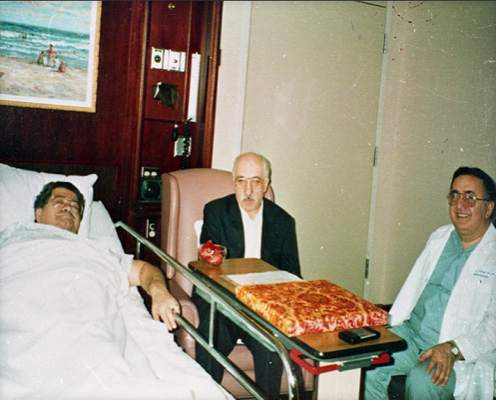 Many years later, Nuh Albayrak wrote in the Star Newspaper about the article Fetullah Gülen wrote about President Turgut Özal and the relationship between the two. The comment Özal made to a journalist he admired dearly and trusted was: “I’ve known him [Gülen] for a long time, we first met during the planning. Later he wanted to meet on multiple occasions but I did not grant him an appointment except for very critical meetings. He visited me in Houston to wish me a speedy recovery. The impression he left on me caused me to take a dislike to and even shy away from him. Because it is apparent that he has big ambitions. Turkey is not enough for him, he wants the world. In the later periods the information I received supported this notion. I realized he lied comfortably. When I explained this to one of his followers whom I trusted, he said ‘Even his lies are beautiful’ and this frightened me even more. This person was sneaking around and almost taking his followers as slaves. In our last conversation, while he sung praises to my face I heard that he was saying and writing baseless things about me behind my back. The idea of 'controlling the world to correct it' reminds me of Hitler. Hitler was a primary school graduate, but he was one of the most important speakers in the world. He dragged the Germans after him with his high persuasiveness. Hitler used nationalism as an excuse for his path and Gülen uses religion. I hope that I am wrong…”
Many years later, Nuh Albayrak wrote in the Star Newspaper about the article Fetullah Gülen wrote about President Turgut Özal and the relationship between the two. The comment Özal made to a journalist he admired dearly and trusted was: “I’ve known him [Gülen] for a long time, we first met during the planning. Later he wanted to meet on multiple occasions but I did not grant him an appointment except for very critical meetings. He visited me in Houston to wish me a speedy recovery. The impression he left on me caused me to take a dislike to and even shy away from him. Because it is apparent that he has big ambitions. Turkey is not enough for him, he wants the world. In the later periods the information I received supported this notion. I realized he lied comfortably. When I explained this to one of his followers whom I trusted, he said ‘Even his lies are beautiful’ and this frightened me even more. This person was sneaking around and almost taking his followers as slaves. In our last conversation, while he sung praises to my face I heard that he was saying and writing baseless things about me behind my back. The idea of 'controlling the world to correct it' reminds me of Hitler. Hitler was a primary school graduate, but he was one of the most important speakers in the world. He dragged the Germans after him with his high persuasiveness. Hitler used nationalism as an excuse for his path and Gülen uses religion. I hope that I am wrong…”
Shortly before his death, Turgut Özal went on an overseas trip from April 4 to 15 1993 to five central Asian countries. During his trip, he also visited schools opened by groups close to Gülen. Regarding Özal’s visit to the school, Gülen, in 1998, said: “Our friends shied away from participating in Özal’s trip and did not want to participate. However, they later decided to go. Özal went and came back and died.” This statement left a question mark in the minds of many.
Gülen: Demirel is a chance for Turkey
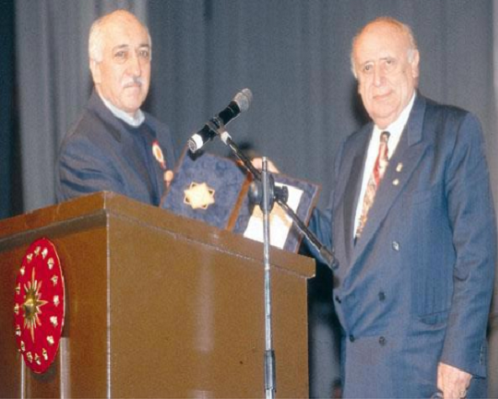
In the post-Özal period, Gülen's dialogue with politicians further developed. During the turbulent periods of the 1990s, Gülen met with many politicians, including Demirel and Çiller. Gülen, when asked why he had frequent contact with politicians, gave examples from the past. Gülen said that he was very good at dialogue with the officers working in the courthouses in Edirne during his time there. "Now I am good with political leaders," Gülen said. After the death of Turgut Özal, President Süleyman Demirel provided great support for Gülenists’ activities abroad. When asked about Demirel, Gülen said, "We have had good relations. We met a few times. He called when I was being medically treated in the U.S. Demirel is a chance for Turkey.
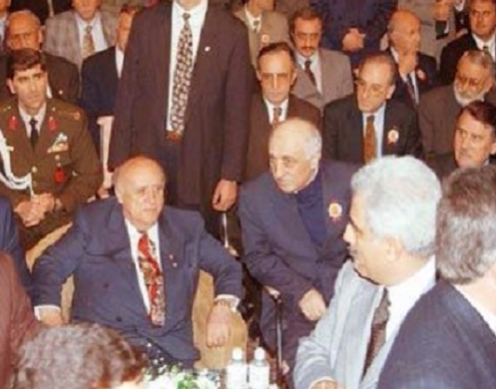
‘I’m forming a lobby’
Gülen evaluated his frequent meetings with politicians with the statement, “I’m forming a lobby.” Gülen says he met with Tansu Çiller three or four times, Mesut Yılmaz three or four times, Ecevit three times, Deniz Baykal two or three times and Necmettin Erbakan two or three times. Gülen also says that he was especially close with Çiller, who participated in the opening of Asya Finance.
Nurettin Veren: Çiller gave 33 counties to Gülen
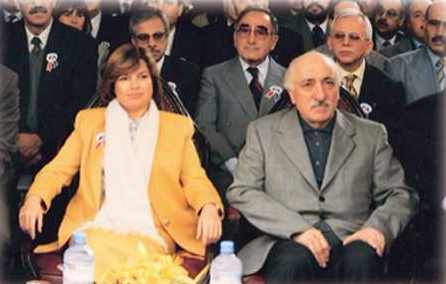
Nurettin Veren, who spoke about the relationship between Tansu Çiller and Gülen, stated that Çiller provided great support to the Gülenists, especially during the establishment of Asya Finance. In regards to his meetings with Çiller, Veren said: “After meeting with Fetullah Gülen secretly in the headquarters of the prime minister, Tansu Çiller and Özer Çiller said, ‘'How can we support you, do you have any desire for us to be useful to you as the government?' In fact, they proposed that we join the party as members of the religious community. After Ms. Tansu said, “You can fill all 33 counties. With your people, you can save the people from this mafia and the low moral people,’ then all the districts in Istanbul were taken and they asked me to give them a list of names within one week.”
At the NSC meeting in 1998, Ecevit reacted strongly to the warnings of soldiers about Gülen.
Çiller finds solution for unregistered money
Nurettin Veren expressed that Tansu and Ozer Ciller met with Gülen many times in Altunizade FEM and Bozyaka in the process of establishing Asya Finans. In Özer Çiller's speech to Gülen he said: "Teacher, let me establish a financial institution for you, this will be very useful for you because if this unregistered money is audited, you will suffer. The biggest operation and your biggest loss comes from these unregistered funds," and Gülen accepted. Veren said that Özer Çiller said, "You have to act quickly and I will help you, let’s establish this financial institution," and that the Asya Finance name was given by Fetullah Gülen. Veren said that businessman Tahsin Tekoğlu was flown in Ciller's private plane to Uzbekistan for the establishment of Asya Finance. Çiller's great support was the result of the establishment of Asya Finance and the opening ceremony was attended by Gülen and Çiller.
Gülen’s ‘shield’ is Ecevit
The ties between Bülent Ecevit, one of the most important names of the left politics, and Fetullah Gülen are very interesting. Gülen had a close relationship with Ecevit in the 1990’s, as he did with many politicians in Turkey. Ecevit also provided great support to the schools that the members of the organization opened abroad. He always showed examples of their schools in debates about the Gülenists and the so-called preacher Gülen. As prime minister, Ecevit visited the school of Gülenists on the occasion of his trip to Belgium and gave a clear message to both his left base and the whole country. Gülen's activities were often discussed at this time, but he was not one to be suspected of Ecevit. Gülen, according to Ecevit, was careful not to contradict secularism in his accounts, and he did not give the impression that he might have represented an outdated current.
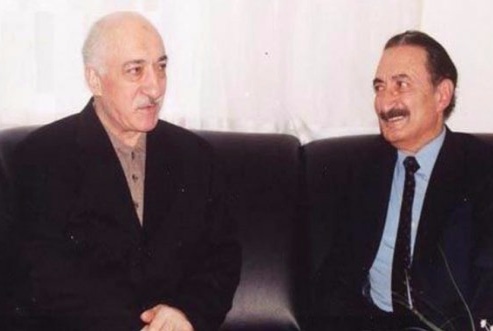
At the NSC meeting in 1998, Ecevit reacted strongly to the warnings about Gülen. Prime Minister Bülent Ecevit, pointing to his friendship with Gülen, said, “You are coming to these conclusions by looking at Fetullah Gülen’s past.
-
Former Ankara Police Chief Cevdet Saral, who informed the Coup Research Commission after July 15, said that he was commissioned to prepare a report on Fetullah Gülen in 1999 and that books and tapes published to date have been reviewed.
Saral pointed out that Fetullah Gülen and his group wanted to seize the country from the top in 2000. "During the conversation with Lieutenant General Reşat Turgut, Head of the Department of General Planning and Policies, it was revealed that the report was very disturbing for them. When I asked ‘It did not benefit us at all, how did it benefit you?’ I was told ‘If we didn’t have that report, Ecevit was going to push for Fetullah to be president.’ When I asked, ‘what are you saying, he didn’t even graduate from primary school, how could Ecevit propose such a thing,’ I was told ‘Those are the kinds of things that are solved easily.’”
Gülen: I will intercede for Ecevit
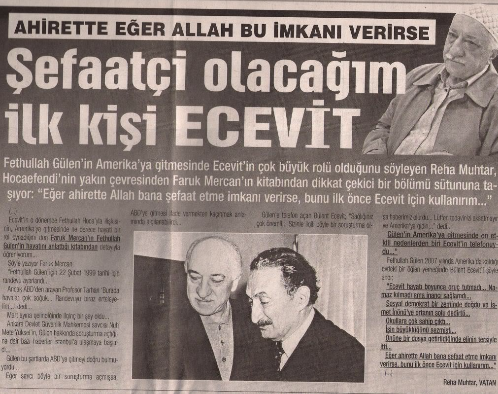
The most important support for Gülen's visit to the Vatican came again from Ecevit. Ecevit called Turkey's ambassador to Italy in search of all kinds of support to Gülen. Again, in 1999, a case against Gülen had been written in detail, along with the fact that Ecevit was the one who recommended Gülen go to the U.S.
Gülen, while expressing Ecevit's approach to himself and the organization, expressed his own attitude: "Ecevit did not fast during his entire life. He did not pray but his faith was sound. He was born on the grounds of a social democratic and made Ismet İnönü say the left of the middle. He protected the schools. He understood the gravity of it all. When he received a file, he pushed it with the back of his hand. If in the hereafter God allows me to intercede, I will use it first for Ecevit.”
The state’s ‘fundamentalism’ rhetoric and Gülen’s immunity
During the 90’s, the most critical issue that occupied the country's agenda was fear of secularism and fundamentalism. While trying to reshape politics through this rhetoric, the process leading to February 28 was initiated. On the one hand, an artificial Iranian regime concern was created, while on the other hand the debate on secularism over the headscarf ban was escalated. The dimension reached by the discourse of refutation caused many congregations and religious groups to be perceived as national threats. In this period, the most basic security concern of the country was 'reaction' after terrorism. Even for the army and the Kemalist bloc, reactions turned into the most important problem that threatened national security.
In such an environment there were two actors who were at the center of the reactionary debates. The first and most important of these was; The Welfare Party, which was elected in 1991 and ranked first in the 1995 elections, the other important actor was the so-called preacher Gülen and other religious congregations. In the 1994 local elections, the new mayor of Istanbul was a member of the Welfare Party, Recep Tayyip Erdoğan, which served to strengthen the Kemalists' anxiety. The Welfare Party strengthened under Necmettin Erbakan's leadership
as it was in power and the desire to develop political relations with Iran and the Middle East was a hot topic in Turkey's agenda. The rhetoric and rise of the Welfare Party caused great concern in some segments. In the face of this situation, rising fear of fundamentalism gradually turned into a 'witch hunt'.
‘Gülen doesn’t wear one, but those around him all wear ties’
While the situation of the Welfare Party in this period became an ongoing issue, the situation was different for the Gülenists, the so-called religious community members. Gülenists, soldiers and some Kemalist sections became sources of disturbance, while for politicians they were a negotiable and moderate partner. The internal and external activities of the members of the organization were constantly supported by the politicians. Many other politicians, including President Süleyman Demirel, continued to meet with Gülen. Çiller, Yilmaz and the relationship between Ecevit and Gülen improved with each passing day. On the other hand, the TAF, which had a strong stance with the support of the Commander-in-Chief Demirel against Erbakan, remained distant from the parallel structure that Demirel refused to fault.For the politicians, the Welfare Party emerged as a political competitor, while Gülen was an active and cooperative person both inside and outside. This led to the concentration of the fundamentalist rhetoric on the Welfare Party and Gülen to stay outside of it.
In fact, according to the politicians in Turkey, the so-called Gülen community did not contradict secular values and was a moderate group. Ecevit, who gave a harsh answer to the debate about Gülen, said that Atatürk paintings were used in schools abroad and that the National Anthem was read and asked, "Where is the fundamentalism in all of this?" Prime Minister Ecevit stated that he believed in the legitimacy of the schools of Gülen, saying, ''Do these prestigious institutions want to move the fundamentalism to those countries? Without this endeavor, the Central Asian Turkic Republics, and especially Azerbaijan, could be influenced by Saudi Arabia to penetrate the fundamentalist regime in Iran. It's normal for high institutions to have doubts. But nobody can say that he is taking the dark road or was taken from other countries. Skepticism affects the progress of science, and if it turns to prejudice it could be harmful. They say, 'Send the state auditors to the schools in the interior.' They have a moderate attitude toward the hijab. They say, ‘These are only details, it shouldn’t become an issue.’ The only thing left is that Gülen does not wear a tie, but those around him all do.”
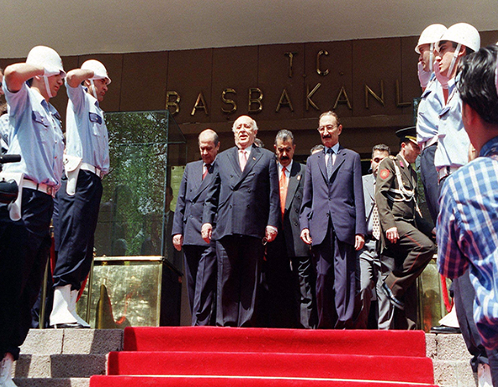
For many politicians, especially Ecevit, the Gülenists were a legitimate factor that needed to be supported, while the Welfare Party could become a threat both as a political opponent and through the policies it would adopt if it came to power. While the army and politicians were meeting at a common point in the Welfare Party, they shared differing views regarding the Gülenists, or the so-called members of the religious community. This image became clearer with the Welfare Party's coming into power in 1997. While the Welfare Party and some religious groups were centered on the political debate, Gülen was excluded from his influence as a result of his distance from Erbakan.
Gülen, on February 28, participated in a television program and said, "You could not succeed, now leave," in a comment targeting Prime Minister Erbakan.
Once Necmettin Erbakan became prime minister in 1997 and Tansu Çiller became foreign minister, secular discourse and the headscarf started to become highly discussed. Gülen responded to the headscarf debates in this period, saying that "the headscarf is a detail" and the secular discourse gave moderate messages. In this period, the army tried to direct politics through NSC decisions and establish a guardianship regime on the political institutions. In this chaotic environment in the field of politics, the Gülenists continued to organize and operate both domestically and internationally. However, the rise of the reactionary discourse began to affect the Gülenists at the end of 1998.
Fetullah Gülen and the February 28 period
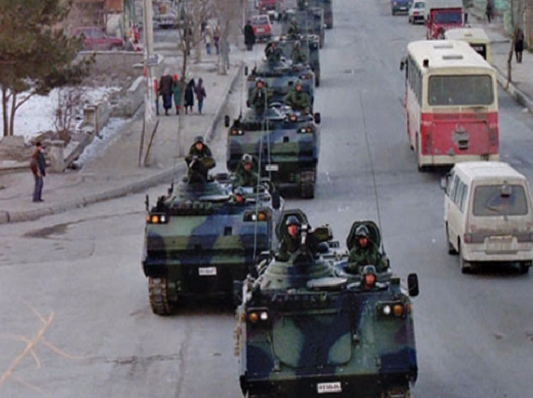
The NSC, which convened on February 28, 1997, lasted for 9 hours and emphasized that secularism is the assurance of democracy and law in Turkey. The recommendations of the NSC were declared to the ruling council, while Prime Minister Erbakan had not signed these resolutions, which target the beleaguered sector in Turkey. This position of Erbakan; President Süleyman Demirel, the TAF, especially the media, politics and NGOs took action. The army has also launched a post-modern coup attempt by giving an ultimatum to the public opinion over the influence and power and reactionary discourse. On May 21, 1997, the Supreme Court of Appeals Chief Prosecutor Vural Savaş filed a lawsuit for the closure of the Welfare Party, saying that, "the country is heading for civil war". On June 10, the Constitutional Court, the Supreme Court of Appeals and the Council of State president and members were invited to the General Staff Presidency and were briefed on fundamentalism. Prime Minister Erbakan decided to resign as he saw that his government partner Tansu Çiller could not resist pressure coming from both soldiers and the media, especially in the economy, although Turkey fixed it in a short period of time, approximately 6 months. Prime Minister Necmettin Erbakan announced his resignation on June 18, 1997, recognizing that the pressures he received were politically unfavorable. President Demirel gave Mesut Yilmaz instead of Tansu Çiller in exchange for the resignation of the government.
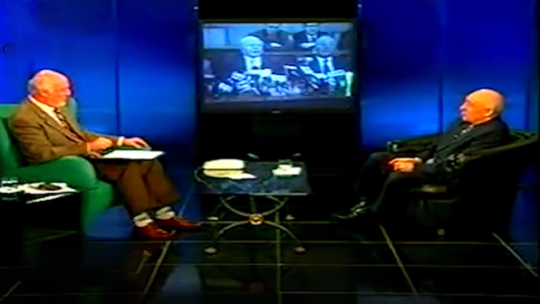
The key argument of the postmodern coup d'état: ‘You could not succeed, now leave’
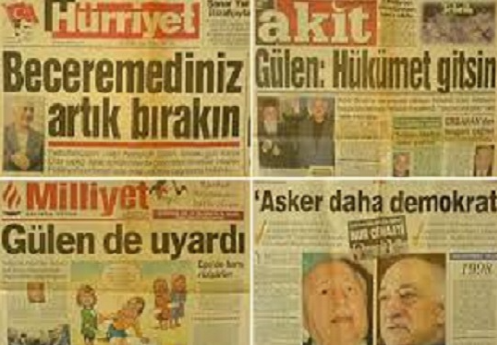
Fetullah Gülen was another actor who supported Welfare-way, the postmodern coup that came from power with the supremacy of the secular-Kemalist and the legitimacy of the coup. Gülen, the ringleader of the treacherous group that greeted the military responsible for the coup in 1980 and praised the army through the Sızıntı magazine, once again took a stand on the side of the military in the process of February 28th. Gülen, during a television program that he participated in during the coup period, targeted Prime Minister Erbakan by saying “You could not succeed, now leave” and insinuated that he should resign. The following day, the media wing of the coup quoted Gülen on the front page. Gülen stated that there could be a new election or a resignation, as he was in favor of the army with what he said. Speaking about the NSC’s February 28 resolutions, Gülen said, "If the NSC is making a mistake, it is a mistake made during consultation. If they make a mistake, they receive one reward and if they do the right thing they earn two rewards.” According to the so-called preacher Gülen, Erbakan, who said, "We cannot compromise with him," was doing harmful things related to Islam. The other groups Gülen believed to be harming Islam were the Hamas Movement, a symbol of resistance to Israeli occupation, and the Ihvan Movement, a large base in the Islamic world.
'Good luck' Zaman and direct contact with TAF
>
Gülen's Zaman newspaper, which was formed after the February 28 coup which resulted in the resignation of Erbakan, took the political position by writing the headline ‘Good Luck’. On February 28, Gülen, who was an active name and wrote a letter to the 2nd Chief of General Staff Çevik Bir who coordinated the coup speeches of the cartel media, stated that the schools were referred to by his name "mistakenly" in the context of the situation. In Gülen’s letter, he said, “If these schools, which operate connected to the Turkish education system, are running activities contrary to the secular, independent and social state of law of the state of the Republic of Turkey in these schools, then as someone who encouraged the establishment of these schools I will encourage their closure,” regarding the state of the schools.
Gülen, who met with Pope II Jean Paul on February 9, 1998, was greeted as if he was a senior official. Gülen’s alleged reason behind the visit was to take important steps regarding interfaith dialogue. When the religious exploiter Gülen and his team met with the Pope for 30 minutes, Alaattin Kaya's closest ally to Gülen was discussed for many years in the Turkish public opinion.
Vatican visit and interfaith dialogue
Gülen met with New York Cardinal John O'Connor, one of the most important cardinals of the Catholic world, in New York in September 1997. O'Connor, known as the right-wing of the Pope, is said to have praised Gülen's ideas about religious dialogue. The background of the process of Gülen's interview with O'Connor in New York is quite interesting.

The interview before the Vatican visit also had a critical prescription. Regarding the smiley meeting, Gülen said, "We get along very well with the Jewish community. I also saw Bartalemous. After our conversation, Bartalemous told us that he went to the US and then we had the opportunity to meet the Cardinal (O'Connor)." Gülen also said that he saw the Jewish community in the US and that the Jewish community in the US supported him with, "we will support the schools you will open in the US".
-
Fetullah Gülen said in 1998 that he wrote a letter to Hillary Clinton, the wife of US President Bill Clinton and presidential candidate of the 2016 US presidential election, in the program titled The High Point (Püf Noktasi) by NTV, a program presented by Taha Akyol and Cengiz Çandar. Gülen explained that he also wrote a reply letter to Hillary Clinton and sent some gifts.

Gülen, who tried to show himself differently from the other groups by establishing himself and establishing parallelism with the close relationship he established with the groups in the US, was invited to Rome in 1993 with the help of the Vatican Representative George Marovic. Gülen, said that Marovic worked very hard to organize the visit. The terrorist ringleader Gülen, who stated that the invitation came from the Vatican, said that it would be disrespectful to the Pope to not attend, and said the following when asked about which identity he went with and received criticism and questions: "I made the visit as a citizen. Everyone can go and see him." Gülen, regarding the visit to the Vatican, said the following: "the state had heard about this. Foreign Minister Ismail Cem was informed of my meeting with the Cardinal. Before I went to the Vatican I went to Ecevit's house and told him I would go to the Vatican, and he responded very positively." During the Vatican visit, a high level welcome was given to Gülen at the airport. Gülen said in a statement that he later made an interview that Ecevit made for himself: "Before we traveled to the Vatican to meet the Pope, the late Bülent Ecevit called the envoy there and said, ‘They are my dear guests, take good care of them and do what you can to ensure the meeting takes place.
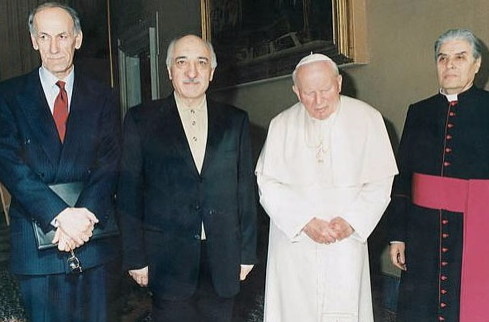
Gülen, who met with Pope II Jean Paul on February 9, 1998 was greeted as if he was a senior high-ranking official. Gülen referred to the visit as an important step for the interfaith dialogue. When the so-called preacher Gülen and his team held a 30-minute conversation with the Pope, Alaattin Kaya, one of the closest names to Gülen, kissed the Pope's hand.

"I would want to die in the Holy Land of the Vatican"
Gülen recommended three proposals to Pope II Jean Paul during their meeting. The first was a reminder that the President Süleyman Demirel had invited the Pope to Turkey, the second was to establish an independent university in Haran for three religions (Islam, Judaism and Christianity) and the third recommendation was a proposal regarding Jerusalem. The religion-exploiter Gülen also told the Pope that if he is willing to visit Jerusalem, the Palestinian President would meet with Arafat and Diyanet authorities and make an effort to make it happen. Gülen, who has a separate hypocrisy in each area, later went on to say, "I had dreamed of dying in the Holy Land of the Vatican. Gülen also noted that he wrote a letter and that all of this was handed to both the Pope and the consul.
While there was great debate in Turkey after Gülen's meeting with the Pope, Gülen's dialogue with the West further improved. Gülen continued his close relationship with the Western world after he ran away to the United States in 1999.
Undoubtedly, as reflected in the reports, the most intense structure of the Gülenists was set up in the Police Department. Structures within this institution, which they considered as an alternative power to the TAF, opened the way for them to infiltrate other institutions of the state.
"F Type" structure in the police force
Gülen's supporters started their activities in the field of police in line with their strategic goals they had set in the 1980’s and by 1986 a significant number of names had entered the organization. Gülen, the chief actor of the betrayal network, personally coordinated the leaks at the meetings he held in Altunizade. Many important meetings were held in this center before his escape to the US. According to Latif Erdogan, military members and officers were also among the names he saw during this period. Stating that the FEM building in Altunizade was designed according to these negotiations, Latif Erdoğan stated that he had built a floor (5th floor) that Gülen designed specifically for meetings. Latif Erdogan, who noted that those who came to attend the meetings generally used code names, said their real names are only known by Gülen.
The Gülen organization in the state is recognized
On the other hand, many government agencies and bureaucrats have prepared reports on the infiltration activities of the Gülens. However, the reports in question were not taken into account by political elites, or were underestimated in various ways. In these reports, it is clear that the Gülen leadership organization had been beginning to organize openly since the beginning of the 1980’s, especially in the security, military, judiciary and administrative levels.
This was expressed. The main issue of the reports was the infiltration of the emniyya and the hierarchy of the organization.
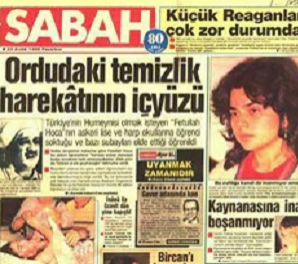
The headline news, which took place in Sabah newspaper in December of 1986, once again attracted attention. The newspaper stated that Fetullah Gülen, whom Turkey referred to as "Turkey’s Khomeini", had taken students to military high schools and military schools and reached some officers. This headline also revealed that Gülenists’ had been attempting to infiltrate many institutions, especially the TAF, since the 1980’s. But such reports in newspapers started to emerge more frequently since the beginning of the 1990’s.
Ünal Erkan, who exposed FETÖ, was removed from duty
Ünal Erkan, who decrypted FETÖ, was removed from duty. The first noteworthy development regarding FETÖ’s structure within the police force was in 1991. Unal Erkan, who was appointed by the Interior Minister Mustafa Kalemli as the General Director of Security, received complaints about the Police Academy. With an arrangement made in 1991, the first and last classes of the Police Academy were opened to students from abroad. According to a complaint from Erkan, it was stated that Gülenists had begun to come to the forefront in the appointment of police intelligence, personnel, and communication units and police schools, which was facilitated by attempts to infiltrate into the organization.
As a result of his prosecutions, he realized that in the lotteries that took place in the police force, the FETÖ organization had shifted their men to strategically important units. Unal Erkan, who initiated an investigation into the incident and set a benchmark for a widespread operation, was appointed to governor of the OHAL at a time when his operations were continuing - during the 9th month of the operation. After Erkan's departure, all of the people who had been interrogated because they were associated with Gülen returned to the police. The investigation files opened by Erkan disappeared.
First report: Gülenists are infiltrating the police force
Undoubtedly, as reflected in the reports, the most intense of the institutions infiltrated by Gülenists was the Police Department. Structures within this institution, which they thought of as an alternative power to the TAF, would also open the way for them to infiltrate other state institutions as well. Gülenists structured themselves within the police force for the first time in 1992 by the General Directorate of Police Intelligence Department Tuncer Meriç sent to the Board of Inspectors. This was emphasized in the report “Illegal activities of some members of the police force.” Gülenists especially ran various activities in Police Colleges, Police Academy and Police Schools and close to 50 percent of Ankara Police College students are in contact with Gülenists, outlined the report. It was also stated that Meriç said Kemalettin Özdemir continued to organize in accordance with the directives of Gülen in his report, and said, “the basic strategy of the organization is to come to critical points in state departments.The prepared report was sent to the prosecutor of the State Security Court, but was ignored for six years. Six years later, the removal of the 163th article meant that the allegations in the report were no longer criminal. DGM Chief Public Prosecutor Talat Şalk gave a decision on non-prosecution on the report in line with the amendments in Article 163 of 1997.
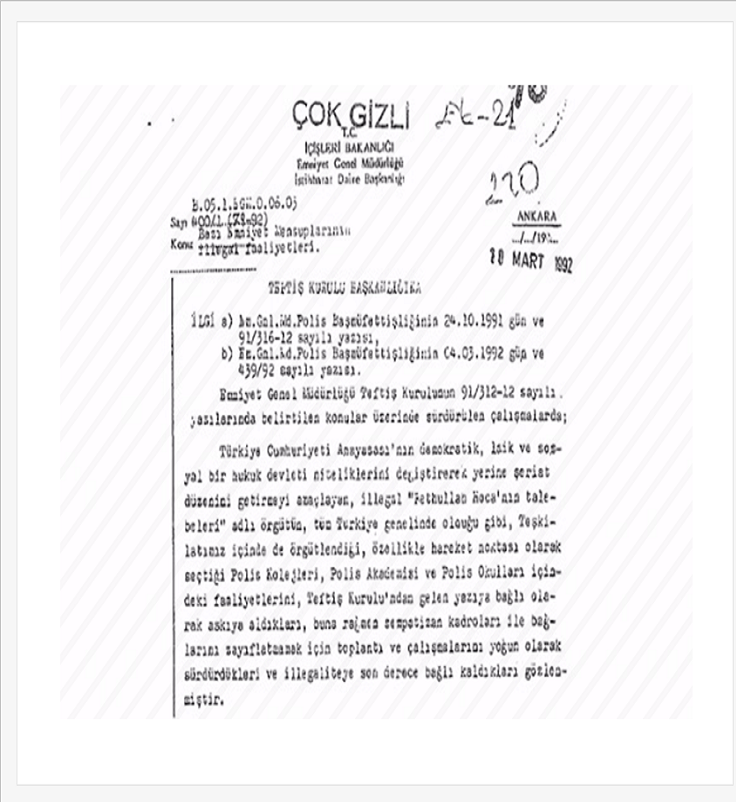
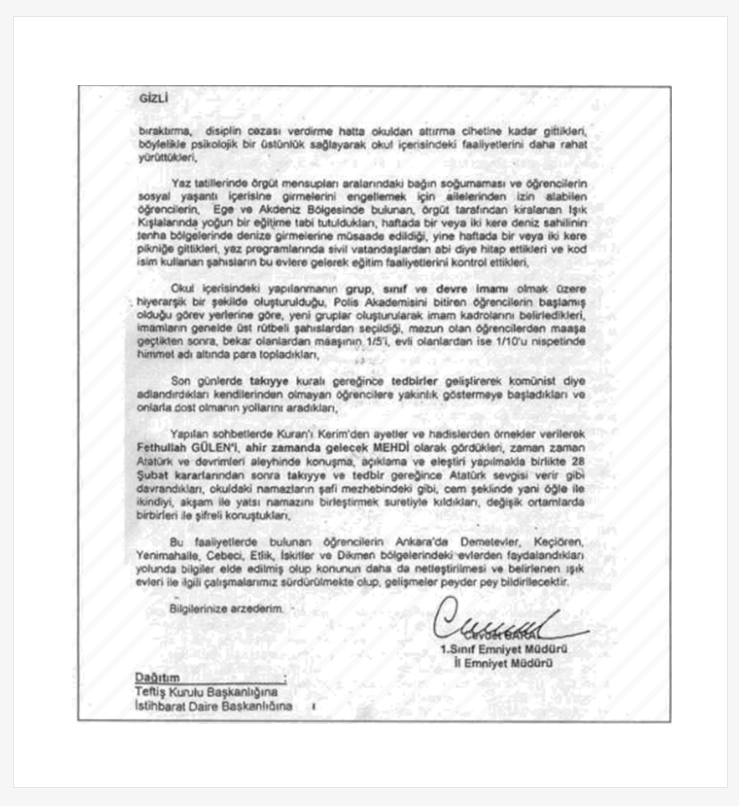
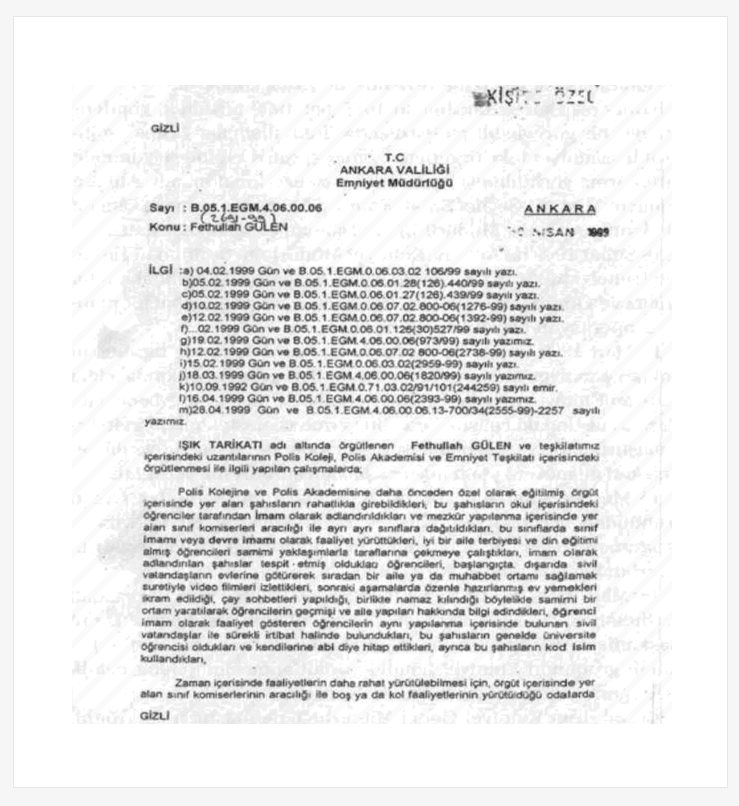
‘Gülen is targeting the top of the state’
The most staggering report about the Gülenists’ infiltration was prepared by Cevdet Saral and Osman Ak on April 16, 1999. The report, titled "Fetullah Gülen and Light Tarikat", pointed to the beginning of a new era, while the organization revealed all of the work of penetrating the institutions. Saral and his team were discharged after this report as a result of a great compromise. In the introduction part of the prepared report, the targets of the members of the organization and the attempts of infiltration were presented in detail.
In a report prepared in 2000, it was found that the attempt to infiltrate the government was launched under the name of the ‘outflow’ operation.
Saral's report stated that Gülen often used military terminology in his writings and described the allegiance to him through the phrase, "cavalry, soldier, military front, and army". The report draws attention to the fact that Gülen wrote the following in one of his books: “It has been 40-45 years since the 50’s. If those who were 10 years old during those years went to university they would be in good positions. Those who were 20 years old would be 60-65 years old, which means that they should be living at their most mature period at the level of prime ministers and presidents.” Regarding Gülen’s words, Saral said, "it is understood that he aims to take control of important positions within the state.”
'July 15' warning in 1999
In the conclusion of the second part of the report, there was a lot of chilling information pointing to today. In the report prepared by Saral and his team, it says the following: “If the necessary precautionary measures are delayed, perhaps the most serious, the most insidious, the most comprehensive and the most dangerous revolt from the Babylon revolt to the revolt between Sheikh Bedrettin and Sheikh Said will be inevitable.
On April 21, 1999, Prosecutor Nuh Mete Yuksel filed the first lawsuit against Gülenists in the framework of Saral and his team's report. Sabri Uzun prepared a report on "Fetullah Gülen Group" on May 5, 1999. In the report, it was alleged that the Intelligence Office prepared the Intelligence Bulletin in July 1998 in the light of the evaluations in the book entitled "Sectarian Order and Religious Movements in Islam" prepared in 1996 and in light of these evaluations. The report emphasized the activities of the Gülenists, the biggest religious "congregation" in Turkey, and provided information on school, media, finance, hierarchical structure and places where they receive support.
Other reports on the Gülenists are known as the works of July 12, 1999 and August 16, 1999 prepared by Mustafa Aydin, Head of Intelligence Department of General Directorate of Security. Aydin, Ankara DGM Chief Public Prosecutor's Office reporting on the activities of the Gülenists and 'imams' was giving information. In a letter dated July 12, 1999, Mustafa Aydin stated that Fetullah
Gülen was encouraging his supporters to organize amongst themselves in state institutions,especially property and courthouse, in order to reach their goals. The second report prepared by Mustafa Aydın on August 16, 1999 included the activities of Gülenists in the country as a whole. Individuals who have been named in the consultation board established by the Gülenists were written one by one. Among these names listed included Mehmet Çelikel and Ahmet Ak as the members of the group, as well as Muhammer Ihsan Kalkavan, Latif Erdoğan, Ali Rıza Tanrısever, Orhan Özokur, Naci Tosun, Nevzat Ayvacı, Şaban Gülbahar, Mehmet Deniz Katırcı, İsmail Büyükçelebi, İlhan İşbilen and Mehmet Erdoğan Tüzün. Gülenists’ many activities in Turkey on many secret activities carried out the report was sent to Ankara DGM Chief Public Prosecutor Noah Mete Yüksel.
In October 2000, Muzaffer Erkan, Head of the Intelligence Department of the General Directorate of Security, sent a note to the Ankara 11th Criminal Court titled the "National General Activities of Fetullah Gülen Group". The memorandum highlighted the financial footing of the Gülenists’ general organization in Turkey. The study, which included extensive information on companies, foundations, schools and dormitories, which were close to the Gülenists, was sent to the DGM Chief Public Prosecutor's Office. In particular, information notes about company and school administrators were included in the note that emphasized the educational structure of Gülenists.
Gülenists in the TAF
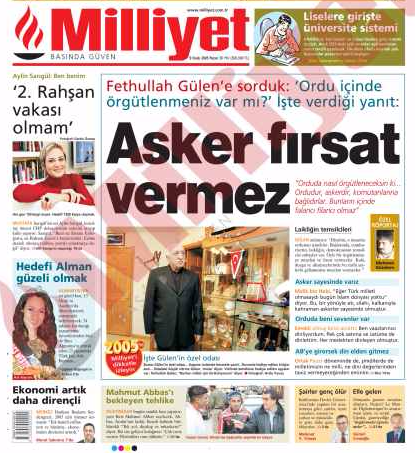
Another article prepared at the beginning of the year 2000 carried the signature of the Deputy Chief of Police, Ramazan Er, on 13 October 2000. The DGM Chief Public Prosecutor's Office sent information about the structure, organization, objectives, strategy and quality of Gülenists in Turkey and abroad. In the report, the Gülenists’ early 1980's ‘outflow ‘huruç' under the name of an attempt to infiltrate the state was reported. While the youth was targeted in the framework of Gülen's strategy, it was stated that Gülen's activities were carried out through legal-looking institutions and organizations, while these young people were said to have been gained for structuring. The report emphasized that the so-called preacher Gülen wanted to provide power over these young people whom he described as 'the Golden Generation'.
In Gülen’s article series titled "11 days with Fetullah Gülen" where he spoke to Milliyet newspaper’s Mehmet Gündem that was published by Milliyet newspaper in 2005, said striking statements about the army and the constitution of security. Gülen responded to the question, “Are there those who love you within the military?” Gulen answered, “There may be those who love me in some sectors. Someone had once explained something to me. There was someone who was retired and we came across each other somewhere. He said, ‘I listen to your sermons. I made my inferiors and superiors listen to them, too.’”

In 2005, Sabri Uzun, the head of the Intelligence Department during the period, stated that for the first time he understood that a team had begun to be built within the state. In 2009, Uzun sent a letter to Haber Türk Newspaper writer Fatih Altaylı, pointing to the structuring of the Gülenists within the state and talking about the existence of a large Gülen team in the police force, giving information about 'Ergenekon' names and anonymous letters.
Gülen's first case and escape to 'Motherland America'
Cevdet Saral and Osman Ak in the light of the report titled "Fetullah Gülen and Light Tarikatı" dated April 16, 1999 launched a court case against him . On the 21st of April, the first case against Gülen and the structure he founded was opened. Ankara State Security Court Prosecutor Nuh Mete Yüksel wanted to investigate the illegal structuring of the Gülenists in the state. Osman Ak, who prepared the report, made the first comparison of the Gülenists to the ‘Hashhashin.’ Initiatives aimed at the team and prosecutor Nuh Mete Yüksel, who prepared the report together with the trial of Gülen, also started immediately. Shortly after the report came out on April 16, a wiretapped scandal broke out that would shake the agenda.
The first case was battled with a ‘wiretap scandal’ and cassette plot
In the last days of April 1999, the newspapers were all covering the "wiretap" news. According to these reports, the Çankaya Palace, General Staff, Prime Ministry, ministries, general offices of political parties, politicians and journalists were being listened to from the 8th floor of the Ankara Security Directorate. According to the correspondents, Ankara Security Director Cevdet Saral and Assistant Manager responsible for incoming intel Osman Ak were heading the "8th Floor Gang".
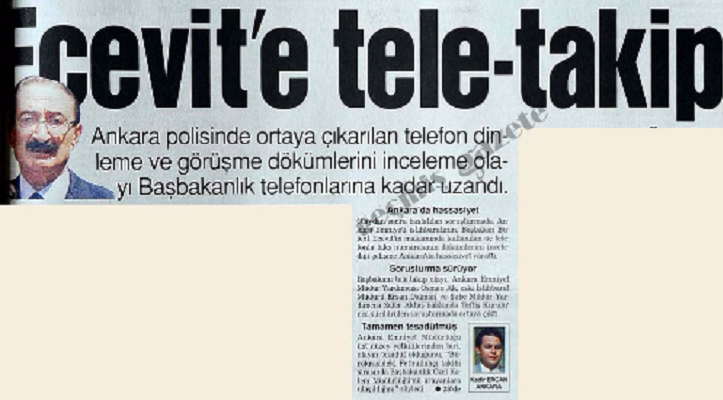
After the news, Cevdet Saral, assistant Osman Ak, Ankara Intelligence Branch Director Ersan Dalman and his assistant Zafer Aktas, were among 34 personnel who were discharged. These names have not been brought to more important tasks. Sarar and 38 various members of the disciplinary punishment was given to the police. The DGM Prosecutor, Noah Mete Yüksel, who sued Gülen and targeted the security structure, was also on target. Yüksel ordered the Gülenists’ strategy in the indictment of the "Fetullah Gülen Organization" that he had prepared: "To create a base composed of young people trained by using foundations, schools and classrooms in the world and to be staffed in all bureaucrats, in the Ministry of National Education and Security Organization." Gülenists’ infiltration of the police force and other institutions was the step before infiltrating and strengthening their structure in the TAF.
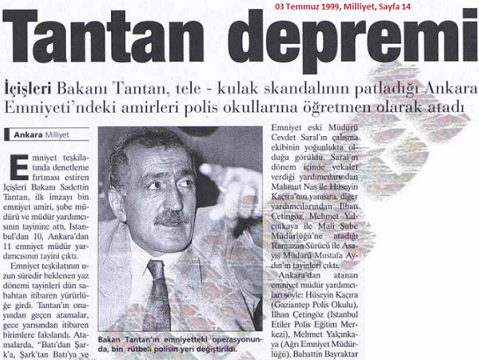
Yüksel stated that Fethullah Gülen is the leader of a terrorist organization in the indictment he prepared in 2000 and he made a statement about the Gülenists saying, "This method and structuring plans to come into a position to have a say in TAF within 10 years"
While Gülen settled here in 1999 in an escape to the US, cassettes about prosecutor Nuh Mete Yüksel appeared. Yüksel left the office shortly afterwards, and this case was also submerged. The terrorist ringleader, Gülen, rejected all the accusations he made in America. In Turkey, the Ankara 11th High Criminal Court of the Anti-Terrorism Act, according to the provision of a criminal Gülen was acquitted.
Fugitive Gülen applied for a permanent residence permit in the US in this process. In November 2006, a permanent work called "I-140" applied for a "foreign worker / employee" visa, after the applicants in various visa categories in the US were rejected. In order to be able to find this application, it was necessary to be an exceptionally successful professor or researcher or to be a qualified worker. The American Home Security Ministry rejected Gülen's appeal on November 19. On June 4, 2008, 30 different reference letters were applied to the court in order to obtain a residence permit. Among the writers of the reference letter were CIA officials as well as American academics and important advocates of dialogue between religions.
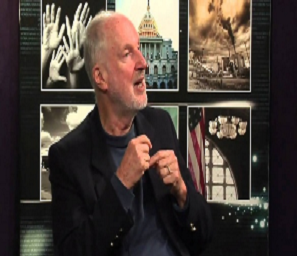
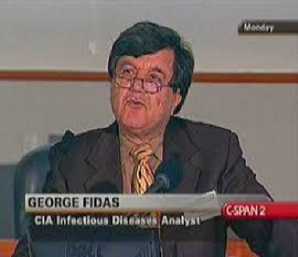
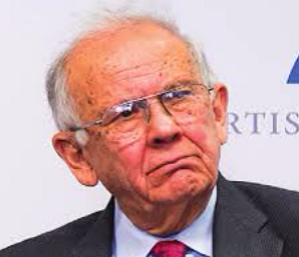
The most notable ones were George Fides, CIA Central Intelligence Analysis Director, Graham Fuller, a member of the US Intelligence Council, and Morton Abramowitz, a former ambassador to the U.S. who had served in Ankara. Former American CIA officials and academics have written letters of reference to Gülen schools and Gülen's work on inter-faith dialogue. Gülen's lawyer, in the course of the case, had the thesis that his client would get a residence permit "for the benefit of the United States". Ultimately, on July 16, 2008, the Court of Appeals rejected the appeals of the Ministry of Homeland Security and opened the door to permanent visa for Gülen, his ringleader saying that he "has the right to residence as a political and religious scientist".
Outflow operation: The dream of taking over the state and Gülen
When it came to 2000 years, Gülenists established a powerful staff within the state. Gülen began to realize the dream that he had established in the 1960’s from the end of the 1970’s, and in 2000 these Gülen-affiliated staff members started to become visible. Staff were located in strategic areas such as the army, municipality-law, safety, educational institutions, business world and non-governmental organizations.
Gülen, who was a religion exploiter during debates surrounding radical Islam, the September 11 attacks, and when Islamophobia was at a peak, gained the identity of a 'moderate preacher' who has gained more importance with messages of dialogue.
Gülen achieved a great success on this road map built on an educated generation. When the media and financial resources under Gülen's control were added to the strong structure that he had established, the 2000’s were closer to Gülen’s goal that he wanted to achieve. Despite all this, Gülen did not have the absolute power yet. Gülen remained on the rise both domestically and internationally, albeit in the USA, far from Turkey. Thanks to the schools, associations and foundations that Gülen had opened, he also increased his influence abroad. Now Gülen's messages about dialogue and peace between religions reached many points. Gülen was in favor of the image of a preacher who had to abandon his country because he was under pressure despite his moderate name. This image of Gülen influenced both his supporters and those who followed him internationally.Gülen, in a period of radical Islam debates and when Islamophobia was very widespread, which he had experienced on September 11, gained more importance through his messages of dialogue and became a 'moderate preacher' with great tolerance. Gülen gave moderate Islamic messages to the West in Pennsylvania, where he ended up after his initial beginning in Kestanepazarı, İzmir. Gülen, whose ideas began to be adopted in Western countries, began to present himself as a representative of Islamic society and a 'harmonious partner' in his messages to the West. This has made Gülen and Gülen schools more prominent in the international arena.
Turkish Olympics

One of the most important propaganda activities of the Gülenists in recent years is the Turkish Olympics which has been held since 2003. These Olympic Games, which give a message of so-called tolerance and dialogue to the world through foreign students who have been educated in schools and other institutions turned into an important propaganda tool. The first Olympics Games held in Turkey, was in 2003 with the participation of 17 other countries. The last was held in 2013. Students who were brought to Turkey in the framework of the Olympics were reading Turkish songs and poetry, showed folk dances. In this framework, Gülen schools abroad were showing Turkish language training.It was the Olympics that offered the opportunity to introduce the most important meaningful activities for the organization. Thus, universal messages were given over "songs and poems" both in Turkey and abroad, and a strong support was provided on the international scene through it. Another distinguishing feature of the Olympics was the opportunity to communicate with politics, business, sports, media, NGOs, the world of celebrities and many other groups through the students brought to Turkey. The organization received great support from the Olympics, especially by close contact with politics, the business world and bureaucracy. Many politicians and bureaucrats attended the Olympics and witnessed the activities of their members.Again, Gülenists brought students from abroad to many important cities, especially in the business world. Thus, it provided more financial support for schools and other organizations both in Turkey and abroad.
Through weeks of propaganda and publicity work over the media, it has become possible to reach more people and support. In the Olympics where names from the world of art, media and sports were held as juries, the teachings and messages of the fugitive Gülen were especially featured and they showed respect and love to Gülen. Thus, propaganda of the Gülen schools and activities was being carried out through famous names participating in the program. These Olympic Games, which were held in Turkey until 2013, were going on under the name of International Language and Culture Festival in countries such as Germany and USA from 2014 onwards.
AK Party Period: Struggle with tutelage and discussions on secularism
At the beginning of the year 2000, there was a big crisis in socio-economics in Turkey. The coalition government's failed policies had imprisoned the country in a large set of problems. By winning the general elections held in November 2002, the ruling Justice and Development Party (AK Party) received great support from the people. Recep Tayyip Erdoğan, Abdullah Gül, Bulent Arinc and his friends started a new era in the Milli Görüş tradition. After the AK Party came to power, it initiated a strong revision and reform process to overcome the problems Turkey had with its policies. As Turkey entered the recovery period in a short period of time, foreign policy was in the process of re-approaching with the EU. Turkey had undertaken significant reforms in the direction of EU membership negotiations. Thus, under Erdoğan's leadership in the AK Party, significant steps were taken to alleviate the economic crisis in Turkey.
However, the tensions that lived in Turkey in the political arena, the continuing effect of February 28, the debates on fundamentalism, the tutelage of the army and the judiciary and the discussion of secularism attracted Turkey's inferior discussions. Before the 2002 elections, Erdoğan was brought against the politics, while the leader of the party, 10 days before the elections, was sued by the Supreme Court of Appeals Chief Prosecutor, Sabih Kanadoğlu, for the reason that he violated the Political Parties Law. The fact that the AK Party, which won the 2002 elections, came from the tradition of the Milli Görüş and the conservative formation - the AK Party - defined itself as a conservative democrat - was disturbing the secular sector in Turkey. While the judiciary and the military referred to themselves as the guardian of secularism, they also saw themselves as the judge who decides who is secular, anti-secular or otherwise. This led to the establishment of direct tutelage on the political establishment. Along with the interception of the media in this process, two different blocs emerged on the axis of secularism controversy: the ruling party, which is accused
of anti-secular actions and constantly criticized, and the secularists who saw secularism as a red line. The debate between the two blocs led to the creation of new crisis areas in the post-2002 period.The AK Party has gone through a major change both in domestic politics and foreign policy. While they were carrying out reforms inside, they set out to pursue a multifaceted policy externally. Negotiations that started for EU membership in this period also affected this domestic and foreign policy discourse. This led to a new field of combat with the focus of tutelage inside. The steps taken in the direction of democratization and the reforms that have taken place have led to an important transformation towards guardianship institutions. The impact of the start of EU accession negotiations and reforms in the areas of power, civil-military relations, the state of the judiciary, and freedom of the press have all been attempted to be realized. However, the attitude of the army-judiciary and the media in this process further exacerbated the debate in Turkey. In this process, Gülenists evaluated the secularism debate between power and the Kemalist-secular bloc as a new opportunity. Adding to the insecurity of the ruling party against secular killing, the scope of the campaign further expanded. Gülenists started to increase the current staffing in the state even more.
In this period, the AK Party tried to break the guardianship of the army-judiciary and the media. The re-approaching with the EU provided EU support for reforms in Turkey. Thus, the ruling party provided strong external support for fighting guardianship. Reform studies were carried out to reform the judiciary and reorganize civil-power relations. The caretakers of the gentlemen in the state and bureaucracy used this struggle and reform movement as a new possibility. Especially when it came to 2007, developments such as the new threats on power, 27 April e-memorandum, Republic rallies caused new troubles to appear inside. In this case, the two segments were brought closer together.
Two large murders
A shocking murder took place during the period when secularism debates were on the agenda in Turkey. Alparslan Arslan, who entered with the the Council of State on May 17, 2006 as a lawyer, killed Mustafa Yücel Özbilgin, the second member of the Council of State, and injured four members, including the head of the department Mustafa Birden. After the attack, the attacker who escaped from the scene allegedly said, "I am a soldier of Allah. Allah is the greatest." The assassination of the Council of State and the alleged words of the attacker increased the tension further. The attack was intended to send a religious message.On January 19, 2007, Hrant Dink, the general editor of the Agos newspaper, was killed. The appearance of the murder committed by Ogün Samast was that the attack was committed within a nationalist motif. Samast's photographs from that period, captured in Samsun, also sent a nationalist attack image. In the investigation launched around the incident, it could not be discovered who was behind the murder committed, as it was only found that Samast was linked to Erhan Tuncel.
Cumhuriyet Meetings and April 27 e-memorandum
Another prominent development of this process was the 2007 presidential elections. Before the elections, discussions on secularism in Turkey flared up. In this environment, politics became increasingly polarized and the threat perception of power increased. Before the presidential elections, there were discussions about who the AK Party's presidential candidate would be, and in April and May the Republican rallies against the possible candidacy of Prime Minister Erdoğan or other AK Party names were held. Those who participated in the rallies practically demanded for a coup d'etat from the army by calling out "The army on duty!"
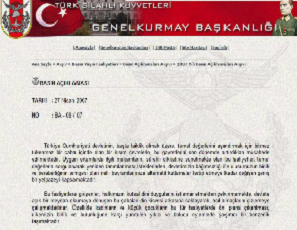
Claiming that the CHP could not elect a new president during that period, Chief of Staff Yaşar Büyükanıt demanded an early election and said the following regarding the presidential election: "I hope a president who values the fundamental values of the Republic, the state's unitary structure and the secular democratic state not in words but in actions and essence will be elected." The statement was a clear threat to the ruling party. The subject at the center of the discussions was that the President's wife could not wear a headscarf. In April, when the Republican rallies continued, some groups were called into the streets to defend secularism. On April 27, the threat increased further. In the statement made on the official website of the General Staff, some of the developments before the presidential candidate process were listed as threats and it was stated that this should be considered as a regime challenge. It was stated that the Turkish Armed Forces would not hesitate to use the duties and authorities of the law.
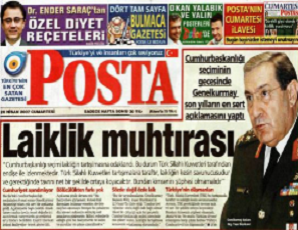
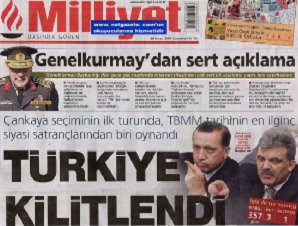
While the reaction of the government's declaration was tough, it was known that Chief of General Staff Hilmi Ozkok was attached to the Prime Minister. Shortly after the announcement, the AK Party's candidate for president Abdullah Gul was announced. On May 27, 2007 the appeal made by the CHP to the Constitutional Court on May 1, 2007 was justified and the 1st round of the presidential elections was cancelled due to the fact that 367, the number of the meeting, was not reached in the first round of the presidential election. Upon these developments, Prime Minister Recep Tayyip Erdoğan announced that early elections would be held. On July 22, 2007, the elections were held early and the AK Party received 46 percent of the votes. The presidential election was held on August 29, as the AK Party eliminated the reactions and threats from the military and secular sectors as a result of early elections. Abdullah Gul was elected as the 11th President after the vote in Parliament. Thus, secularism and headscarf disputes and threats of memorandum tensed the environment and the tutelage formed was overcome.
"411 hands were raised for chaos"
During this period, the AK Party's aim was to reorganize the civil-military relations and to establish a democratic platform. The AK Party wanted to do various reforms for this, so it wanted to remove the influence of the military on politics. The AKP has encountered many problems while taking steps to normalize in the country. As part of the reform efforts, steps were taken to liberate the headscarf in universities. During this period, when the secularism and headscarf debates were at its peak, the CHP was reacting harshly, while the Constitutional package passed by the AKP and the MHP. After the parliament's headscarf decision, Hürriyet newspaper quoted "411 hands were raised for chaos", claiming that the headscarf was a cause of polarization.
The information and documents related to the investigation that Öz initiated regarding the coup plot were widely covered by Gülen's media.
Shortly after the objection of the AK Party's headscarf by the secularist faction, the Supreme Court of Appeals Chief Prosecutor Abdurrahman Yalçınkaya demanded that the AK Party be closed down on charges of "becoming the center of acts contrary to secularism". Yalçınkaya demanded 71 people, including that the prime minister at the time Recep Tayyip Erdoğan and President Abdullah Gül, were removed from politics for a period of five years. The ruling on the indictment submitted to the Constitutional Court on March 14, 2008 was announced on July 30th. It was decided that the AK Party will not close, but it will be cut off by a portion of the financial aid it was receiving from the treasury.
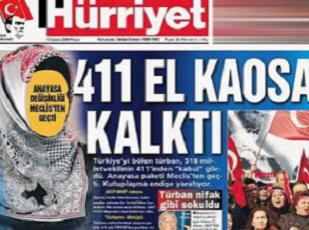
In the period when the military was called to takeover, secularism debates were everywhere and the case to shut down the AK Party was opened, Gülenists’ put forward their stance and did not take a side on the headscarf debate. The Gülenist Zaman newspaper ran the headline “AK Party’s surprise lawsuit” following the case to shut down the political party. The Zaman newspaper only included the EU and the US reactions to the case and gave the message that it was out of the secularism debate. The Gülenists provided support for their efforts to move the AK Party's civil-military relations to a democratic level and to reform the judiciary. While the government tried to build a new structure based on a democratic ground by breaking the guardianship, the Gülenists tried to benefit from these reforms. Since the 1990’s, the organization, which has established an alternative staff against the Kemalist castle in many state institutions, especially in the police force and the judiciary, and used its opportunities to further deepen and expand its staff in its possession and has made an important breakthrough since 2008.
The prosecutors and the organization that conducted the case turned it into an instrument of reckoning with the groups in the meeting of the Ergenekon case.
The state is the Gülenists’: Ergenekon-Balyoz-KCK
The army, which saw itself as the guardian of the Republic in Turkey, took over the elections since 1960, based on arguments such as 'secularism, regime, internal problems and fundamentalism'. For many years, the army saw the so-called 'right to re-establish a deteriorated state'. The army, which devastated the post on February 28 with a post-modern coup d'état, came to the forefront in the internal debates that lived in the post-2002 period.
Though inside discussions, Republic rallies, presidential elections, party closures and other crises continued, threats of a coup against democracy and power rose rapidly. Prime Ministry Under secretariat of the first period of the AK Party government that Omer Dincer, said, "In that period we had meetings every week there, we constantly received information saying an insurrection was being prepared, or there was a threat.” According to Dinçer, there was serious evidence that there would be a blow in 2004, 2007-2008. This was confirmed by the evidence that emerged during the Ergenekon investigations. The most important of this evidence was undoubtedly Sarıkız, which emerged within the framework
of the Ergenekon investigation,It was a coup plot called Moonlight and Sea Sparkle.Özden Örnek’s plans regarding Ergenekon and in its structure were revealed in his daily planner. Ergenekon, the majority of whom were retired, made plans to overthrow the government with coup plans prepared in 2003-2004, 2007 and 2008. MIT's report on this issue confirmed this claim. Among them, Özden Örnek, Muzaffer Tekin, Veli Küçük, Hurşit Tolon, Şener Eruygur were also important figures of Ergenekon.Many names were taken into custody after the operations that started after the presence of weapons in Ümraniye in June 2007. During operations Ergenekon related information and documents were seized. Operations continued until 2009. It was stated that Ergenekon was a secret organization organized within the state and that his goals were to overthrow the government. In this context, a case was filed in 2008, claiming that Ergenekon planned a number of attacks such as the Council of State murder and the Zirve Publishing Massacre.
FETÖ’s power within the judiciary came into play
Especially the details that came out with 'blow logs' revealed the aims and goals of the organization. In response to plans to overthrow the government, the AKP tried to break the existing tutelage in the current system, while struggling with these threats on the one hand democracy and power on the other hand. One of the most important institutions of this struggle for an elected government was the judiciary. The ruling AK Party has also waited for the judicial process to be launched in order to investigate the allegations of the coup in the light of the law. On July 25, 2008, Ergenekon cases started with the acceptance of the indictments prepared by Zekeriya Oz, Mehmet Ali Pekgüzel and Nihat Taşkın.
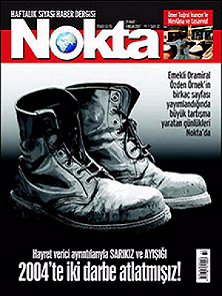
Zekeriya Oz and other names continued to investigate the case in the Special Authorized Courts, and over the course of time they expanded the case further. Coup allegations related to new names were taken into custody. In this process, the information and documents related to the investigation that Ozun initiated on the coup plot were given a wide space in Gülen's media. The Action and Spot magazines and the Zaman newspaper, as well as the Milky Way TV and the Taraf newspaper, came to the forefront as Gülenist media organizations that brought these documents to the agenda.
The Ergenekon lawsuit was expanded over time and many names were taken into custody and arrested as suspects. In this process, while the government supported the operations carried out within the scope of the Ergenekon case, it aimed to reveal this illegal organization in the state. However, the prosecutors and the Gülenist organization that led the case turned into an instrument of reckoning with the groups in the meeting of the Ergenekon case. In the Ergenekon case, many names who served in the army as well as the names of these organizations were discharged. Thus, some of the FETÖ troops in the Turkish Armed Forces had their path cleared for them to advance.
Gülenists, who expanded operational reception within the framework of security-judiciary cooperation, went on the path of reckoning with those who were not themselves or somehow welcomed after 2010.
Another important operation during the Ergenekon case was against the KCK. Within the framework of the KCK operations launched on April 14, 2009, many people close to the terrorist organization PKK were taken into custody. In the framework of operations, 562 people were detained, while 403 were arrested. The terrorist organization PKK leader Abdullah Ocalan's instructions with established KCK investigations by the mayors among the names who have been detained, and politicians took place names directly linked to the PKK. If the date of the KCK operations is important, the solution of the Kurdish problem was to have the MIT in charge of the terrorist organization PKK to release its weapons and to meet the same turn with the PKK's European governor Sabri Ok. In this period, the Gülen media kept the Ergenekon and KCK cases on the agenda and continued to target many sections. In addition to the names that have been named in Ergenekon, different titles have continued to be included in internet sites and newspapers during this period. Anonymous letters of denial, files and CDs were used to produce new evidence, and prosecutors called for a relative evidence. Generals and officers serving in the TSK in connection with these issues in newspaper reports and headlines have been accused of providing support to the coup plot and were targeted.
Taraf newspaper: Sledgehammer coup plan
The Taraf newspaper, which was on the agenda with the publication of military documents since 2007, was staged in this period with a new coup file. In the news of the January 20, 2010 Taraf newspaper, it was claimed that there was a new coup plan called 'Sledgehammer coup plan'. "Taraf newspaper obtained the 2003 coup plan of cunta 1st Army Commander Çetin Doğan’s coup plans,” was the article and it was given the headline "Fatih Mosque was going to be bombed.” The article, "According to the action plan dated 2003, those with the codenames Beard and bedsheets were going to organize a bomb attack at Fatih and Beyazit mosques on a Friday to cause a panicked coup environment,” the article said.
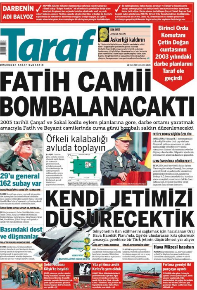
Mehmet Baransu, Yildiray Oğur and Yasemin Çongar signed off on the article 'Sledgehammer Operation Plan' and details were given. This file set the ground for the Sledgehammer case. Mehmet Baransu handed over documents to the prosecutor's office with a suitcase. Having played a major role in the emergence of the Sledgehammer case, the Taraf newspaper played a major role in the beginning of the Sledgehammer case, which would also affect the course of the Ergenekon case. In this period, Baransu shared his pictures with his suitcases and did not explain where he got the documents. Later on, he said that his former wife, Baransu, received documents from Tuncay Opçin, who is among Gülen's men. Tuncay Opçin escaped to America after this statement. The commanders of the Sledgehammer convicted Baransu of the documents he received from Military Prosecutor Bülent Münger, who searched the documents of the Cosmic Chamber.

Baransu handed over his documents to the prosecutor's office on January 30, 2010 after the news published in Taraf newspaper and Sledgehammer case started. Mehmet Berk, Bilal Bayraktar and Ali Haydar were appointed to the file. The case began on June 19, 2010 at the Istanbul 10th High Criminal Court. The court condemned 325 of the 365 defendants, including Cetin Dogan, Özden Örnek and Ibrahim Fırtına on September 21, 2012, sentenced to life on charges of aggravation" denying the power of the Republic of Turkey executive deputies to abuse or obligation." After the Constitutional Court decided in 2014 that there was a violation of rights in Sledgehammer, the case was seen again.
Cosmic Room: State secrets exposed
On December 21, 2009, two names were taken into custody in an operation in Ankara Çukurambar. It was alleged that the detained persons were soldiers and that they were the plans of the house of the Prime Minister's assistant Bulent Arınç during the period and that the soldiers had tried to swallow this note after they had been apprehended. After this event, information to assassinate Bülent Arınç took place in the media. The prosecutor, Mustafa Bilgili, who investigated the situation after a notification that he was given by telephone, wanted to call the Chiefs of Staff of the Ankara Mobilization Region 11 and 16.

On December 26, judge Kadir Kayan, the General Staff began to search the Ankara Mobilization Region Presidency. A summary and photocopies of several secret documents along with government images were received within the framework of calls that continued until January 20, 2010. The information, documents and archives kept in these rooms, known as the Cosmic Room, contained state secrets. Here, by the judge Kadir Kayan many confidential documents of 1.5 TB in size were seized. 20 days of the search results that contain information which has existed since 1970, CD, hard drive files and composed of "secret documents" was removed. These documents were sent to TÜBİTAK for settlement by a court decision after being kept in the prosecution office for 2 years. The documents and images resolved here were handed over to the public prosecutor on March 16, 2013, after being kept for 3 years, to be taken to the place prepared for Ankara Justice Department. While it was unclear where the information and documents were sent in this process, it turned out that the evidence in question was falsified in the investigation into the assassination plan. Eight soldiers were released who were arrested as part of the investigation.
While the government aimed to combat the guardianship institutions from the legitimate ways, the judiciary and the security forces began to integrate their tutelage regimes instead of the broken guardianship. With the support of officers in the Turkish Armed Forces, many names were thrown from the army with the Ergenekon and Balyoz attacks and new names came into their vacated positions. This situation caused the parallel structure to become even stronger.
Gülen's operational unit: The Judiciary and 2010 Constitutional referendum
The Ergenekon, KCK and Balyoz lawsuits gained momentum during this period. Just in the process, the AK Party decided to make some changes in the 1982 Constitution. Many changes were made in the 26-item mini-Constitution package. With the constitutional package, the Constitutional Court and the HSYK were restructuring, preparing a package to make many radical changes in the area until the decision of the Supreme Military Council (YAŞ), and the military civilian court was opened to the public. While the opposition opposed the pact in this process, the ruling party took a referendum on September 12 after the passage of the Constitutional amendment from the Assembly.
During the calls made before the September 12, 2010 referendum, many societies supported the slogan "Not enough but yes", while the opposition opposed. The radical changes, especially foreseen in the judicial sections, were received positively at the point of independence of the judiciary. With the amendment planned to be made in the HSYK structure, the HSYK members could be selected by judges and prosecutors. The constitutional referendum was also recognized by the EU as a major change. After the referendum on September 12, the constitutional amendment was accepted with 57.88%.

Interesting support from Gülen for the referendum
Gülenists were among those that gave the greatest support to the amendment of the Constitution in this process. Gülen said that the referendum to be held on September 12th was a very important step in the name of democracy in the statements made before the constitutional referendum. Gülen said, "Not only women and men, children and people of all walks of life who are dispersed to various corners of the globe, if possible, we should take those in their graves to vote ‘Yes’ in the referendum. Even those in their graves should stand up. And I believe they will get up. I also believe even the spirits will come running.” In this way, Gülen gave great support to the constitutional referendum and encouraged his supporters to also vote ‘Yes.’
The amendments made after the constitutional referendum brought significant improvements in many issues. The most important innovation among them was undoubtedly the sections related to the judiciary. With the constitutional amendments and the reforms in the judiciary,
They took over the HSYK
With the changes made in the HSYK structure, a single group of ideologists were going to try and prevent it. The election of members in institutions such as the High Council of Higher Education, the Supreme Court of Appeals and the Council of State, and the changes made in the number of AYM members, were also pioneering reforms. However, the Constitution caused the situation that happened after the change to be contrary to what was foreseen. The most beneficial of these changes were the Gülenists. The so-called congregation of Gülenists saw the constitutional amendment as a new opportunity and further strengthened their structuring within the judiciary. Gülenists, who achieved a bigger structure in the HSYK, formed a strong structure by acting together with the important points of judges and prosecutors close to them.

Cassette Operation with Politicians
The wave of operations in Turkey has gained a new dimension in 2010. On May 6, 2010, a video was published in the video-sharing site Metacafe, allegedly owned by Deniz Baykal. After the news of Habervaktim.com 's tape, which was the end of the news, there was a big earthquake in the politics area. While a ban on video broadcasting was released on the Internet and the cassette was removed from the internet, Deniz Baykal explained that the cassette was a montage and he was targeting him. Baykal said, "Those who actualize the next plot, must have done so because they were perverse, for financial gain or for blackmail or for political aspirations. This is the type of politics that is befitting of their ethics and morals.”
Baykal has vouched for Pennsylvania before
Baykal resigned shortly after the conspiracy tapes that targeted him were released. At the press conference where he announced his resignation, Baykal indicated that the Gülenists could be behind everything. "In this framework to assist those who are responsible for seeking, from America to say that I believe in the sincerity of her grief and messages of support I received from the PA would want," Baykal said.
After the Blue Marmara Incident, the real intention of the broker Gülen and the external links, especially to Israel, began to be questioned.
Before the 2011 general elections, a new cassette operation took place. This time the main goal of the operation was the senior names of the MHP. The names of the MHP's parliamentarians and Bahceli's staff were passed on to the tapes broadcasted in an elective setting. The images which started to be published on April 26, 2011 in the website "differentiability" continued until May 21. After the broadcasts, the two MHP deputies resigned from the party and deputy candidates for the 7 names and party leaders who were assigned to Bahceli. It was found that 25 of the sites that broadcast the images broadcasted from abroad and one from Turkey. Thus, in 2010, a similar attack on the CHP over cassette conspiracy was made to the MHP. While investigating the cassette conspiracy that took place for both parties, there was no result from the inquiries for many years. Investigations on cassettes have not been deepened by the prosecutors. Later, prosecutors who carried out the case turned out to be Gülenists, and investigative prosecutors were changed. The inquiry of new prosecutors from the office has won a new dimension.
Gülen's Mavi Marmara Politics Description Shake
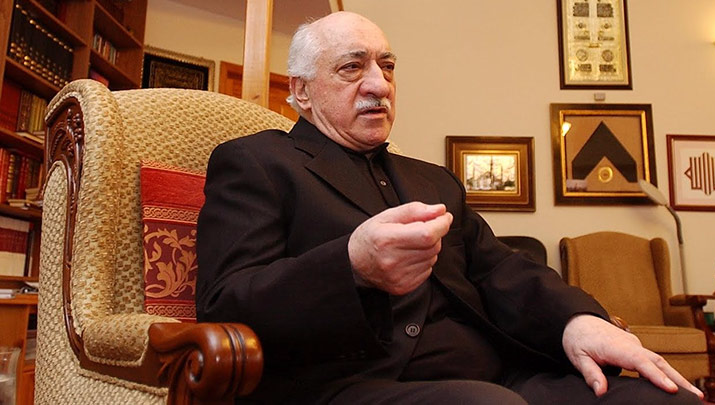
Against the embargo imposed by Israel on Gaza, the Mavi Marmara ship, which departed from Istanbul with the participation of activists from many countries around the world, was attacked by Israeli soldiers in international waters on May 31, 2010. While 9 Turkish citizens were killed in the attack, volunteers and ships in the Gaza humanitarian aid fleet were taken to the port of Ashdod by Israeli forces. While Turkey called the UN Security Council after the attack, Israel's relations with Turkey were reduced to Maslahatgüzar level and Turkey's Ambassador to Israel Oguz Celikol was recalled. After this process, there was a big break in relations between Turkey and Israel. Many people in Turkey stood against the attack of Israel. The government has decided to sanction Israel for political, economic and military sanctions.
Gülen: Mavi Marmara revolts to authority
Gülen's explanations were quite interesting, while the messages of condemnation came to Israel against attacks from various sectors, especially politics, media and NGOs. Gülen Speaking to American Wall Street Journal, June 3, 2010, "to act without the approval of Israel, is rebellion against authority," he said. After the Gülen attack, Israel said that choosing a compromise path would not have any beneficial consequences, and that a structure of their own would want to help Gaza, but that they should get Israel's permission. Gülen later told a group of journalists that the Turkish citizens who died in the Israeli attack were 'not martyred'. These statements, which Gülen are trying to justify Israel, and have gathered reactions from many people in Turkey. However, after the Mavi Marmara incident, the real intentions of Gülen and its external connections, especially to Israel, began to be questioned. The statements made by Gülen after the attack on Mavi Marmara; It was interpreted as the first step in the emergence of the dirty face of Gülen and the structure he established in Turkey.
The arrest of İlker Başbuğ means the arrest of the highest rank among the names arrested in the cases of Ergenekon, Balyoz and İnternet Andici, and at the same time caused the suspicions against the judicial cease to be voiced at the top.
'Personality of crimes' debate and the rigged game
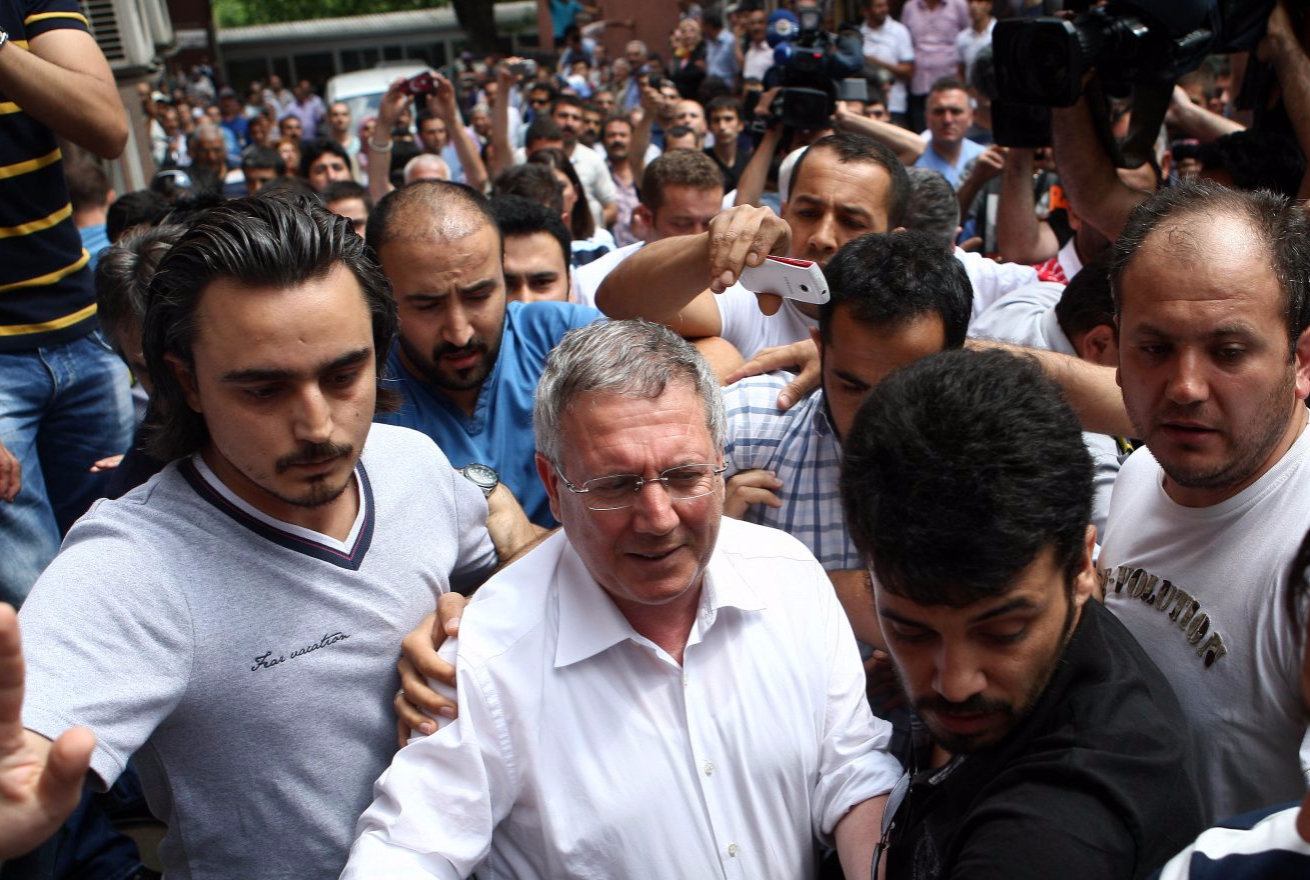
In the framework of the operations, managers such as Aziz Yıldırım, Mehmet Şekip Mosturoğlu, Mecnun Odyakmaz and Olgun Peker, along with technical directors Bülent Uygun and Tayfur Havutçu and footballer Serhat Akın were taken into custody. Aziz Yildirim was charged with 'establishing a terrorist organization and handicapping'. The AKP, CHP, MHP and BDP Group President and
In particular, the Gülen media reacted strongly to the law. The media, which advocated the quitting action and supported the operation launched by the prosecutors, received a keen attitude. In this context, Gülenists began to criticize the legislative amendment that the government planned to bring together parliamentarians with opposition parties and propagandize 'the criminals are trying to be cleared'.
It was claimed that the said design would harm the case of handicapping and Aziz Yildirim would be work to save crime operatives especially. Ergenekon and Sledgehammer in the case of the long arrests and evidence in the debate of the problem of jurisdiction is added for the first time and seen as such a clear view of the problem. The government wanted to be careful about the lengthy arrests, as it had previously been in Ergenekon, Sledgehammer and other cases, while clearing troubled areas and supporting the criminal trial process. After the Chivalry case, the government questioned the problems experienced in the field of law and questioned the purpose and the staff of the organization. The arrest of Prime Minister Basbug further increased the question marks in the mind of the government about Gülenists.
İlker Bağbuğ was arrested
The former Chief of General Staff İlker Başbuğ, who was summoned by Istanbul Republic Cihan Kansız as "suspicious" within the scope of the Internet Investigation, was arrested on charges of "being a terrorist organization manager and attempting a coup d'etat" on January 6, For the first time in Turkey, a Chief of General Staff had been arrested on charges of 'establishing a terrorist organization'. The defendants on the internet sites subject to the case were allegedly reporting that Primer Başbuğ was operating within the information. Cihan Kansız gave 7-hour testimony, Basbug, was arrested by the court sent to prison.
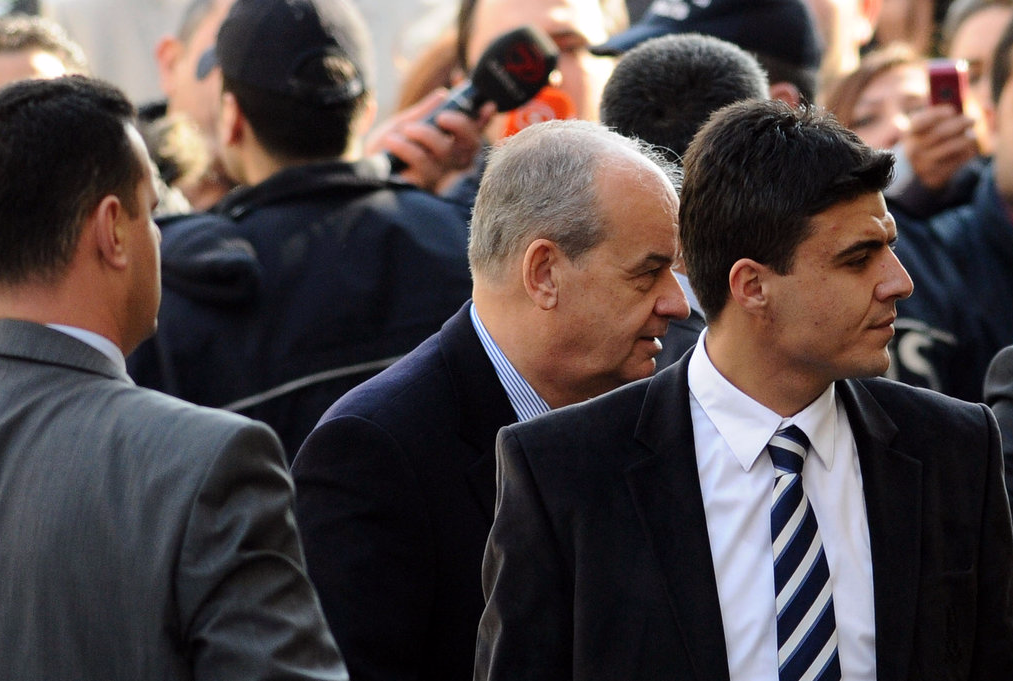
The arrest of Basbug was causing great controversy in Turkey, Prime Minister Erdogan said in a statement, "As prime minister, it is always are desire not to be arrested but instead to pend trial. And this is the desire of my person and my party again at this point. Because we do not see this way as the proper way.”
The arrest of İlker Başbuğ means the arrest of the highest rank among the names arrested in Ergenekon, Balyoz and İnternet Andici cases, and at the same time, the suspicions against the judicial cease were also uttered from the top. Due to problems with the proceedings, the government has long wanted the 'pending trial' of the prosecuted names in the proceedings. Opposition and other sections were often criticized. Ergenekon and Sledgehammer trials of the indictments prepared for years to justify this criticism. However, the judiciary rejected the claim that the prosecutions were pending, as the suspects were suspected of escaping and had strong evidence.
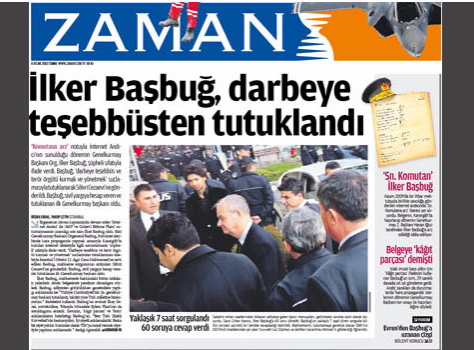
After this process, the government's approach to the judiciary began to differentiate. There has been a huge increase in judicial criticism from the government wing. In the media, the prosecutor's attitude continued. In this case, the addition of the Gülenists to the state within the team of the elected government and the inside of the parallel structure of the Gülenists also increasingly tensions. Parallel to this process of tension, two important issues arose when Primer Başbuğ was arrested. Prime Minister Recep Tayyip Erdoğan's house and office of the meeting was rested. Similarly, a month after the arrest of Bağbuğ, on 7 February 2012, MIT Undersecretary Hakan Fidan called on the KCK case and the Oslo talks. These two situations revealed the true intention of the organization under the name of the congregation.
Erdoğan’s office was bugged
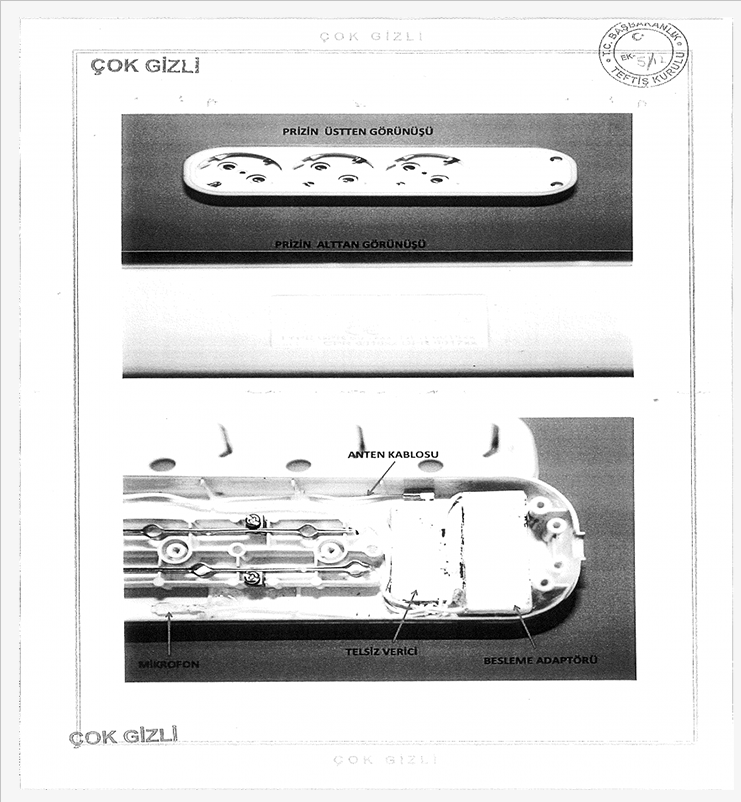
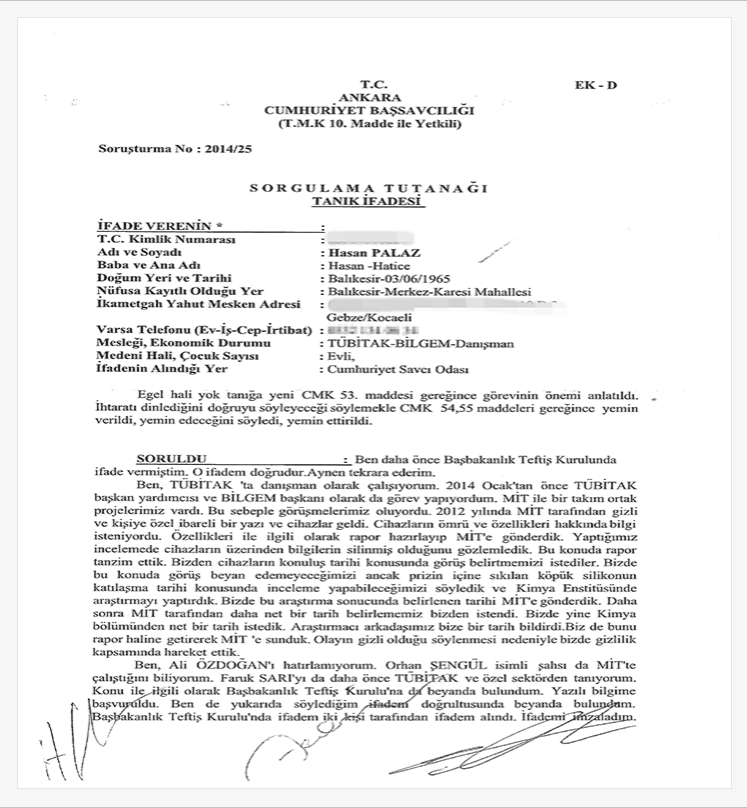
On December 28, 2011, Prime Minister Erdoğan's bureau appeared in the technical search made in the working room located in his residence in Subayevleri. On December 30th, another bug was found in the search made by the MIT teams in the Prime Office's Office of Labor. Shortly before the presence of insects, it was understood that Serhat Demir, the head of the Presidency of the Presidency of the Presidency of the Presidency of Protection, and the team of Prime Minister Erdoğan, who was under the control of Sedat Zavar, had made insect search studies in the Prime Minister's Official Residence and kept 'no cleaner' reports.Due to the second search made by the MIT teams after the suspicion of the Prime Minister's Undersecretary Efkan Ala, the insects were reached in both houses. During the RF frequency scanning of the teams with the Spectrum Analyzer, a radio transmitter was encountered. In the working room used by Erdoğan, a wireless transmitter fed from the mains network in the 6-socket multi-socket was reached. In the Prime Minister's Official Residence, the listening device in the multi-socket with 3 entries was detected. The team led by Serhat Demir and Sedat Zavar has already worked in the residential working office on December 7-18 and in the official
residential work office on 14-20 December under the name of two separate search / scan and jammer tests, they found that they did not come across a finding. In addition to Serhat Demir and Sedat Zavar, there was a police officer working with Enes Çiğci, Ali Özdoğan, Ahmet Türer, İlker Usta, Seyit Saydam, Hasan Palaz and Zeki Bulut on the team. on 28 December of the MIT team found that the insects were tested in the laboratory. After about a year of research on the topic, it was stated that the listening event started to take place from the beginning of December. Prime Minister Erdogan announced that he was listening and announced that he had an insect in his office in a statement he made in the NTV broadcast on December 22, 2012, 1 year after the hearing. Prime Minister Erdogan paid attention to the fact that the 'deep state structure' was not completely cleaned. The Inspection Board of the Prime Ministry launched an investigation on 2 January 2013. When the links were examined, the arrows pointed to the Gülenists. Following the operations initiated by the prosecutor, Prime Minister Erdogan's office, 11 security personnel who placed insects together with the TUBITAK Vice President of the Hasan Palaz "espionage" they were identified by the prosecutor's office.
MIT crisis: The parallel structure’s first operation targeting the state
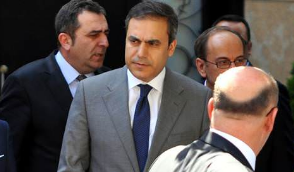
In December 2011, listening devices were found in then Prime Minister Erdogan’s residence in Subayevleri and the Prime Ministerial Official Residence, and there was a development shortly afterwards that would shake up Turkey's agenda. The Special Authorized Public Prosecutor, Bilal Bayraktar, summoned MIT Undersecretary Hakan Fidan. Later, the prosecutor Sadrettin Sarıkaya, who described the case to the file, also called MIT Undersecretary Hakan Fidan on the 7th of February 2012 in the name of "suspect" because of Oslo negotiations leaked to the press. The prosecutor, Sadrettin Sarıkaya, who had also allegedly involved in the KCK operations in 2010, called on former MIT Undersecretary Emre Taner and former Deputy Undersecretary Afet Güneş to act as a suspect. The parallel structure aimed at realizing the first serious operation against the state over the judiciary. As a matter of fact, Istanbul Chief Public Prosecutor Turan Çolakkadı said, "If this is the case, I must be aware of it. But I do not know if another girl was called. If this news is true, then it is done without information to us, "he said, hiding from the operation itself. However, the prosecutor called Hakan Fidan by phone to perform the MIT operation in Sarikaya.
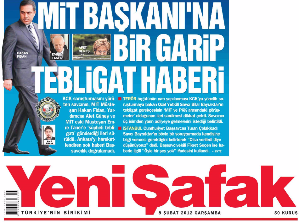
Parliamentary prosecutors were planning to reach Prime Minister Erdogan through Hakan Fidan and not to bring down the biggest blow to the state and power.
Parliamentary public prosecutors who want to reduce the biggest blow to the state tried to prepare a floor that would reach Prime Minister Erdogan. Thus, it was planned that the greatest coup d'état would be reduced to the state and power. In the operation, the selected date was very important. Prime Minister Erdogan's secret surgery was also on this date. The result of Hakan Fidan's access to the Prime Minister, did not go to testify that the Fidan prosecutor's office was unauthorized. The government has now begun to realize the goal of the operation more clearly. The government, which has acted against the coup that the parallel state tried to implement through the judiciary, moved on to a significant change in the MIT Law and tied the prime minister's permission to call the names of the MIT Undersecretary and the Prime Minister's "special duties". Thus, the parallel attempt to eliminate the impact attempt that MIT wanted to perform. Prosecutor Sarıkaya’s the investigation file was given to another prosecutor. In July 2012, the law for the removal of Special Authorized Courts was enacted and in March 2014 the Special Authorized Courts were abolished completely.
The deep skepticism about the Gezi Park events
After the MIT Crisis, the government began taking more careful steps. In this period, while the compass prepared by MIT on parallel structures was eliminated, important developments in the economic and political fields were experienced. Turkey, while closing the debts to the IMF in this period, has not been able to renew the Stand-by agreement, which has been in practice for many years. This was the most important indicator of Turkey's economic growth. The beginning of a new era for Turkey was spoken and the goal of being included in the top 10 economies in the world was now on the agenda of the public. But on May 28, 2013, a major wave of violence began to take place through the Touristic Park. The events that began with the discussion of moving the trees in the Travel Park elsewhere and then brought together groups of different ideologies that turned them into widespread acts of violence led to a huge crime. The events that were desired to be perceived as 'reaction to the cutting down of trees' suddenly turned into anti-government street protests.
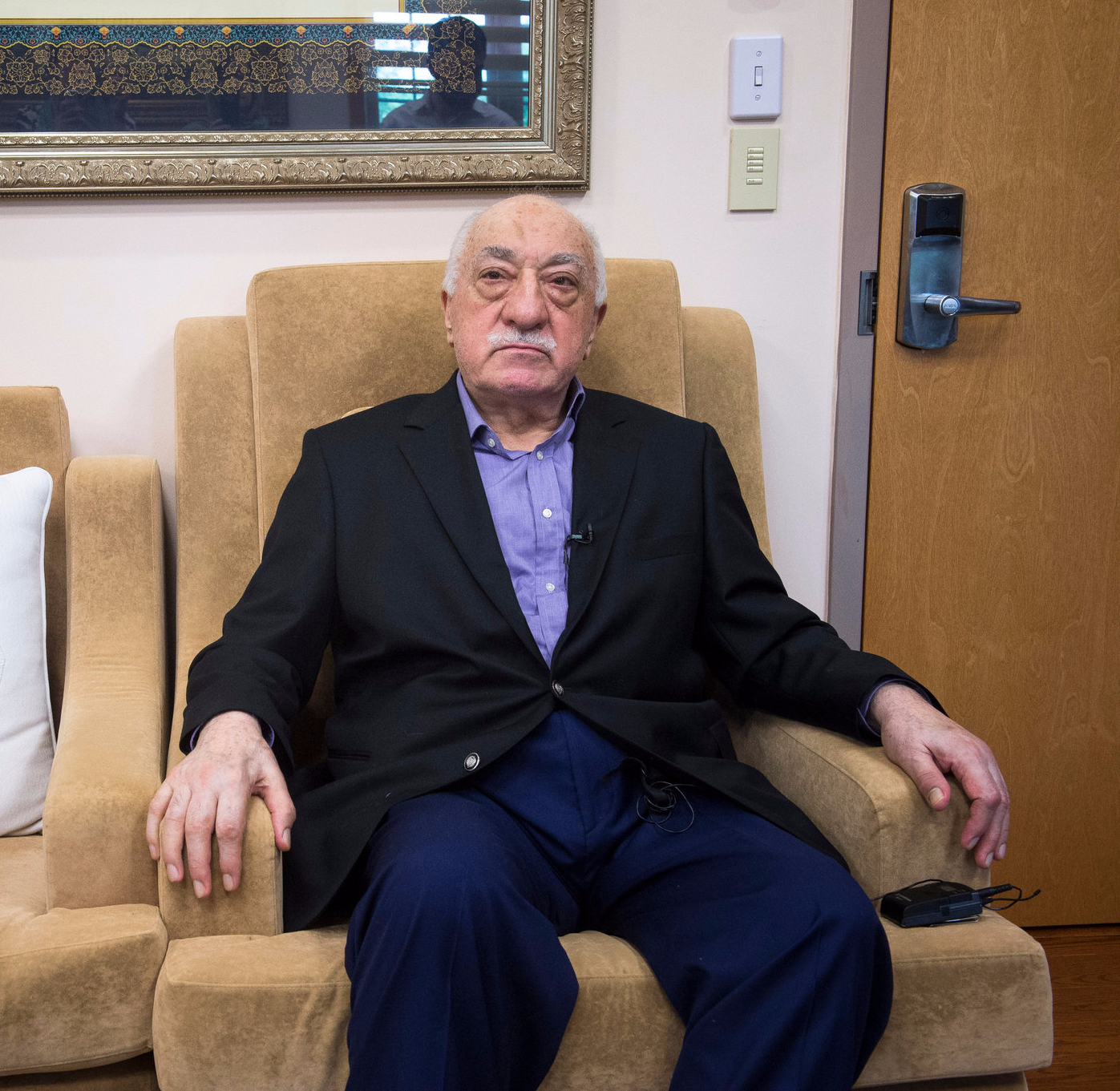
Events that occurred after the intervention of the police did not slow down in June. Prime Minister Erdoğan and the Government directly targeted the violent demonstrations, which just made things worse.
The Zaman newspaper was in front of the Gezi Park initiative at the beginning of the events. Shortly afterwards, the Zaman newspaper, which included reports criticizing violent incidents, began to change its stance. At that time in the trips, disproportionate violence by police officers belonging to the parallel structure claims that this cut off.
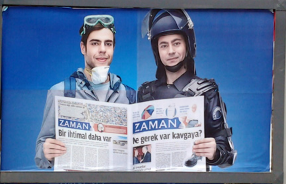
Gülenists, who also showed the first sharp breakthrough with this explanation, began to criticize the anti-government statements and the government to form a dictatorship with the classroom debates. The Zaman newspaper, which started in particular in the course of classroom discussions and in opposition to the premiere of 17-25 December, was referring to the events of the Trip in the advertisement published in November 2013. The Zaman newspaper, which used the slogan "Time Fellowship Time", included banners representing images of gas masked activists in the events. The Gülenists began intensive efforts to gain support from the left and liberal fronts during the course of classroom discussions and to expand the anti-government front.
Preparatory school debate: Time to attack
In 2013, the government launched a study to reduce the influence of classrooms on the framework of the new curriculum. The government, which thinks that the lessons that the students prepare for the exams go to both the education system and the families, is preparing a new education package that includes the support courses instead of the education system. To focus less on exams, ideally.
Establishing a strong classroom structure from the middle of the 1980s to the 2000s, both the classrooms and the schools they have gained access to a great deal of human resources and continued to recruit people from the structure they built. The government's study of closing the classrooms was enough to reveal the true face of the work under the name of the congregation at this point. They are attacked by realizing that the government will make a major blow to the interests of the educational revision. In a news story published on November 14th, Zaman newspaper announced that the government is ready to close the classrooms.
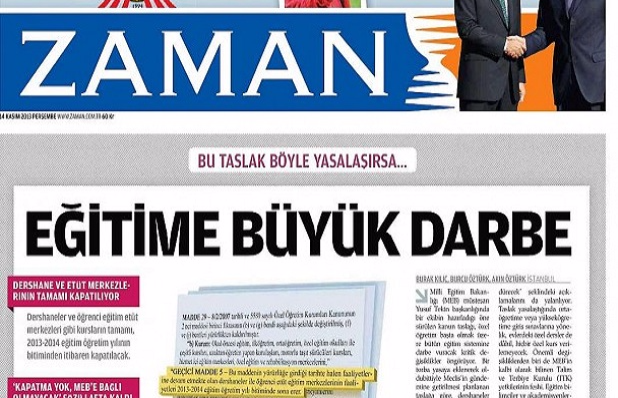
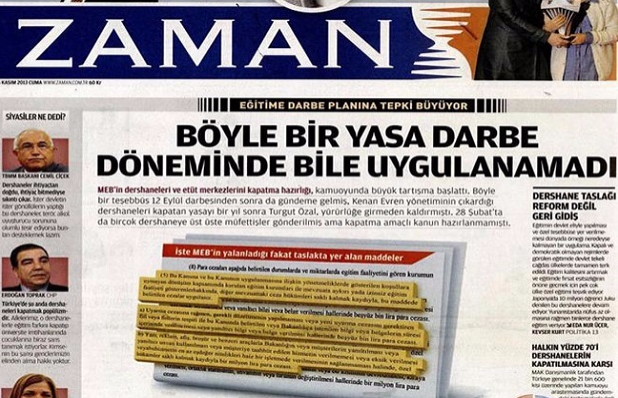
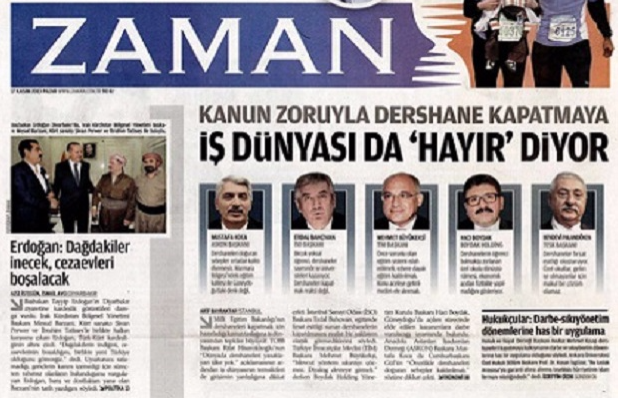
The newspaper, produced the headline "Education is a great blow", and launched a hard campaign against the AK Party government. The change that the government wants to make on November 15th is similar to the activities carried out during the coup era. The Zaman newspaper appeared with the headline "Such a law was not applied even during the coup period". On November 16, the newspaper, which claims that classrooms are an indispensable necessity for Turkey, was published with the headline "First, the causes that cause classrooms should be removed". On November 17, "The business world says no to close the classroom by law", on November 17, the newspaper, heading "Turkey's One Voice: Cutting the education and human institutions in front", saw the transformation of the classrooms as a threat for their own ends.
Having launched an intense campaign against the closure of the most important human resource and the main financial income source, the Zaman newspaper on 15 November 2013 removed the "classroom" and reprinted 1.5 million copies. The party newspaper appeared on November 28, 2013 with the headline "The decision to finish Gülen was taken at the NSC in 2004". It was alleged that the main reason for the transformation of the classrooms was to finish Gülen and that this decision was taken at the 2004 MGK. This news; The true mission of the Party that made "documentary news" in the case of Deniz Feneri eV, Ergenekon, Sledgehammer and game rigging were also revealed. Coordinating the media planning of all these operations with "journalism", the Party has now clarified that it is a Gülenists publication.
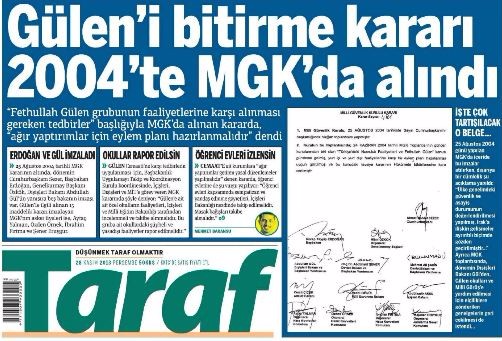
Gülenists / parallel structure, after this process, in the direction of interests started a great attack against the ruler. As well as the opposition in the AK Party and the names close to the Gülencililer also opposed the closure of the classrooms. Hakan Şükür, İdris Naim Şahin and Idris Bal, especially those related to Gülen, resigned from the AK Party by keeping the terrorist ringleader Gülen on the side of the classroom debate, as to not be noticed. As the AK Party does not make the anticipated effect of these resignations, which are aimed to lead to breakage from inside, Fortunately, Sahin and Bal lose their political base. İdris Naim Şahin and İdris Bal, who were politically supported by the Gülenists, started to form a party while Hakan Şükür started to move with the political parties without parties.
Police and judiciary coup initiative: December 17-25
In the process of the classroom discussions, Zekeriya Öz and Celal Kara started a big operation on December 17. The reason for the operation was corrupt, but the goal was very different: the Gülenists in police and judiciary initiated a chain of operations aimed at resigning the government and stopping the gigantic projects, aiming at destroying and destroying the 61st Government. Interior Minister Muammer Guler, Economy Minister Zafer Caglayan, Minister of Environment and Urbanism Erdogan Bayraktar children and businessmen Ali Ağaoğlu and Rıza Sarraf were taken into custody. Gülenist prosecutors, operation of the order of the structuring of the order, they gave instructions for the operation of the December 17 coup attempt to run the prosecutors, the Istanbul Chief Public Prosecutor's button without stepping on the button.
Zekeriya Oz and Celal Kara started a major operation on December 17 in the course of the classroom discussions. The reason for the operation was corruption, but the goal was very different: the Gülenists made up of police and judiciary, initiated a chain of operations aimed at resigning the government and stopping huge projects, targeting the destruction and destruction of the 61st Government. Interior Minister Muammer Guler, Economy Minister Zafer Caglayan, Minister of Environment and Urbanism Erdogan Bayraktar children and businessmen Ali Ağaoğlu and Rıza Sarraf were taken into custody. Gülenist prosecutors, operation of the order of the structuring of the order, they gave instructions for the operation of 17 December coup attempting to run the prosecutors, the Istanbul Chief Public Prosecutor's button without stepping on the button.
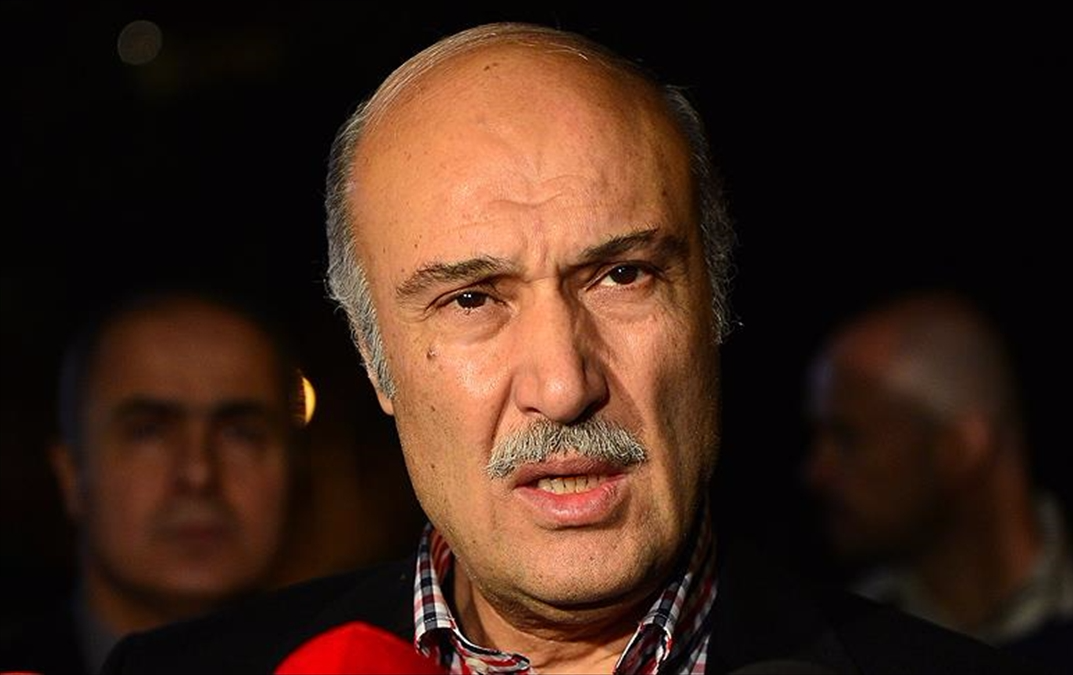
The fact that the details of the investigation were not entered into the National Judiciary Network Information System (UYAP) also revealed the unlawfulness. Sabah counterparts, the mayor, the bank general manager and several security forces that simultaneously raided Adrese to detain a large number of businessmen. The Interior Minister of the time Muammer Guler was informed when his son was taken into custody during the raids. Again, Istanbul Chief of Police Hüseyin Çapkın and Istanbul Governor Hüseyin Avni Mutlu were not aware of the developments. The court arrested seventy-one suspects, who were taken into custody,, and 38 were released under judicial control.
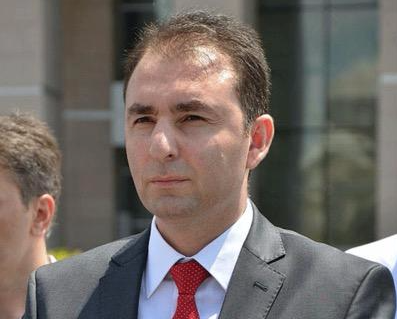
The parallel structure’s media arm was run by Gülenist journalists. Pre-prepared records, illegal tracking records, records of calls made from home…
From the morning of December 17th, the Hürriyet, Radikal and Haber Turk newspapers of the Gülenists were included in this information flow as they were published on the internet sites of Zaman, Bugün and Taraf newspapers. Members of the organization, who play strong and effective roles in virtually every institution in the media, are open-minded in social media and television programs; He was dictating to the public that police raids were "corruption operations" and that "it was not right to make a political reckoning comment."
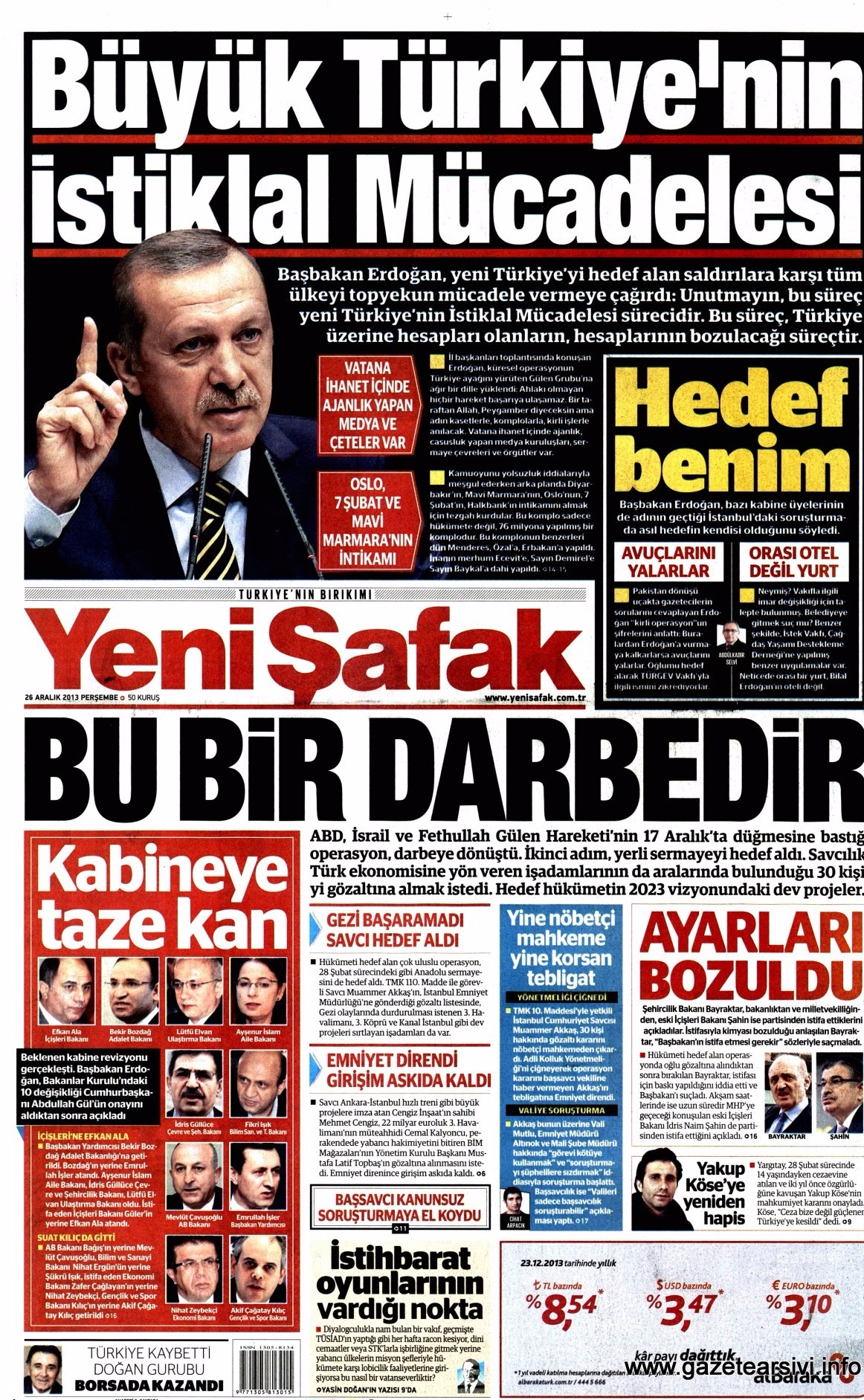
The eyes were on that day at Prime Minister Recep Tayyip Erdogan in Konya during the Şeb-i Arus program. Speaking on the program he participated in after the afternoon, Erdoğan's words lifted the perturbation of the AK Party wing: "There are a lot of dark circles in and out of Turkey, and they can not play in the direction of Turkey, they can not change Turkey's settings. It is not a country to be operated on or operated on. The nation will not allow this. As the government of this nation, the ruling AK Party will not allow it. Whichever account they have, if they trust themselves, there is an election on March 30th, those voting accounts view the nation there. For those who want to see their account outside the polls, neither folks nor we will allow, we do not have an eye. Turkey is not a banana republic. Turkey is not a tribal state of the 3rd class, which is the nation to be trampled upon and the decisions of the nation to be ignored. Inside or outside nobody can mix it my country, can not establish ugly traps in my country. Erdogan said "Turkey is not a banana republic "and" Turkey is not a 3rd class ignoring the will of the nation's decision-tribal state." The accent also implied that the move in the morning hours was a coup attempt. Many years later, the public accepted and understood that the December 17 coup attempt was to be understood and accepted.
The four ministers, who were named in the investigation, resigned on December 22nd and the government reacted strongly to this conspiracy. Istanbul Police Chief Çapkın was removed from his position and replaced by Selami Altinok. While the staff within the safety of the parallel structure were being pacified, the case file in the hands of Celal Kara was given to another prosecutor.
But the Gülenists were planning a coup in the frame of the corruption they had established, and the ruling party was not to blow hard. The major moves came on December 25th. Prosecutor Muammer Akkaş has prepared a document to invoke Prime Minister Recep Tayyip Erdogan's son Bilal Erdogan as a suspect in the context of the investigation that he allegedly started with corruption and bribery. Shortly after the operation, Prime Minister Erdogan and his son Bilal Erdogan allegedly passed between the audio recording prepared by assembling and published on the internet. Thus, it was understood that the main target of the corruption compass prepared by the parallel structure was Erdogan. There were 96 people, including media executives and businessmen who signed big projects such as 3rd bridge, 3rd airport, Bilal Erdogan and artist Orhan Gencebay, Special Prosecutor Muammer Akkaş made a detention decision on the morning of December 25th. However, Prosecutor Akkaş's detention orders were not enforced by police officers who replaced the Fetullahci policemen, which were liquidated after December 17th. The journalists wrote that the next day they had a hard fight against police officers in Istanbul. Hundreds of listening decisions in the 25 December investigation were taken with the signatures of Süleyman Karaçöl and Menekse Uyar named judges. Recep Tayyip Erdogan, the Prime Minister of the Republic of Turkey, whose communications were detected illegally as a third person, were the names of the ministers Binali Yıldırım, Ömer Çelik and Muammer Güler who listened for a long time without any decision. These negotiations were made into tape and stored.
Black propaganda days begin
The organization, which continues to publish voice recordings over the Internet, has thus perceived the perception that there has been a great deal of corruption in Turkey. The government's attitude toward conspiracy under the corruption case propagated that the government tried to cover up the corruption by saying such as "the government covers corruption", "the government attacked the government when corruption emerged" and "the prosecutors who brought up the corruption were removed from the office". The Gulen media, which has reacted harshly to the prosecutors' removal from office, has begun advocating and defending the prosecutors. On the other hand, for the AK Party to remain in a difficult situation, Parliament known for its proximity to the Parliament Idris Naim Şahin, Ertugrul Gunay, Haluk Ozdalga, Ahmet Oksüzkaya and Erdal Kalkan'da resigned from the AK Party.
Erdoğan: There is a 'parallel structure' within the government
The AK Party, Government and the target of the Prime Minister Erdogan were the targeted areas. Speaking at the massive inauguration ceremony in Manisa on December 27, Erdogan also pointed out to those who were involved in the struggle by using the expression "a parallel structure within the state" for the Gülenistss in the state.
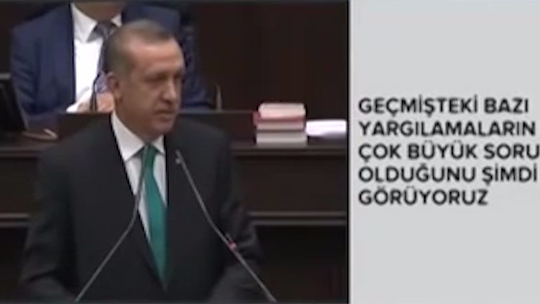
On the one hand, parallel attempts to prevent the coup attempt against the prisoner, while taking measures against the restructuring of the judiciary and safety began. After this operation, it was understood that the members of the so-called community were in danger of becoming members of the state. In response to the organizing of the Gülenists in the judiciary, on January 29, 2014, Celal Kara, the investigative prosecutor, changed the mandate of the 166 judges and prosecutors, including the Istanbul Chief Prosecutor Zekeriya Öz, who gave the permission to investigate, by the HSYK decision of February 11, 2014. On the safe operation frame, Yakup Saygılı, Kazım Aksoy, İbrahim Şener, Mustafa Demirhan, Arif İbiş and Mahir Çakalı were members of the parallel structure. Shortly after, Istanbul Police Chief Hüseyin Çapkın was taken to the center. The positions of police officers who belong to the parallel structure that became members of the police in safety were also changed.
The west worked together with Gülen
Parallel state-building, which wanted to lower the power through corruption penalties, but failed to achieve this goal, built its next strategy on a wide range of perception and defamation operations. Gülenists claimed that they were 'innocent' after 17-25 December, and that 'with the emergence of Prime Minister Erdoğan's corruption', the power began to target themselves. Parallel structure started to define "Erdogan as a leader infected with corruption", especially in the domestic public and in the international scene. At this point, the parallel structure that makes use of the discussions in the travel events, Erdoğan argued that he started to become authoritarian in the last period and that he was the last obstacle in front of the authoritarian regime that Erdogan wanted to establish. Thus, the parallel structure that coded Erdogan as 'the other' through the 'dictator' rhetoric showed themselves and their fronts as 'legitimate' and 'the last fortress that must be supported against Erdogan'. The parallel structure that expressed this discourse at a high end was influential especially in the Western world thanks to the network of relationships they have abroad. Many institutions in the West supported this discourse of parallelism, which was trying to build up the perception that Erdogan was trying to distract Turkey from the West with its policies. The US and the EU began to target Turkey through concepts such as 'democracy, human rights, freedom of the press’ that are frequently used after parallel compulsions.

Raid on the MIT trucks and the foreign affairs meeting
The parallel structure, which could not reach its aim on December 17 and 25, launched a new attack on January 19, 2014. Adana Chief Public Prosecutor Süleyman Bağrıyanık gave orders to stop MIT TIRs who helped Turks of Bayırbucak in Syria from Turkey.
Kırıkhan Prosecutor's orders stopped by the gendarmerie teams consisting of 125 people was attempted calls in the truck. Hatay Valisinin, MIT staff personnel and that the vehicle belongs to the MIT'te written instructions that TIR search was prevented. However, with Adana TMK Prosecutor Özcan Şişman reaching Kırıkhan, the front of the TIR was cut off by police officers this time. MIT with the introduction of the 'weapons carried' claim, forced pursuit of pursuing the path of the trick continued. The emerging images of the incident began to be given by the institutions in which the media belonging to the parallel structure exist, in the form of 'giving weapons to Turkey's terrorist organizations'. Thus, it was argued that Turkey gave weapons to many terrorist organizations, especially DEAŞ, in Syria, and that such tigers also carried arms to these organizations.
The information provided by members of the security and judiciary belonging to the parallel structure was also shared by media organizations belonging to the parallel structure, especially Zaman. Thus, the parallel structure that tries to identify Turkey with terrorism in the international arena is circulating the claim that Turkey has helped Al Qaeda and other terrorist organizations.
Parallel to the treacherous initiative, the Parallel Building provides information and documents about the event to
The meeting in the Ministry of Foreign Affairs was served to the world
On March 27, 2014, a voice-over was broadcast on the Internet, targeting the government, which was set for March 30th local elections. Parallel structure, which carried out voice recordings in the Ministry of Foreign Affairs, was broadcast by the Ministry of Foreign Affairs Ahmet Davutoglu, MIT Undersecretary Hakan Fidan, Undersecretary of Ministry of Foreign Affairs Ferdidun Sinirlioglu and 2nd Chief of General Staff Yasar Guler. The parallel structure that published the voice record of the meeting on which the Syrian crisis was discussed and the developments related to the Süleyman Shah Tomb were discussed, began to form the perception that the government planned the 'war for election'. Thus, as the parallel structure wanted Turkey to be hit by the Syrian policy, there was a serious attack on the national security. The parallel structure that broadcasts the voice recordings of the most intimate meeting of the state has begun propaganda on the international scene that "Turkey can carry out an attack against Syria".
Parallel betrayal: Gülenist terror organization
Along with these attacks targeting Turkey's Syrian politics, while attempting to establish a front against Turkey in the foreign public, Erdoğan and the government tried to establish the perception that the government would enter Turkey into war to win elections. In response to these treacherous initiatives, at the NSC meeting on April 30, 2014, it was stated that the 'Parallel State Constitution' posed a great threat to the national security of the country. Thus, while entering the list of 'terrorist organizations' that threatened the security of the parallel state structure, it was emphasized that the MGK decision will continue with the resolute actions carried out with parallel structures and illegal formations, which threaten our national security and illegally operate under internal and external legal conditions that disturb public order.
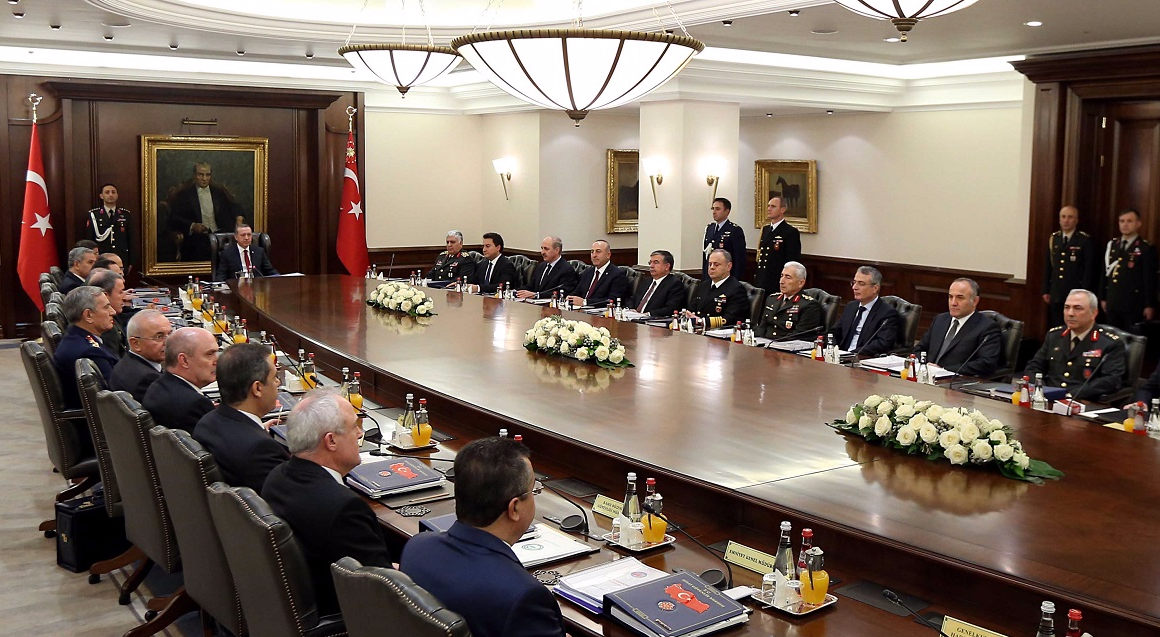
The parallel structure’s election move: March 30
While going to the March 30th local elections, Turkey, in one of the most critical processes of its history, struggled with the parallel structure on the other hand with the Syrian crisis. The tension that started with the 17-25 December process and climbed up with the MIT TIRs caused a huge polarization inside. Parallel state-building continued in this period with Prime Minister Erdogan and steps towards establishing a broad front against power and putting Turkey at risk both inside and outside. The parallel structure, which accelerates perception operations since the March 30th local elections are approaching, has launched massive attacks on the media. The goal of parallelism at this point was to weaken the power before the presidential elections, especially in the two big cities (Istanbul and Ankara) by blowing a big blow to the AK Party. The parallel structure that carried out a large-scale propaganda campaign against the AK Party in this framework was also looking for a way to cooperate with the opposition parties. In this process, the Parallel Building continued to work on the AK Party's aggression through the use of media, as well as bribery in brochures
and booklets, including issues such as corruption claims, MIT TIRs, freedom of the press and Syrian policy. The other side of the media through the AK Party and Erdogan about the new assertions caught the circulation.
More propaganda in this process of the structuring parallel state found that 15 percent of their vote share and, therefore, it was claimed that the AK Party suffered a big loss of votes in this election. In particular, members of the parallel structures, which referred to the 2010 constitutional referendum, the referendum through its support themselves during this period 'Yes' claiming to be. According to the parallel structures, especially the AK Party would live in a large loss in Istanbul and Ankara. The parallel structure was also entering into alliances with political parties seeking to take place, they see places they wish to support in this process. However, the results of the March 30 local elections, not as great as claimed by the votes of Gülenist base, was not affected by the ruling AK Party and the perception of these operations, and showed that continued to receive great support from the public.
The parallel structure’s presidential election strategy
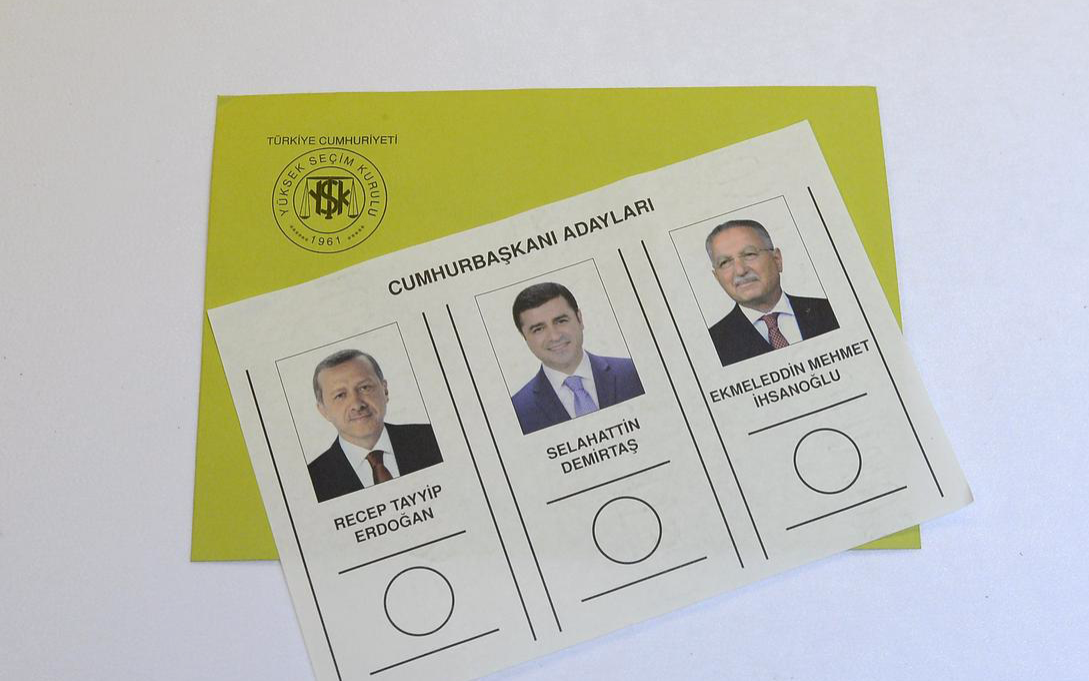
Presidential elections before the parallel structure of the three largest political party's strategy, CHP, MHP and Erdogan was facing the opposition HDP party leaving on a common candidate. This parallel structure located in a long time attempts to remove the joint candidate of three parties, especially through the media propagandize in this direction. The parallel structures working to build a front against Erdogan, used social media effectively at this point.
A Twitter account belonging to Fuat Avni, who was later revealed to be a part of FETO’s parallel state structure, went on to launch an adverse propaganda campaign against the government. With this project it was attempted to damage Erdogan before the presidential campaign. Someone on the inside and that sharing the information alleged that occurs Fuat Avni, Erdogan referred to him as 'Yazid' and describes it as it continuously make new plans and claimed he tried to drag the country into chaos. This information will find its place on the media and was further stoked broad opposition to Erdogan. In particular, the ongoing debate on the presidential system at this point in sending that parallel structures, Erdogan a 'dictator' began as identification. In this context, an actor identifies the parallel structures must be stopped Erdogan, opposition and interior was also urging the public to support a different name to stop Erdogan. At this point the CHP and the MHP in the direction of removing the joint candidate seeking reconciliation hdp'n also added to the propaganda was made a long time. However, parallel structures, CHP and MHP Ekmeleddin Ihsanoglu on the name of reconciliation and HDP’s Selahattin Demirtas across nominate 'common candidate' could not get the support it expected about the idea.
After this process may take a while right-wing conservative audience with the idea of parallel structures Ihsanoglu's candidacy positive finding, on the other hand Demirtas Erdogan's election was seen as a chance to undermine the most important weapon. Ihsanoglu suna Un support to parallel structures implied in this context, he conducted major propaganda activities Selahattin Demirtas on the other side. Demirtas, who began to give more space paralelci in the media, Erdogan played his last card before the first round of presidential elections, trying to prevent selected.
A new guise for hostility aimed at Erdogan
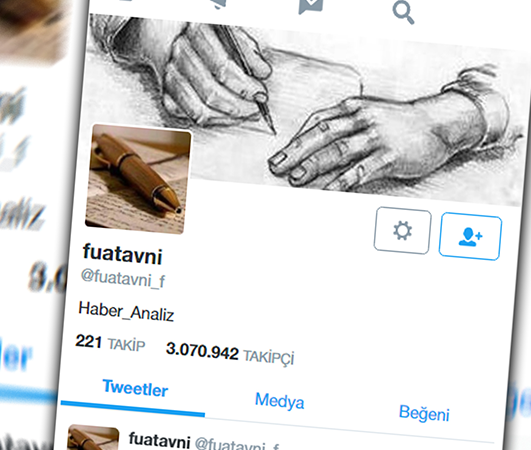
With Erdogan’s victory on August 10th with 52 percent, the Gülenists continued to attack with a new discourse. The subject brought up to the agenda of the next process was parallel structures Presidential Palace Complex. Through social media accounts and posts, the parallel structure tried to create the perception that the Presidential Palace Complex was referred to as an “illegal palace,” and “the Yazid’s palace”. Gülenists also said that Erdoğan “constructed a palace for himself.”
The basic strategy in the new era, "Erdogan wants to build a one-man regime ', based on the idea of parallel structures, Erdogan's presidential system, in this context began to argue that it wants for itself. If not a presidential system, Erdogan will establish a dictatorship, would drag Turkey into chaos and Turkey voiced that a great break from the West.
June 7 to November 1: Chaos plan
After the presidential elections in Turkey in parallel with the restructuring period began in a more effective fight. Previously parallel state structure adopted by the National Security Council as a threat to Turkey's national security decision found its place in January 2015 in the Red Book. Thus parallel state structure of Turkey's National Security Policy Document has been added as a threat to national security.
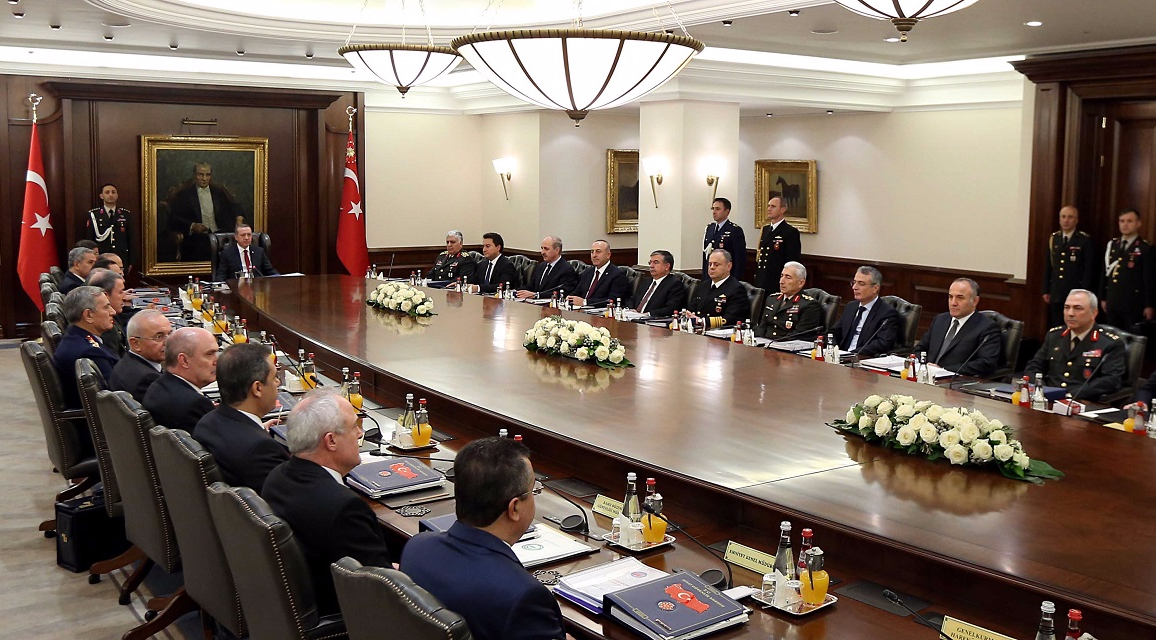
It started with institutions and organizations in the period following the parallel state structures began to be more effective fight. Special especially with the changes made in the jurisdiction of the competent courts were abolished. This was seen to break facing an important function in the safety and effectiveness of the judiciary parallel state structure. Many members of the task parallel structures which have infiltrated police changed places. Many names were drawn into the passive point. However, the task of the said place parallel police members are changed, the East and South East provinces assigned to several members of the organization began to adversely affect the Resolution Process. Parallel structures belonging to security members took part in the attempt to undermine the mission of the new Resolution Process. Especially go to elections on June 7 in a process of influence in this situation was very volatile. Indeed, on June 7 before the developments in the political arena directly reflected on Process Solutions, Process Solutions also by parallel structures, the AK Party has become an area used for contrast. 7 parallel structures wanting to weaken the AK Party in the June elections, while in the same facade with HPD one hand, on the other hand began to use because of clashes with PKK attacks.
The most significant aim of the parallel state structure in the lead up to the June 7 elections was to ensure that AK Party was not a player in the new structure.
The opposition to providing great support for parallel structures and giving weight to activities against the AK Party, first headed to cooperate with many cuts, including HDPE. In particular, the entry into Parliament through the HDP passing the minimum barrage, since it would mean the ruling AK Party cannot be alone, as the most important partner for the parallel structures was the HDP. The HDP came up with a campaign that targeted President Erdogan with the slogan ‘We will not allow you to be President!' Considering the impact in front of rhetoric against the AK Party, it became an actor for HDP supported parallel structures. The next process in parallel structure’s partnership with the HPD began to make propaganda through the media structure, as many HDP representatives pushed propaganda activities on the Gülenists’ their own TV channel. By going to Diyarbakir, the former chief of the FETÖ newspaper Zaman, a major media organization of the parallel structure, Ekrem Dumanlı held many meetings with HDP and DBP affiliates. This resulted in a great surge in HDP votes on June 7. During the June 7 elections, when the HDP passed the minimum barrage, the parallel structure reached its most important goal. Despite the fact that AK Party was voted in with 256 members of parliament, it was unable to form a government and therefore needed to form a coalition government. The parallel state structure was able to take great advantage of the coalition government.
Coalition debates and talk of a '60 percent' block
After experimental stages theory of the AK Party government alone among opposition parties started coalition talks with the AK Party. HDP with the MHP makes two different block representation in the process of intense debate will bring together a coalition of parallel structures led to the search formula. Parallel structures CHP, MHP and HDP was pushing for a tripartite coalition, 60 percent were kept on the agenda of the three parties that form the block. CHP leader Kemal Kılıçdaroğlu, while 60 percent expressed the bloc can come together in this process, the MHP and HDP said he would be part of a coalition. AK Party-CHP coalition talks fail and parallel realization of the tripartite coalition's most wanted has led to the possibility of early elections. 1 after the November elections while achieving the AK Party to govern alone again, with parallel structures in the struggle was to begin a new process. The next period, the National Security Policy Document entered against the parallel structure of institutions and organizations more effective measures were taken as a terrorist organization.
Combatting FETÖ
Gülen-İpek partnership: Parallel media
By the beginning of the 2000s the parallel state structure had media outlets such as the Zaman newspaper, Sızıntı magazine, Aksiyon magazine and Samanyolu TV, and was further strengthened in the media sector in the 2000s. During this period, the parallel structure expanded with channels such as Samanyolu TV, STV Europe, STV America, S News, Mehtap TV, Ebru TV, Yumurcak TV, Küre TV, Hazar TV, Kurdish World TV, and MC TV. The Zaman newspaper also experienced expansion in print media. In the 2010s, the Zaman newspaper made sales of over 1,000,000 copies allegedly. The parallel structure’s Today’s Zaman newspaper was FETÖ’s way of introducing parallel structures in the international arena. On the other hand, Akın İpek, who was a significant name in the parallel structure, bought the Bugün newspaper with his Koza Holding. In this way, he strengthened the organization’s grip on the media. In 2008, Akin İpek purchased the Kanaltürk channel and further expanded into the media sector. İn 2009, Koza Holding launched Bugün TV. In this way, the parallel media had not only the Samanyolu Broadcasting Group and Feza Journalism but also the chnnels within Koza Holding.
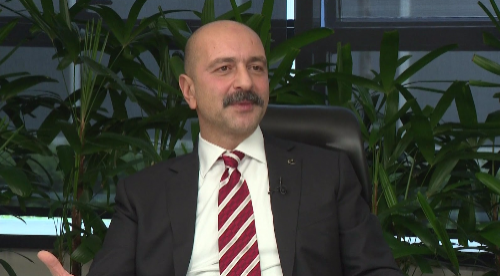
Parallel structures also began to publish the newspaper Zaman European countries. Germany, France, Belgium as a weekly newspaper published on time so many countries. Thus, the parallel structures, formed a powerful media structuring in Turkey both in the international arena. Parallel structures walked through media propaganda activities related to the activities of the Organization, had the opportunity to reach a wide audience. Another important organ of the Organization of Taraf newspaper was founded in 2007. Taraf newspaper drew attention to military documents published since its inception. Ergenekon case began with the process followed by Sledgehammer, KCK and claims that are lnternet Andıcı litigation such as Internet memorandum by the Taraf newspaper was reporting news simultaneously. Especially before the Sledgehammer case, the news article and contents that Mehmet Baransu published were being widely discussed.

Parallel structures established by the Taraf newspaper has conducted activities as a media organization engaged in the operation of journalism. Against the square and newspapers after 2014 was established.
In the process of Sledgehammer, KCK, Internet Adinci and Game rigging, the media organs of the parallel structure took an active role. The claims that were the subject of the lawsuit also affected the progress of the media cases of the parallel structure that brought the day with striking details in the newspapers and TV channels. These newspapers and magazines, which constitute the media pillar of the operation initiated by the members of the state that have been infiltrated by the parallel structure, carried out intense propaganda activities in the period of December 17-25. With the decision of the NSC as a terrorist organization with the decision of the State, effective measures against these media institutions were taken.
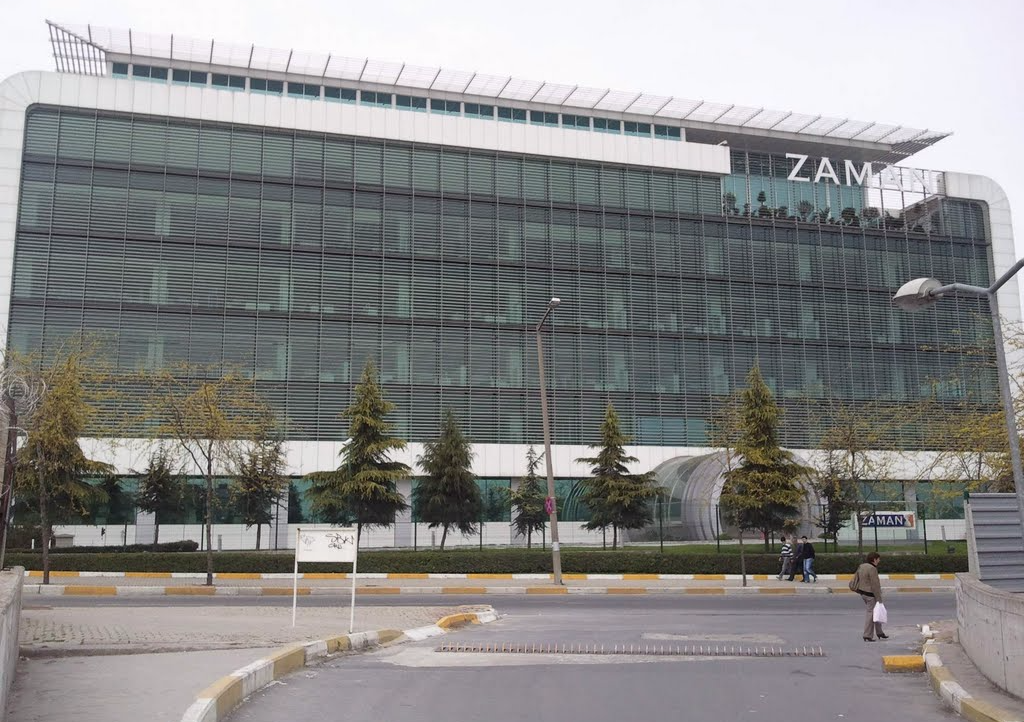
In October 8, 2015, parallel channels such as Samanyolu TV, S Haber, Mehtap TV, Yumurcak TV, Kanaltürk and Today TV were removed from Digitürk. On October 28, 2015, Kanaltürk and Bugün TV, owned by Akın İpek, were appointed a board of trustees by the government. This was the first effective step towards parallel media structures. Later, the broadcasts of both TV channels were interrupted. Shortly after this darkness, on November 14, 2015, thirteen TV channels belonging to the Milky Way Broadcasting Group were removed from the TÜRKSAT satellite. On March 7, 2016, a court was appointed to Zaman newspaper and Cihan News Agency, the most important publication organ in parallel with the court decision. Thus, the media organs of FETÖ were confiscated and the propaganda areas inside were narrowed. When members of the organization gathered in front of the Zaman newspaper after the appointment of the psychiatrist to the Zaman newspaper, they were shown against the government, and the resulting images were served to the West media. The journalists who belong to the organization complained to the West with the letters they wrote to the EU institutions and the Western media. As part of its initiatives to overthrow the government in Turkey, it has been recognized as a terrorist organization since 2015, and after the appointment of the audiences to media organs, Turkey tried to make the international environment lonely through 'press freedom'. The end result of FETÖ's propaganda activities Many Western countries have claimed FETÖ, explaining against Turkey. After FETÖ's attempt on the coup d'état on July 15th, the media organs were closed with the KHK, as were other institutions and organizations belonging to FETÖ.
July 15 coup attempt
On July 15th, a coup attempt to overthrow the government was initiated by FETO’s treacherous troops. The Fatih Sultan Mehmet and Bosphorus Bridges were closed soldiers in Istanbul, and putschists attacked the Ankara Presidential Complex, MIT Undersecretariat, Parliament, Gölbaşı Police School and bombed türksat. Putschists who captured the TRT buildings announced that they had confiscated the pirated declarations they published and that they were declared martial law. Prime Minister Binali Yıldırım announced that the initiative was made by a 'minority group' following a coup attempt.
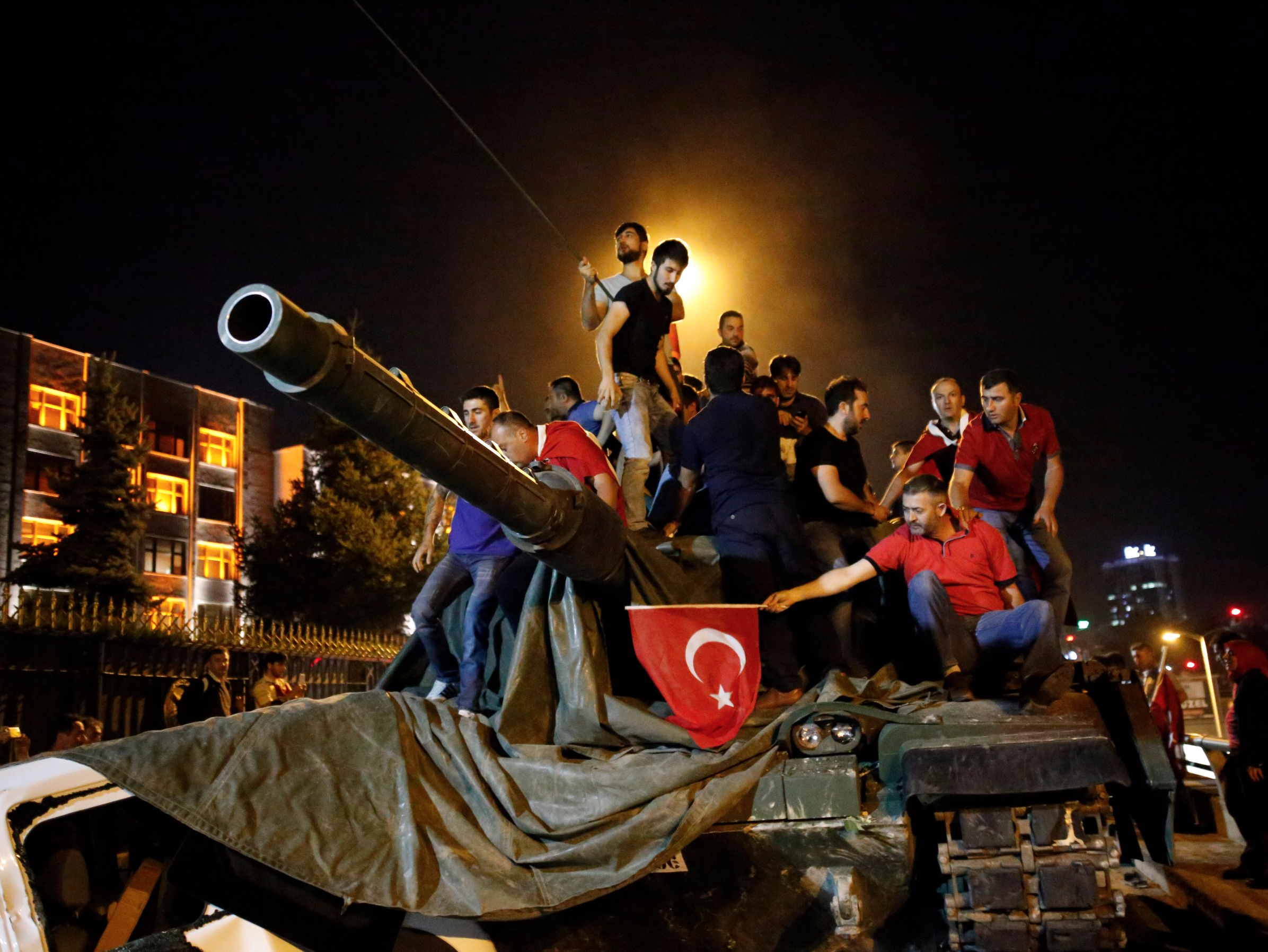
President Erdogan announced at 00:26 that he called the people to the squads against the attempt of coup d'etat. The people, who came to the streets with the call of President Erdoğan, displayed a glorious resistance against the putschists. During the coup attempt the putschists directed the weapons taken by the national taxation of the nation. The strike night was over 248 people were martyred by the FETH traitors, while over 2000 people were injured. The fight against FETÖ has been strengthened since the year 2013 by the decisive attitude of the government and President Erdogan against the terrorist organization of the FETÖ. The government, which proclaimed OHAL in order to carry out a comprehensive struggle with FETÖ, took effective measures against many institutions and organizations belonging to FETÖ in Turkey, especially the members of FETÖ who have been infiltrated into the state. Following the July 15 coup attempt, the MEB confiscated all the schools belonging to FETÖ and canceled the work permits of teachers of FETÖ staff working there.
The period of struggle against FETÖ
After the 15 July coup attempt, besides the FETÖ submissions, there was also a fight against institutions and institutions belonging to FETÖ. During the past 40 years in Turkey, FETÖ, which has reached an effective structure in many fields, primarily schools, classrooms, colleges, media, financial companies and banks, has earned an income of $11 billion through these institutions and institutions. Particularly active in the field of education, FETÖ has had thousands of schools in Turkey. After July 15, MEB started to take effective measures against these institutions, confiscated all the schools belonging to FETÖ and canceled the work permits of the teachers who are working in these schools.
In the financial arena, since the 1970’s, FETÖ has been active since the year 2000, when it came to a strong financial infrastructure. Since 1980 's, FETÖ has gained a huge income through the media and broadcasting companies that it opened. In the 1990’s, medium-sized companies began to hold their holdings with the increase in their profits. And now the community, known as the congregation, has begun to receive an order that holds the place. Over time, large companies such as Kaynak Holding, Koza Holding, Feza Gazetecilik AS, AKFA Holding, Fi Yapı, Aydınlı Group, Eroğlu Holding, Güllüoğlu Baklavaları, Seyidoğlu Baklavaları and Boydak Holding have emerged. Businessmen from FETO founded a roof association in 2005 under the name of TUSKON.
During this period, under the roof of TUSKON, 150 businessmen were representing the association and 1200 businessmen were operating in the region. Businessmen, known for their proximity to FETÖ, first started the process of federation. Businessmen who came together in Marmara, Aegean, Black Sea, Mediterranean, Central Anatolia and East and South East Anatolia regions in line with the geographical distribution of Turkey formed federations under the names such as MARİFED, ESİDEF, KASİF, ANSIFED, DASİDEF, and GÜNSİAF. With the opening of the school, the members of FETÖ, who started to invest abroad thanks to the lobbying activities in the areas where the schools are located, also increased their activities on the international arena. In many countries where the FETÖ schools are located, investments of businessmen close to FETÖ have been realized. FETÖ's establishments and the lobbying network it has played a major role in bringing this possibility to light. With the strengthening of FETÖ abroad, businessmen who wanted to invest abroad from Turkey started to establish their connections through FETÖ. As a result, businessmen who went abroad for investment from Turkey became unable to invest in the way that FETÖ set up here. This power, in time, has helped FETÖ establish close relations with many businessmen and benefit from these businessmen at financial support point.
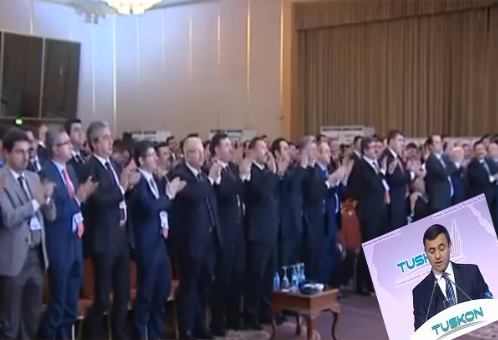
Businessmen who are members of TUSKON have had the opportunity to invest more easily through the international members of FETÖ. Businessmen from various regions of the world, especially in Africa and Central Asia, have made major breakthroughs in the 2000’s. The government also encouraged businessmen to invest abroad and supported TUSKON's business in this regard. Thus, the financial support provided by TUSKON to FETÖ, which has been transformed into an effective power due to investments both in the domestic and international regions, has also experienced a great increase. The greatest support for the attacks and defeats that resulted in the initiative of FETÖ, against the sentence in 2013 and the coup attempt on 15 July 2016 came from these groups. Criticizing the measures the government took against FETÖ's initiatives, TUSKON was outpouring criticizim over the government and Erdogan, and marking FETO. In particular, President Erdoğan's words for the formation of FETÖ, "We will enter into his souls," TUSKON Chairman and TESKON member Rızanur Meral, President Recep Tayyip Erdoğan, "soon everyone will see what everyone lived in" said. Speaking at the TUSKON meeting broadcast live by the Samanyolu TV, Meral claimed the FETÖ and was applauded by the FETÖ businessmen. As this situation picked up a huge reaction, the dimensions of the threat reached by the FETO were also revealed. The government, which declared the death of FETÖ after the coup attempt of July 15, initiated an operation against the businessmen connected with FETÖ, especially the businessmen of TUSKON members. In this context, the property assets of the businessmen who were found to support the FETO network were confiscated, and a great blow to the financial foot of FETÖ was reduced.
The most powerful struggle of the State against FETÖ, was against the bureaucracy, the security, the TAF and the FETÖ affiliates in the judiciary. The discharge of the members of FETÖ, which had reached the number of hundreds of thousands within the parallel state after 40 years of infiltration, became the most important target after July 15th. In this context, a major cleaning was carried out in the judiciary, security, TAF, ministries and other units of the state. Particularly effective measures were taken against the people identified as using the secret communication network ByLock of the FETÖs. With the uncovering of the people identified as part of the FETÖ structuring, a great progress has been made in the liquidation of the treacherous structure within the state. A new strategy has begun to be developed against the international structuring of FETÖ in the emerging data. It was established in 170 different countries and communicated to the institutions and organizations of these countries in the countries in question. Information and documents describing in detail the role of FETÖ's coup attempt were shared with many countries. Thus, while fighting inward with FETÖ on July 15, Turkey, on the other hand, has begun to fight against the international FETÖ.




